THE
ISSUE
REAL ESTATE ASIA AWARDS HONOURS THE OUTSTANDING REAL ESTATE ENTERPRISES OF 2023

HOW CAPITALAND INVESTMENT RETAINS STAKEHOLDERS’ TRUST

LANDED HOUSES OFFER SOLUTION TO HOUSING BACKLOGS
METLAND INDONESIA ADDRESSES WEAKER RESIDENTIAL PURCHASING POWER
HOW TO FIND THE RIGHT FLEX SPACE FOR AN ORGANISATION
REAL ES TATE ASIA AWARDS 2023

Real Estate Asia Issue No. 03 Display to 30 June 2024
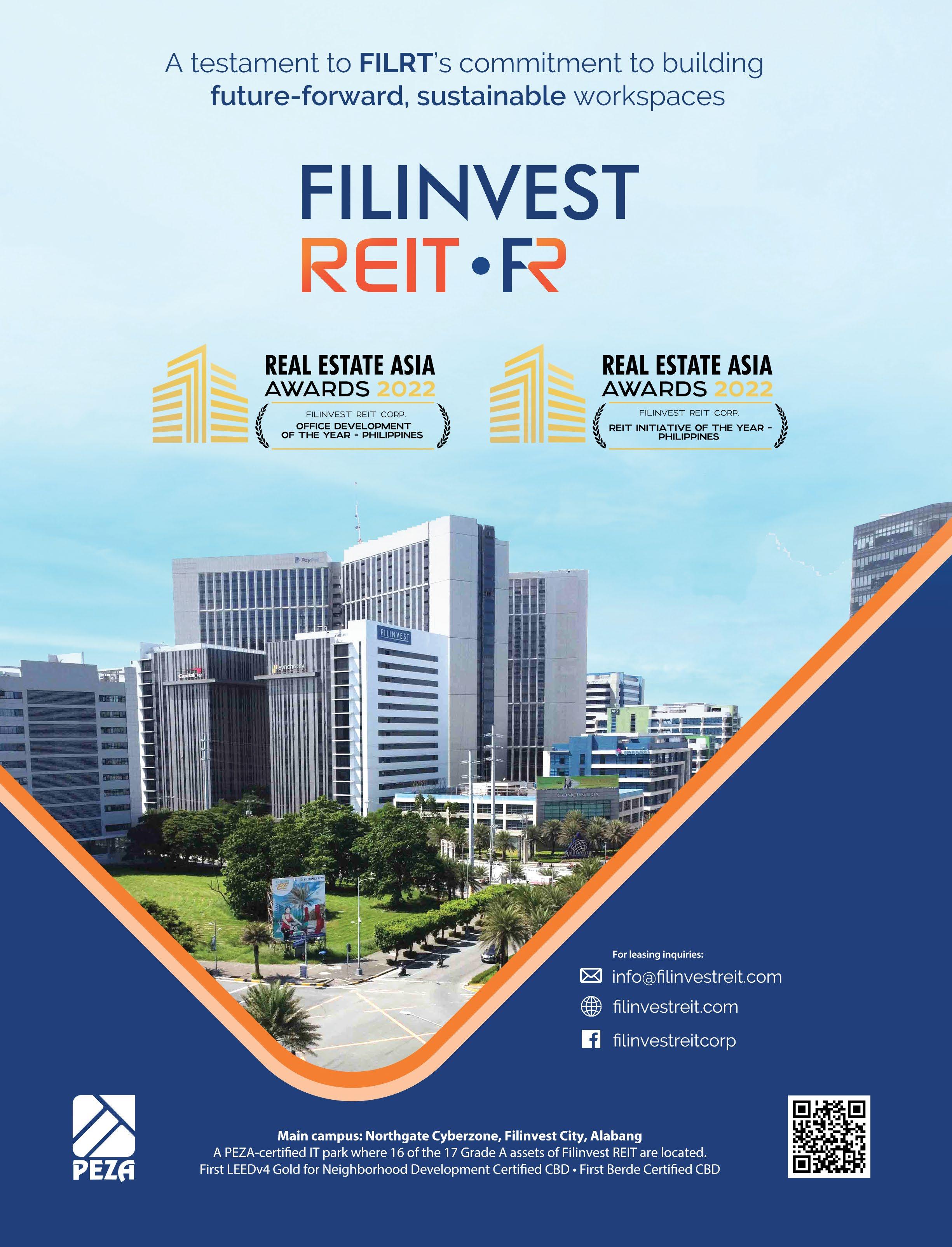
REAL EST ATE ASIA
Real Estate Asia is the industry portal serving Asia’s dynamic real estate industry. Each section carries a balance mix of articles which appeal to the C-level executives of large real estate developers, investors, brokers, and property services institutions in Asia.
Do reach out to us if you would like us to tell your story to our readers via print and online advertising or events.
PUBLISHER & EDITOR-IN-CHIEF Tim Charlton
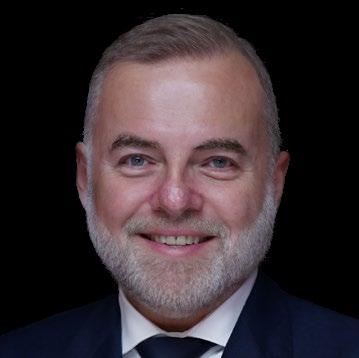
EDITORIAL MANAGER Tessa Distor
PRINT PRODUCTION EDITOR
Anna Mae Rodriguez
PRODUCTION TEAM Noreen Jazul
Consuelo Marquez
Vann Villegas
Frances Gagua
Ibnu Prabowo
Aulia Putri Pandamsari
Charmaine Tadalan
Roxanne Uy
FROM THE EDITOR
The real estate market continues to strike a balance between sustainability and business as SGX-listed firm CapitaLand Investment's (CLI) chief sustainability officer, Vinamra Srivastava outlines the firm's strategies on page 31 to meet their net-zero goals whilst keeping investor interests front and centre.
Directly on the heels of that is an important development from Singapore. The country's four prime sites under the 2H23 programme are stirring interest amongst the developers due to their proximity to mass transit stations and green spaces, marking a significant opportunity not seen in more than a decade. Find out more on page 14 about what these sites are.
GRAPHIC ARTISTS
COMMERCIAL TEAM
Simon Engracial
Janine Ballesteros
Jenelle Samantila
Cristina Mae Posadas
ADVERTISING Shairah Lambat shairah@charltonmediamail.com
AWARDS Julie Anne Nuñez awards@charltonmediamail.com
ADMINISTRATION Eucel Balala accounts@charltonmediamail.com

EDITORIAL editorial@realestateasia.com
SINGAPORE
101 Cecil St., #17-09 Tong Eng Building, Singapore 069533 +65 3158 1386
HONG KONG Room 1006, 10th Floor, 299 QRC, 287-299 Queen’s Road Central, Sheung Wan, Hong Kong +852 3972 7166
MIDDLE EAST
FDRK4467,Compass Building,Al Shohada Road, AL Hamra Industrial Zone-FZ,Ras Al Khaimah, United Arab Emirates www.charltonmedia.com
PRINTING Times Printers Private Limited 18 Tuas Avenue 5, Singapore 639342 www.timesprinters.com
a member of Times Publishing Limited
Can we help?
Editorial Enquiries: If you have a story idea or press release, please email our news editor at editorial@realestateasia.com. To send a personal message to the editor, include the word “Tim” in the subject line.

Media Partnerships: Please email editorial@realestateasia.com with “Partnership” in the subject line.
Subscriptions email: subscriptions@charltonmedia.com
Real Estate Asia is published by Charlton Media Group. All editorial is copyright and may not be reproduced without consent. Contributions are invited but copies of all work should be kept as Real Estate Asia can accept no responsibility for loss. We will however take the gains.
Sold on newstands in Singapore, Malaysia, Hong Kong, London, and New York. Also out in realestateasia.com with online readership of 215,000 monthly unique visitors*.
*Source: Google
Meanwhile, Indonesia’s residential sector demonstrates resilience in spite of economic setbacks with the landed houses remaining strong in demand. For an in-depth look at what's driving this trend, refer to the coverage on page 25.
Pages 32 to 39 are dedicated to recognising the Asian financial hub's most notable real estate agents under 40. Despite market challenges, these professionals have closed high-value deals, representing clients from industries as diverse as finance and technology.
Read on and enjoy!
Tim Charlton
Real Estate Asia is a proud media partner and host of the following events and expos:
REAL ESTATE ASIA 1
Analytics **If you’re reading the small print you may be missing the big picture
About Us
18 Savills pioneers next-level 3D interactive property tours in Hong Kong

24 BPO sector seeks hub in Philippines’ provincial markets over labour costs
26 Retail real estate rebounds as spending shifts from online to offline
SPACE
19 Trendsetting students drive SWID’s Metaverse apartments’ occupancies
20 Sun Hung Kai Properties’ hybrid aparthotel caters to next-gen tenant needs
21 IOI CBT redefines cooling system to reduce aircon dependence
22 Competing construction firms unite to meet industry’s towering demand

23 How to find the right flex space for an organisation
27 HK must review valuations for successful land sales
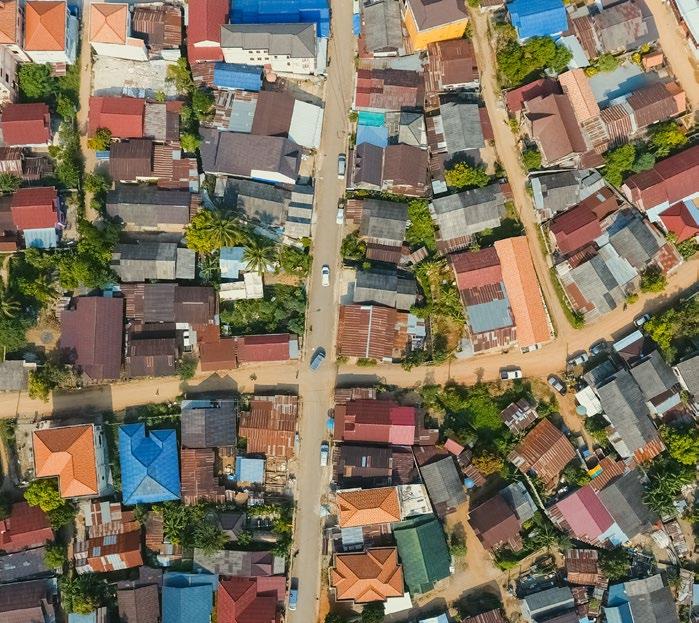
28 How Metland Indonesia deals with weaker residential purchasing power
29 Ohmyhome eyes sector and market expansion post-Nasdaq debut
30 Addressing the elderly housing gap could ease HK's broader residential crisis

2 REAL ESTATE ASIA SINGAPORE BUSINESS REVIEW | MARCH 2018 Published annually by Charlton Media Group 101 Cecil St. #17-09 Tong Eng Building Singapore 069533 For the latest real estate news from Asia visit the website realestateasia.com CONTENTS FIRST ANALYSIS INDUSTRY INSIGHT SECTOR REPORT
REPORT INTERVIEW
WATCH PROPERTY WATCH
REPORT 40 EVENT TOP INDUSTRY PLAYERS RECOGNISED AT 2023 REAL ESTATE ASIA AWARDS INTERVIEW HOW CAPITALAND INVESTMENT RETAINS STAKEHOLDERS’ TRUST 31
07
changing views on
08
hotel investment
51% to
COUNTRY
CONCEPT
PROPERTY
06 SG vs HK: Where should MNCs establish their APAC headquarters?
How APAC CBDs can thrive amidst
office use
APAC
plummets
$3.1b
WATCH
25 SECTOR REPORT LANDED HOUSES OFFER A SOLUTION TO HOUSING BACKLOGS
10 Co-living startup recreates a ‘home away from home’ experience with STAS 12 ‘Wall-less’ office opens up collaboration amongst AnyMind’s creatives
14 Developers gear up for prime sites in Singapore's H2 2023 Government Land Sales 16 Excess supply of offices depleting in Asia-Pacific
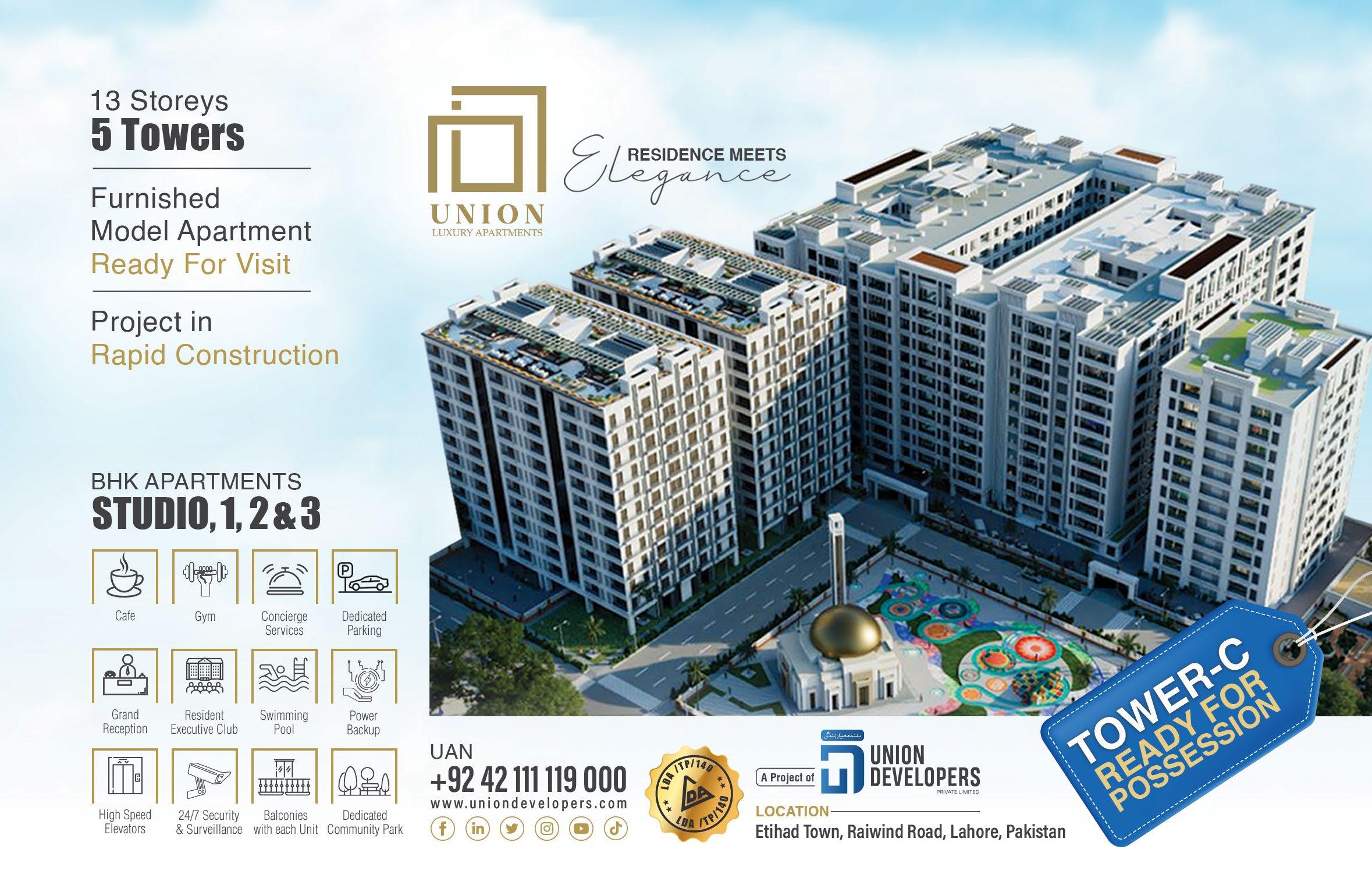
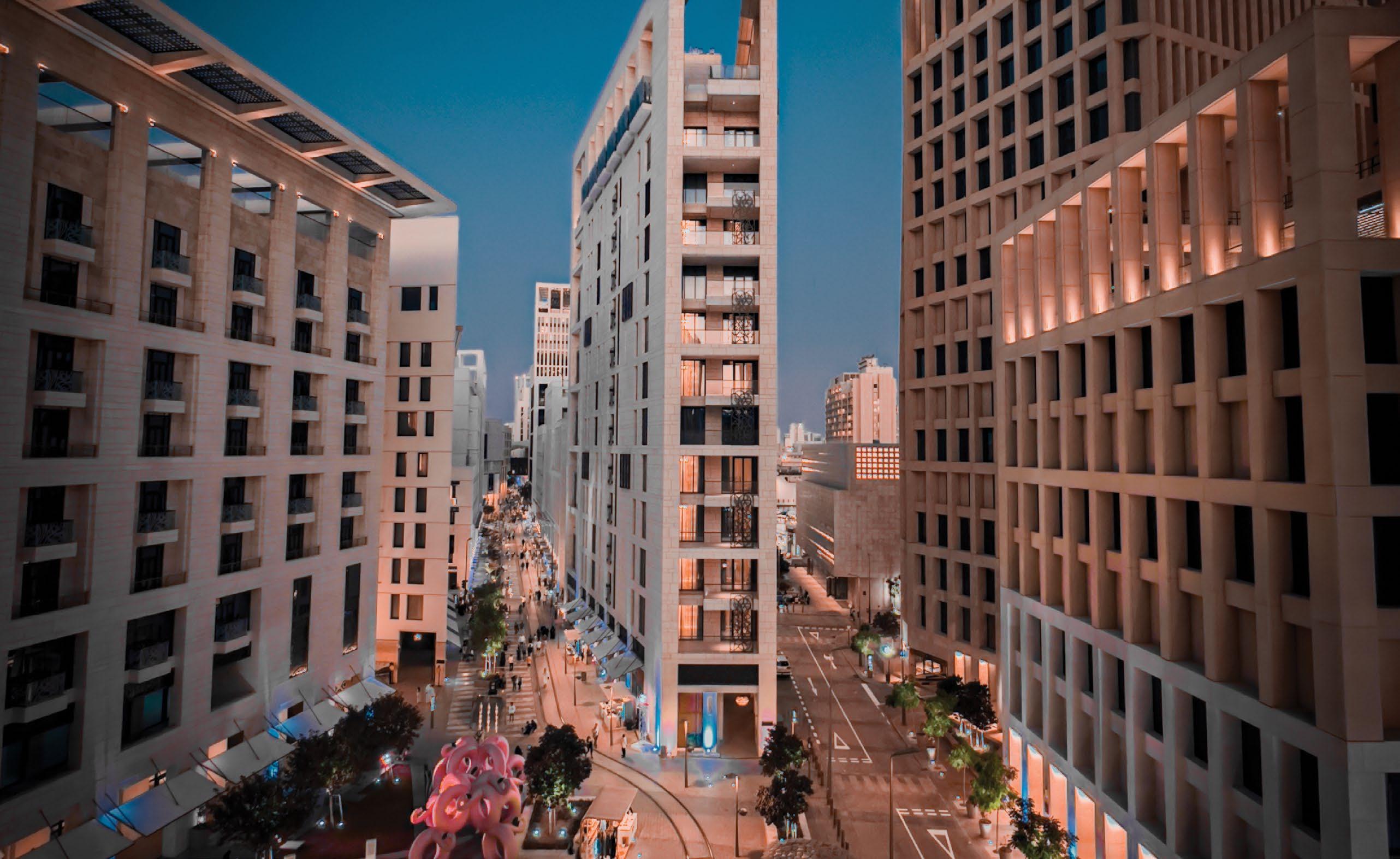






Daily news from Real Estate

Corporate occupiers grapple to fit out their offices to maximise space and create a high-performing hybrid workplace as the remote and in-office work setup becomes permanent, Cushman & Wakefield said. Employers continue to put employee experience at centre-stage in the way office is used whilst ensuring well-being of workers.
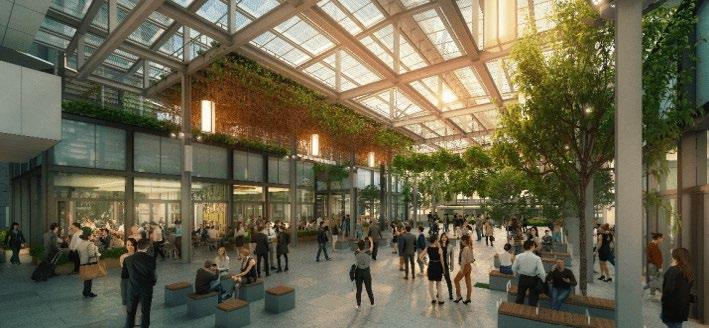

Work arrangements continuously evolving give rise to the need for flexible spaces. This challenges businesses to determine how much of the traditional office should developers retain or forego in designing a futureproof workspace. GuocoLand struck this balance in their new mixed-used development, Guoco Midtown.
As the capital city of Indonesia, Jakarta is expected to become a Transit-Oriented Development (TOD) model for other regions in the archipelagic country. With this, the government launched the Land Value Capture (LVC) scheme to attract all stakeholders, especially private developers.
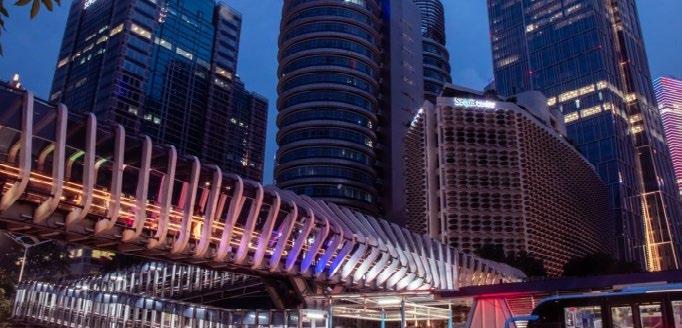
Hanoi city centre retail rents to grow 4% this year

In a JLL report, the decentralisation trend in Hanoi’s retail market will be demonstrated with two new completions in the City Fringe, including the Lotte Mall Tay Ho with 80,000 sqm (NLA) in 3Q23 and The LINC Park City in Ha Dong with 10,600 sqm (NLA) in 4Q23, which will serve residents in the new neighbouring urban areas.
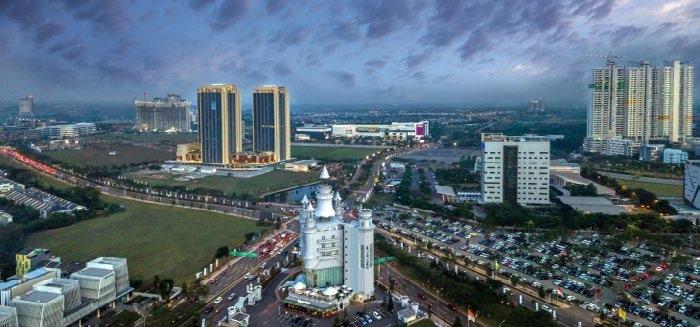
As development moves further away from the Jakarta city centre due to the dwindling availability of land, property developers realise that they must continue to provide supporting facilities for suburban dwellings. This effort is made to attract customers even though the products they develop are far from the city centre.
Adopting flexible working conditions is notably slower in the Asia Pacific compared to other regions across the globe. “Whether you were ready for it or not, the pandemic has changed the world, more so the corporate real estate, and office culture. Paul Seow, Associate Director, Asia Pacific Total Workplace said.
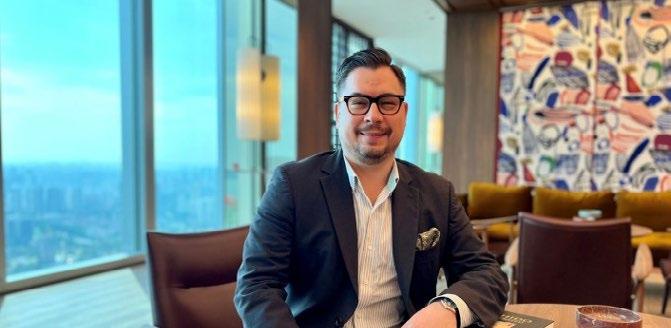 No ‘one size fits all’ in hybrid workspaces
Tradition meets modernity in futureproofing hybrid offices
Sinar Mas Land focuses the spotlight on BSD City
What is LVC scheme and why is it key to IND urban development problems
Closing gaps between C-suites and workers with flexible workspaces
COMMERCIAL OFFICE
COMMERCIAL RETAIL
PROPERTY WATCH
PROPERTY WATCH
RESIDENTIAL
No ‘one size fits all’ in hybrid workspaces
Tradition meets modernity in futureproofing hybrid offices
Sinar Mas Land focuses the spotlight on BSD City
What is LVC scheme and why is it key to IND urban development problems
Closing gaps between C-suites and workers with flexible workspaces
COMMERCIAL OFFICE
COMMERCIAL RETAIL
PROPERTY WATCH
PROPERTY WATCH
RESIDENTIAL
News
COMMERCIAL OFFICE
from realestateasia.com
MOST READ
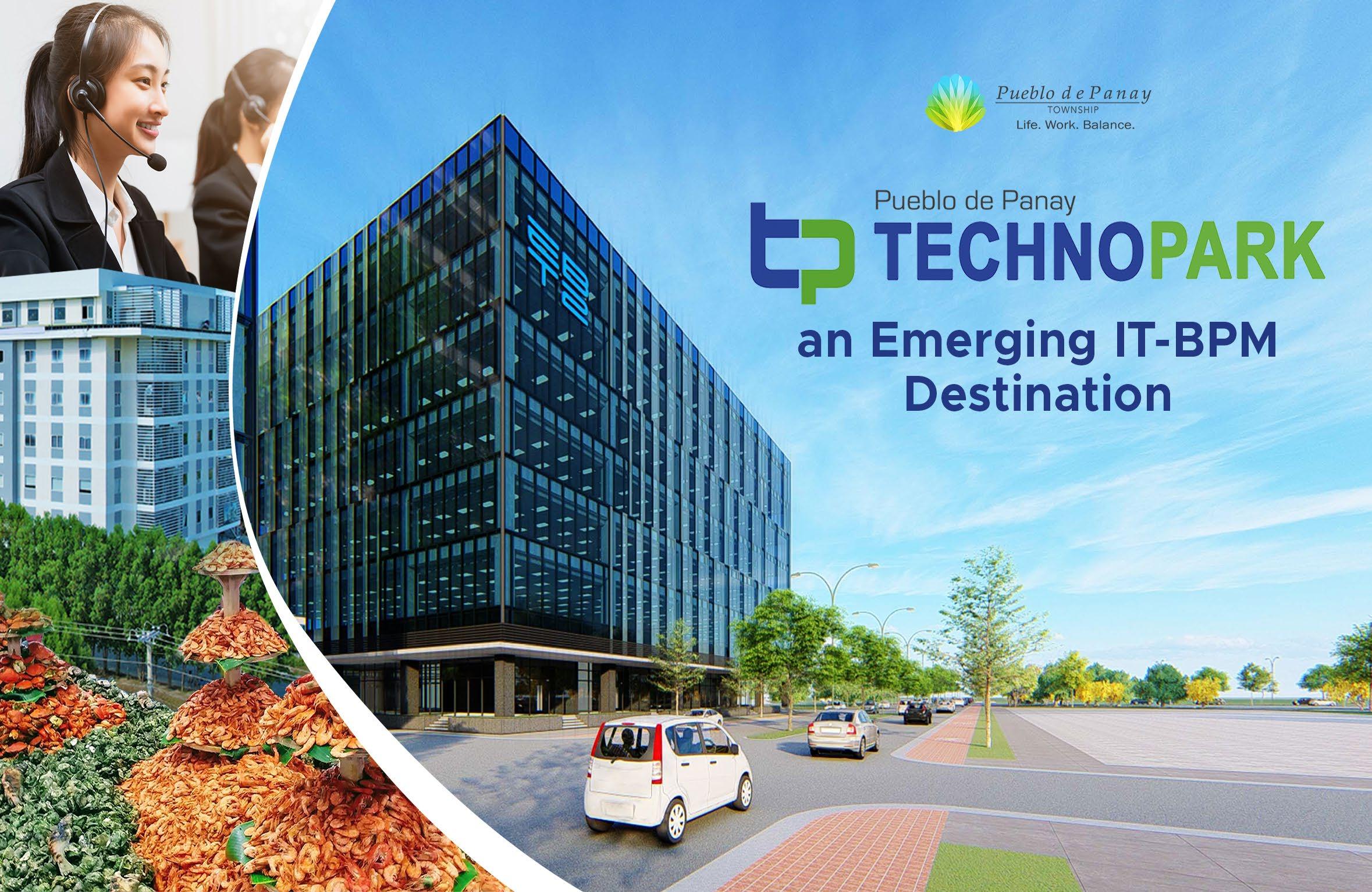
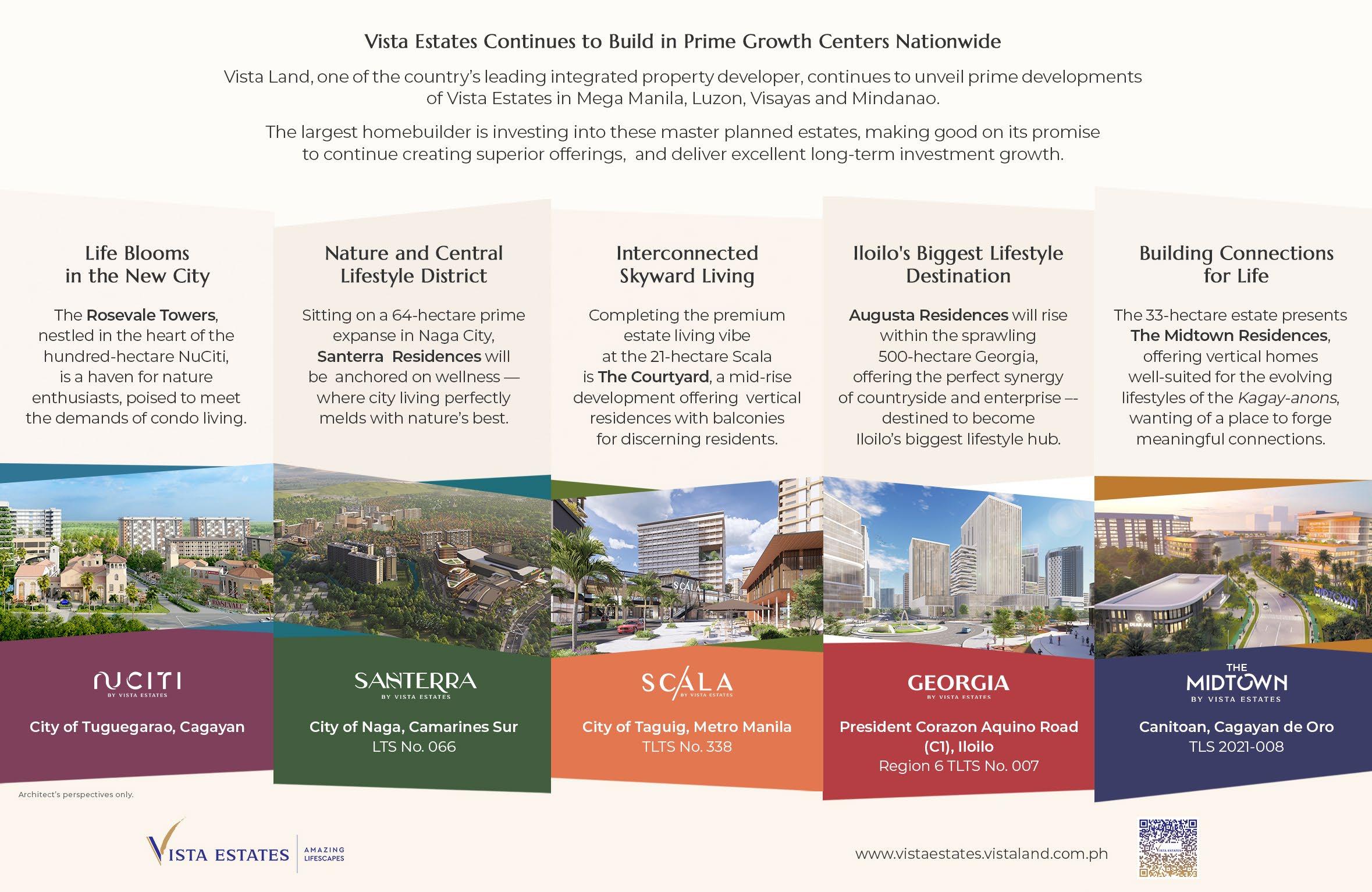
choosing an office location in the latter market. Between 2023-2026, Hong Kong SAR will see the addition of 10% of its existing stock, whilst Singapore will welcome the completion of 7% of its existing office supply.
On areas of talent availability and attraction, office rents and prices, and influence on Asia Pacific, CBRE said both markers are tied.
“Hong Kong SAR and Singapore play complementary roles. Hong Kong SAR is more convenient for running China and North Asia operations, whilst Singapore is more suited to Southeast Asia and India,” CBRE said.
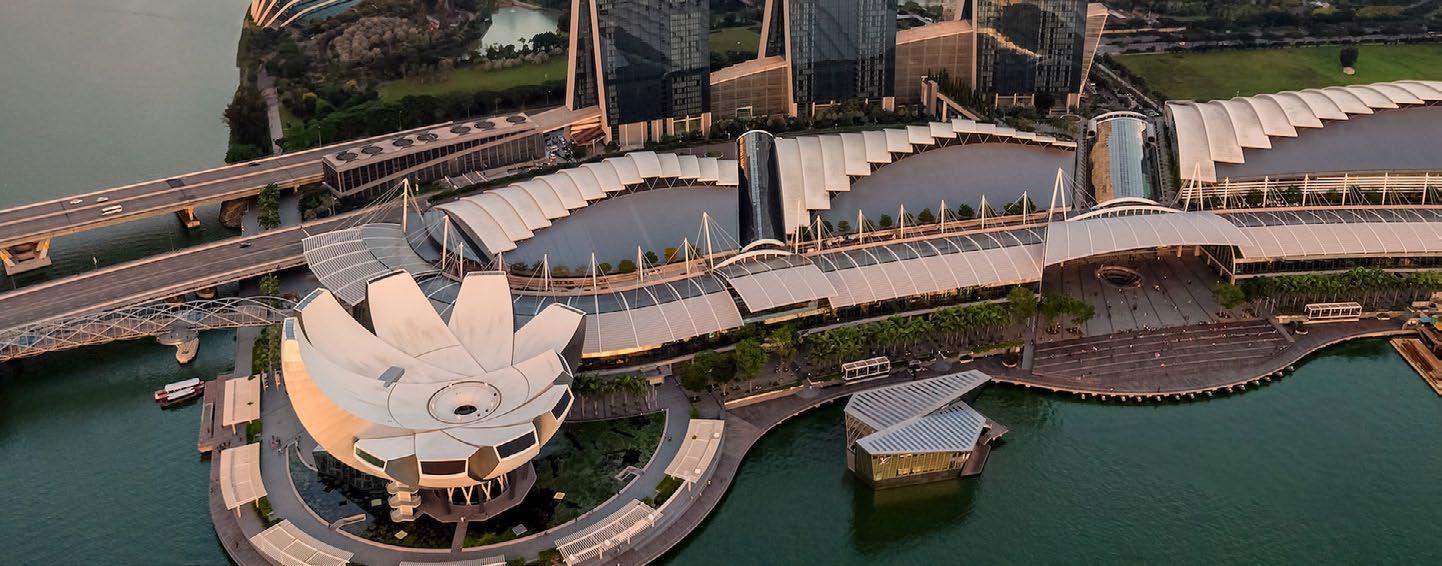
In terms of financial talent, CBRE said Hong Kong has a wider pool, whilst Singapore has more science and technology workers.
Meanwhile, CBRE said the pricing and rental gap between the two cities’ CBD offices is also narrowing.
Whilst Singapore’s CBD is cheaper, Hong Kong offers more cost-effective decentralised nodes.
SG
vs HK:
Where should MNCs establish their APAC headquarters?
Hong Kong SAR and Singapore are both attractive locations for multinational corporations seeking to establish a headquarters in the AsiaPacific (APAC) region, but when looking at several factors, such as rental rates, technology, talent, and transportation, one market is better than the other.
According to a report by CBRE, Singapore won over Hong Kong in terms of the the technology industry scale.
“Singapore invests more in research and development (R&D) and leads in high-tech manufacturing,” Marcos Chan, head of research at CBRE Hong Kong, said.
The real estate expert, however, underscored that Hong Kong is catching up by deepening collaboration with Shenzhen and the Greater Bay Area.
In terms of ESG and green building initiatives, Singapore also has the upper hand.
“Singapore’s green building adoption rate is much higher than that in Hong Kong SAR,” according to Chan.
For Hong Kong to reduce its carbon intensity, CBRE said the city can leverage the mainland’s new energy industry growth.

Meanwhile, office availability and the scale of the financial industry are areas where Hong Kong wins over Singapore.
“Hong Kong SAR is the leader in terms
of fundraising, RMB deposits, and wealth management,” Chan said.
The expert, however, noted that Singapore’s forex business is bigger than Hong Kong, but both markets are seeing growth in private wealth management.
Chan added that Hong Kong is “wellpositioned to become the largest private wealth management centre.”
“Its proximity and strong ties with mainland China will make it the leading global offshore RMB business hub. The financial services sector will continue to be one of Hong Kong’s key economic pillars. The return of mainland Chinese firms will encourage more IPOs and related financial activities. The sector currently plays an important role in the office market, accounting for 25% of all new leasing activities in the past 15 months,” Chan commented.
On office vacancy, CBRE said Hong Kong SAR “currently stands at the highest on record with substantial new supply in the pipeline over the next four years.”
Total office stock in Singapore is only 73% of that in Hong Kong SAR, giving corporate occupiers more options and flexibility when
“Hong Kong SAR’s residential rents posted the largest decline in a decade in 2022, and those in Singapore have escalated sharply over the past three years, which could soon surpass those in Hong Kong SAR decentralised districts in Kowloon and New Territories,” CBRE said.
“With the enhanced transport connectivity within Hong Kong and in the Greater Bay Area under the ‘one-hour living circle’, and more affordable residential units than Singapore, Hong Kong is appealing to highcalibre talent from overseas markets. This is important for multinational companies when deciding on the locations of their headquarters in the region,” CBRE added.
On rents, CBRE said Hong Kong will remain weak in the medium term given that it is a tenants’ market, whilst Singapore has recovered since it is a landlords’ market.
“Despite a steady recovery in leasing momentum, Hong Kong SAR office rents are still below pre-pandemic levels and are expected to decline further before 2024,” according to CBRE.
Data from CBRE showed that as of Q4 2022, Hong Kong SAR Central’s Grade A rents remain the highest globally, about 40% higher than those in Singapore’s core CBD; however, Hong Kong SAR offers more affordable office space in decentralised areas such as Hong Kong East and Kowloon East, where Grade A rents are up to 75% lower than in the Central CBD and below those in Singapore’s decentralised locations.
6 REAL ESTATE ASIA FIRST
HK SAR and SG are both attractive locations for multinational corporations (Photo by Hu Chen and Manson Yim from Unsplash)
HK SAR and SG play complementary roles. HK SAR is more convenient for running China and North Asia operations, whilst SG is more suited to SEA and India
COMMERCIAL
Anthony Couse, chief executive officer, JLL Asia Pacific.
To take advantage of long-term real-estate opportunities, CBDs in Asia Pacific will need a balanced mix of uses, with improved amenities and investment in sustainable design. According to JLL analysis, refurbishing existing buildings is more sustainable than developing new buildings, as renovations can come with carbon impacts of less than 500 kg of CO2 per square metre – well below that of new developments, which can be up to three times greater.
How APAC CBDs can thrive amidst changing views on office use

COMMERCIAL OFFICE
Asia Pacific’s central business districts (CBDs) are on the brink of transformation. With a shift in perceptions of traditional office spaces, these hubs need to evolve beyond their original purpose and reinvent as multi-purpose destinations that cater to shifting demands for office space, greater variables in commuting and travel patterns, and a desire for “experiencebased” spaces. This is according to new research on the future of CBDs by global real estate advisor JLL.
Return to office rates are over 70% in Asia Pacific – higher than many parts of Europe and the US – with re-entry rates at pre-pandemic levels in Shanghai, Beijing, and Seoul, says
JLL. However, a longer-than-expected return to pre-pandemic levels of transit usage and footfall will push CBDs and supporting real estate and infrastructure to go beyond acting primarily as places of work.
“How people perceive and use CBDs has shifted dramatically in the past three years due to the pandemic. To be future proof, cities in Asia Pacific will need to find ways to reimagine the traditional core area to attract visitors, businesses, and investment. For the future CBD to thrive as a mixeduse destination, investors and occupiers will need data-based advice and insights to collaborate strategically and make smart decisions,” said
CBDs in Asia Pacific will need a balanced mix of uses, with improved amenities and investment in sustainable design (Photo by Polina Zimmerman from Pexels) cautious. Yet, APAC fundamentals remain robust, a stark contrast from its peers.

Investors and occupiers will need databased advice and insights to collaborate strategically and make smart decisions
According to the JLL report, reinventing CBDs requires partnerships between the private sector and governments. Investors can employ a strategic, long-term mindset toward repositioning and diversifying their portfolios to cater to shifting preferences and reduce exposure to external shocks. Developers should proactively consider locations based on potential for future growth and proximity to demand, the quality and age of buildings, and ability to meet regulatory requirements regarding energy efficiency and sustainability. Finally, governments must anticipate demand changes and provide greater flexibility to developers and investors, including through expanding tax credits to offset the cost of conversion and streamlining the planning process to reduce the lead time for delivery of new products.
THE CHARTIST: THESE ARE THE BIG-TICKET OFFICE PROPERTY DEALS TO WATCH OUT FOR IN APAC
Adding more to the economic woes, the Asia Pacific office investment market experienced a historic decline at US$12.7b in Q1, according to a recent JLL report, sparking cautious optimism for upcoming deals and value recalibration in key markets.
Large pockets of the region reported fewer office trades were hindered by interest rate headwinds and asset repricing.
Here’s more from JLL: A lack of transactions was observed, particularly in Singapore and Hong Kong. Regionally, big-ticket deals (above US$300m) nearly evaporated with asset managers having more difficulty securing funds.
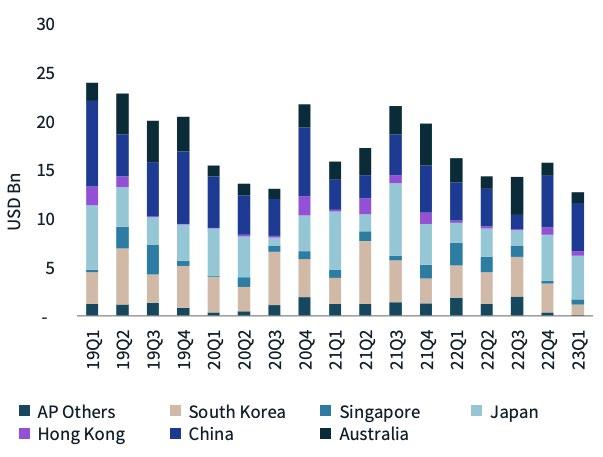
Bearish outlooks towards the US and EMEA offices started to permeate the region with global investors active in Asia turning more
The regional office market will likely see clarity around recalibration in asset values in the coming months. Highly anticipated core office deals are expected to close soon, setting a benchmark for sellers and buyers.
In Australia, the large-ticket transactions -- 50% stake in Salesforce Tower, 60 Margaret St, and 44 Market St are nearing finalisation.
In Korea, the soon-to-close prime office towers including Concordian and Alphadom Tower are expected to rejuvenate investor confidence, spurring more office sales campaigns.
Then, in Japan, the investors refocused on Grade B offices with Grade A likely to underperform amidst a strong supply cycle and weak leasing market.
REAL ESTATE ASIA 7 FIRST
Asia Pacific office investment volume from Q1 2019 to Q1 2023
Source: JLL estimates as of Mar 23
Anthony Couse
WESTERN INVESTORS LEAVE CHINA FOR JAPAN, INDIA
An unexpected shift has been seen in the Asia Pacific as India emerged as a favoured destination for Western investors, together with Japan, collectively capturing a substantial 60% share of capital inflows in 2022. In contrast, Western capital in mainland China experienced a significant downturn, reaching a 10-year low of only US$500m.

CBRE Report Figures revealed that Japan remains the top market in the Asia Pacific as buyers from the region are drawn to its positive carry, seeking markets that offer favourable returns. Likewise, India saw a remarkable investment increase of 80% yearon-year (YoY), reaching a total of US$2.8b. India was the only market in the region to gain as much capital inflows during the same period.
Surge in India's investment
The report attributes the impressive returns to the active participation of Western investors in India. Notably, the Blackstone-sponsored Nexus Select Trust acquired the Select Citywalk Mall in Delhi for US$544m. This asset is set to be included in Nexus Select Trust’s inaugural retail REIT IPO in India in May, aiming to raise US$391m (INR32b).
In their pursuit of accessing the Indian market, several investors formed joint ventures with local players in 2022. Notable examples include CPPIB partnering with Tata Realty and Brookfield, which acquired a 51% stake in Bharti Enterprises’ commercial properties.
In contrast, Western investment in mainland China experienced a sharp decline. Despite the lifting of anti-pandemic restrictions in January 2023, experts anticipate a gradual return of Western capital to mainland China. But the elevated geopolitical tension in the region, coupled with a weakened market, may still influence investor’s confidence.
APAC hotel investment plummets 51% to $3.1b
The hospitality sector in the Asia Pacific has experienced a sharp decline in the first half of 2023. Hotel investment volumes decreased by 51% year-on-year. This downturn was greatly influenced by the escalating cost of debt.
Nihat Ercan, chief executive officer of JLL Hotels & Hospitality Group in Asia Pacific explains, "We have observed the impact of a continued disconnect between robust tourism demand and macroeconomic and geopolitical challenges in the first half of 2023, resulting in a gap between sellers’ pricing expectations and buyers’ access to capital."

A closer look at JLL's data and analysis reveals that investments decreased to U$3.13b, a sharp contrast from the US$6.41b recorded during the same period in 2022.
Activity during the first half was most robust in Japan (US$1.54b) and Australia/New Zealand (US$820m), which grew by 56% and 189% year-onyear (YoY), respectively.
Gateway markets such as Singapore (US$30m) dropped by 95% YoY as the number of transactions
declined; however, with the recent sale of PARKROYAL on Kitchener Road for US$388m, the outlook for the second half of the year will be stronger. China (US$300m) also saw activity moderate by 76% YoY. Despite strong performance metrics, activity in the resort sector was muted as assets remained tightly held.
JLL's Ercan, however, has noted, "trading performance of the sector remains strong and other fundamentals including tourism arrivals and high occupancy rates provide us with full confidence that the current investment environment is externally-based, rather than industry-specific.”
Factors including the recent reopening of China in January 2023, which was earlier than expected, fuelled existing travel demand strength. As a result, there has been a considerable improvement in trading performance, particularly in the upscale and luxury segments, supported by an increase in average daily rates (ADR) across the region’s hotels.
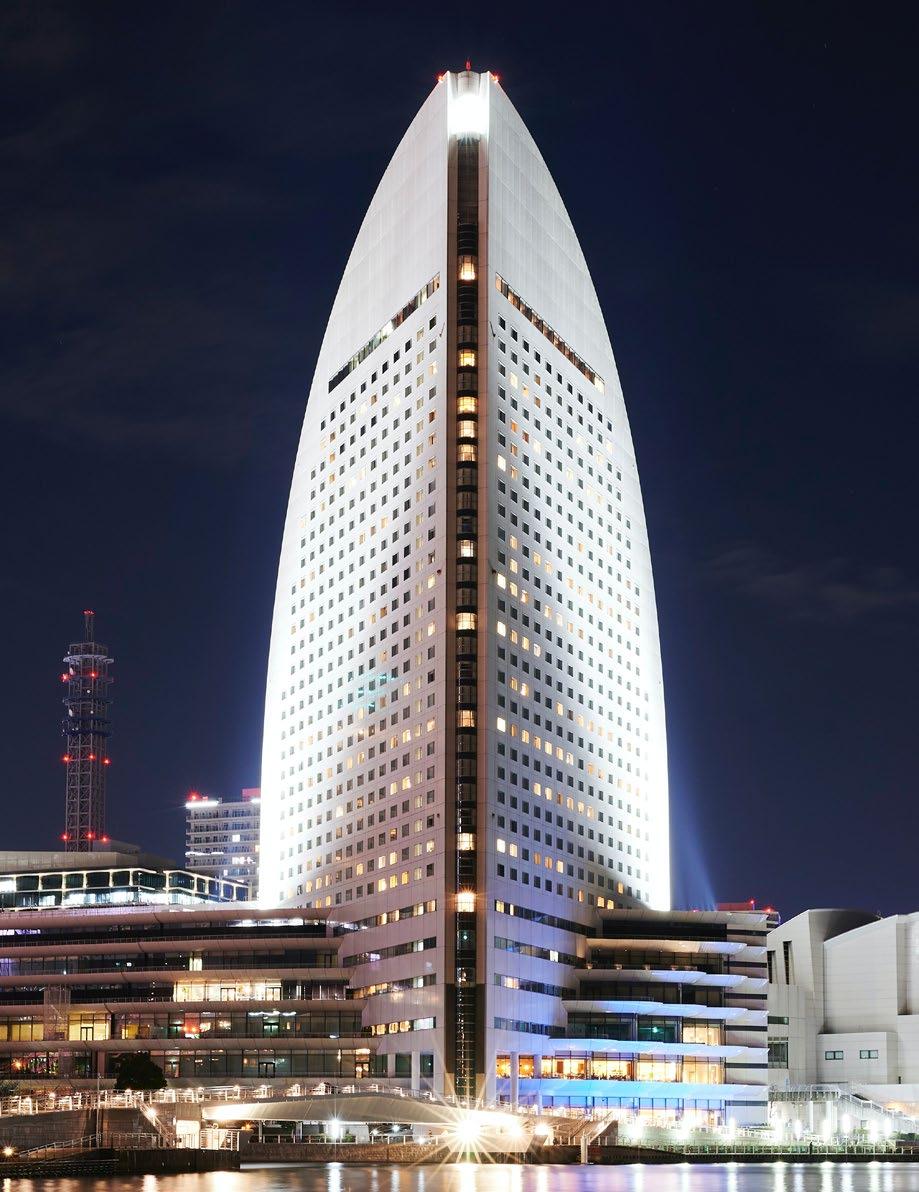
Rise in tourism
According to JLL analysis, the rise in tourism arrivals since January 2022, which was predominantly driven by leisure demand, led to continued growth in performance amongst hotels in the region, with occupancy rates leading the recovery as more tourists return. Despite facing economic, health, and geopolitical challenges, the United Nations World Travel Organization (UNWTO) foresees the recovery in travel to continue throughout 2023. When viewing factors including the macroeconomic environment and the project interest cycle, coupled with broad investor interest in strongperforming assets, JLL has revised its full year 2023 forecast to US$8.7b, down 24% from its initial 2023 estimate.
We expect to see more specific opportunities emerge in some destinations across Asia Pacific
“Approaching 2024, we expect to see more specific opportunities emerge in some destinations across Asia Pacific, where prices have been adjusted downwards, enabling interested parties to reconsider. Investors remain very committed to the Asia Pacific hospitality sector and we see ongoing appetite amongst buyers to invest in key markets and strategic assets, with the ability to deploy capital,” says Ercan.
The long-term appeal of Asia Pacific’s hotels sector has recently been reinforced by the completion of several recent marquee transactions.
8 REAL ESTATE ASIA FIRST
Japan accounted for over half of the investments during the first half (Photo by Han Sen from Pexels)
COMMERCIAL HOTEL
COMMERCIAL
Nihat Ercan



sarai.almouj.com your ocean paradise
Co-living startup recreates a ‘home away from home’ experience with STAS
Bespoke Habitat offers short-term stays in Singapore that feel just like home.
Amidst the surging demand for rentals and ongoing construction projects in Singapore, many families are confronted with a housing dilemma. Often, those who have committed to property purchases face unexpected construction delays, whilst others, deterred by high prices, opt for rentals. The result? A growing need for short-term accommodations.
This pushed co-living startup Bespoke Habitat to transform eight vacant units in a building at 64C Telok Kurau into affordable Short-Term Accommodation Services (STAS) in four months.
Bespoke Habitat Co-founder, Ernee Ong said they also serve companies that have employees that need service apartments for four months or six months. The startup is serving 1,500 tenants from multinational corporations.

“In the market, as of now, you don’t find a place that easily for a short-term stay. It is not catered for that. As such, this is where people are coming forward to us,” said Ong.
Aside from Singapore residents, STAS can also attract foreigners looking to live in Singapore temporarily, especially those who want their families to come along on their travels.
The units have a variety of two-to three-bedrooms and penthouses at over 1,000 square feet to a 1,600 squarefoot house. The price ranges from US$3,330 to US$5,550 (SG$4,500 to SG$7,500).
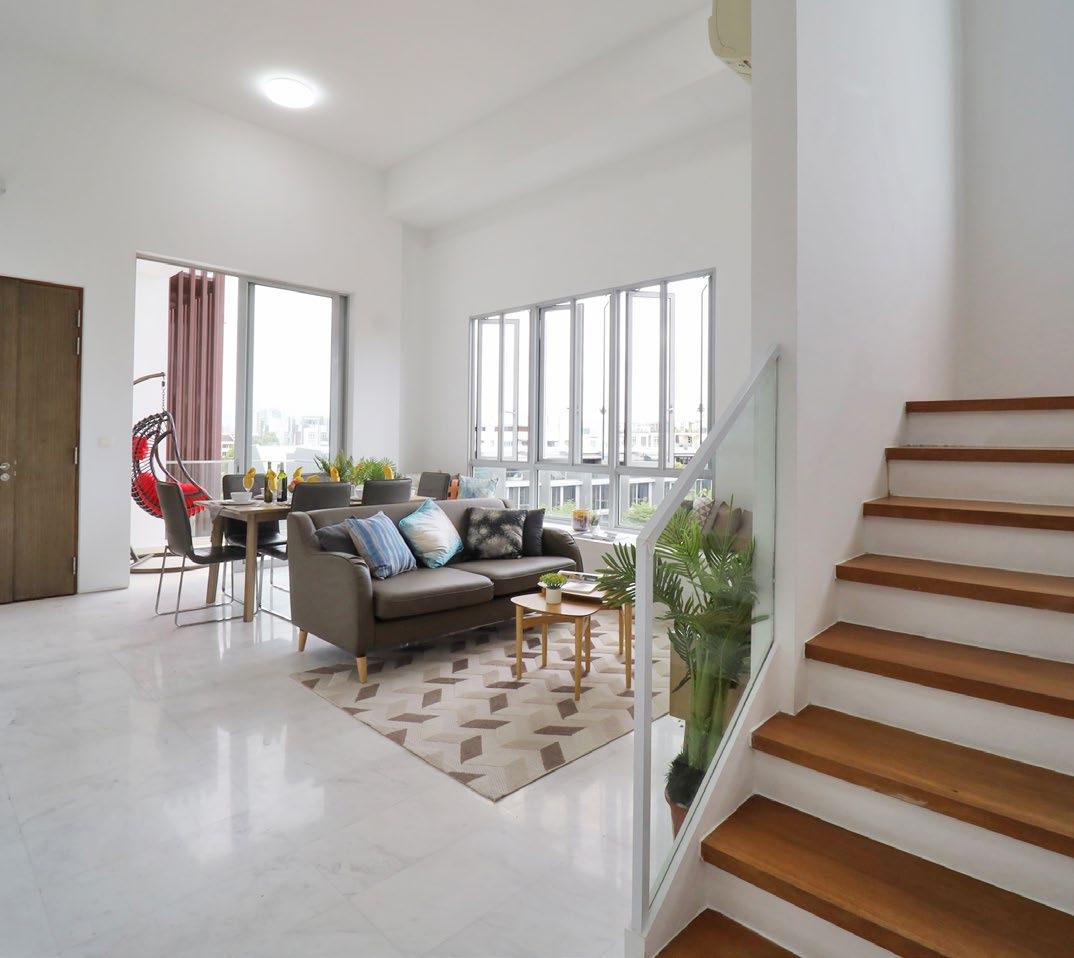
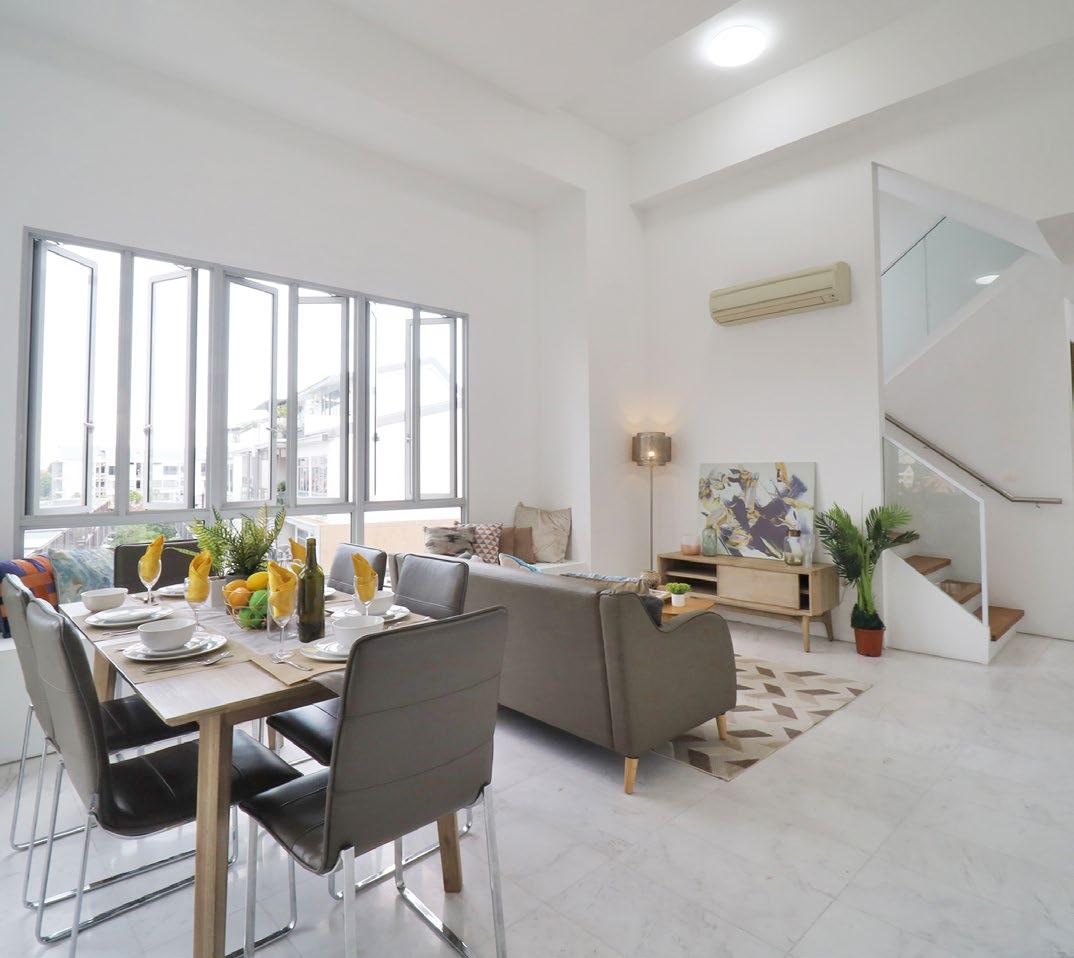
Customisable units
The STAS offers flexible options whether a family wants a bare unit or a fully furnished unit. The fully furnished ones have spacious living rooms, fully-equipped kitchens, and private bedrooms. It also has high-speed Wi-Fi and laundry
machines. Some units come with a study area, a terrace with a pool, and a dining area.
For families renting units and bringing only their luggage with them, Ong said Bespoke can offer beds, tables, chairs, and other furniture for rent. Other perks are the firm’s in-house cleaning services apps such as Bespoke CleanPro and BH Aircon Solutions. All tenants and owners can check on the last service or cleaning status of their respective units with the use of the app.
The apps also allow residents to schedule their cleaning services, request maintenance, and to access a diverse range of other services.
Future locations
The STAS kicked off at the eastern side of the city-state, where it has proximity to Marine Parade, shopping malls, and corporations in Changi Business Park. But Bespokse Habitat plans to bring the STAS to the western part of Singapore.
“A lot of our contacts are [western part of Singapore]. The majority of our co-living segment, I will say 65%, is in the western part of Singapore. We have fostered a lot of relationships in the community, whether it’s school clients or engagement,” said Ong.
Since the accommodation service is affordable, Ong noted that they make profit through charging a percentage of the management fee.
“We do on a win-win basis — when a performancebased model, for example, for these tests, based on X amount that we were able to contribute to the landlords, then we charge a percentage of management fee,” explained Ong.
10 REAL ESTATE ASIA
In the market, as of now, you don’t find a place that easily for a short-term stay
SPACE WATCH
Ernee Ong
Bespoke also provides a rented sofa to liven up and add comfort to the living room
SINGAPORE
Bespoke Habitat’s co-living space has a dining area for families’ culinary needs
SPACE WATCH
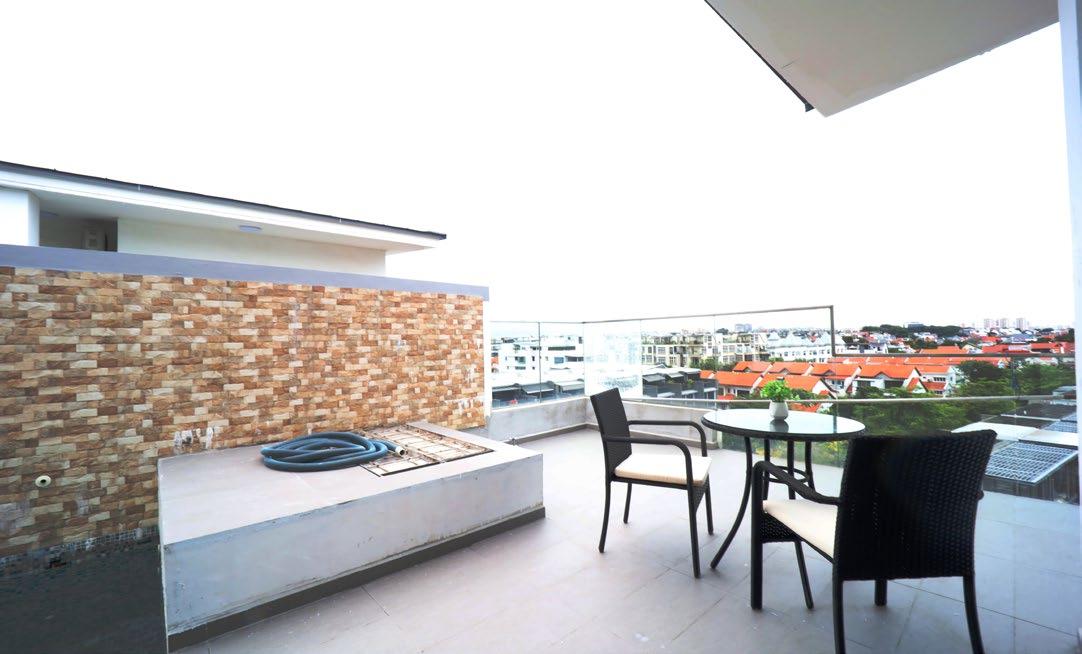
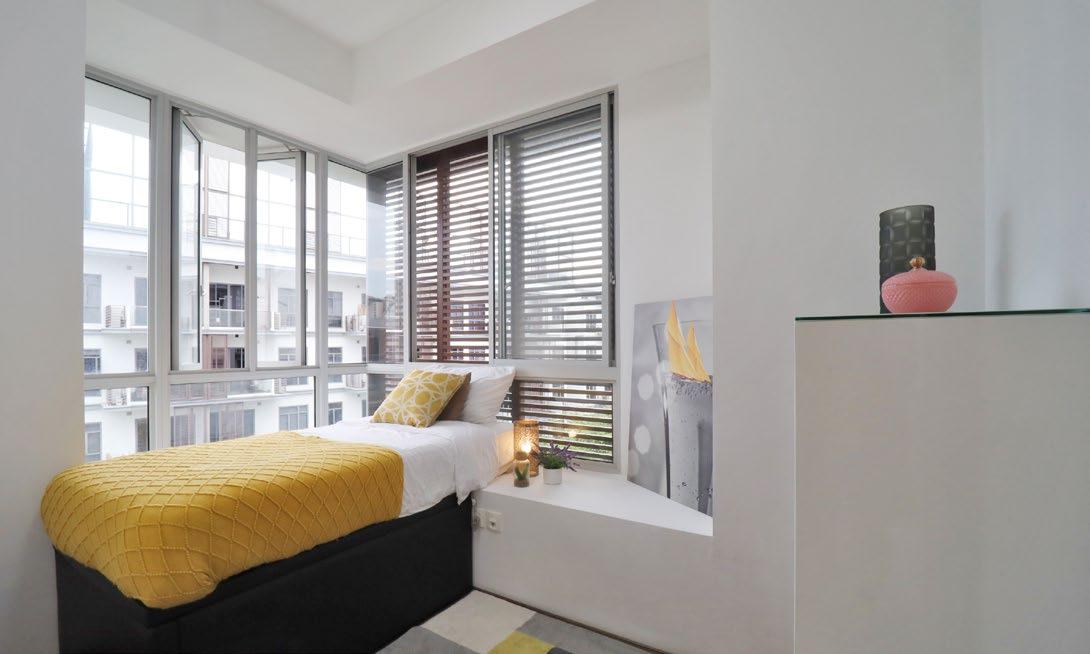


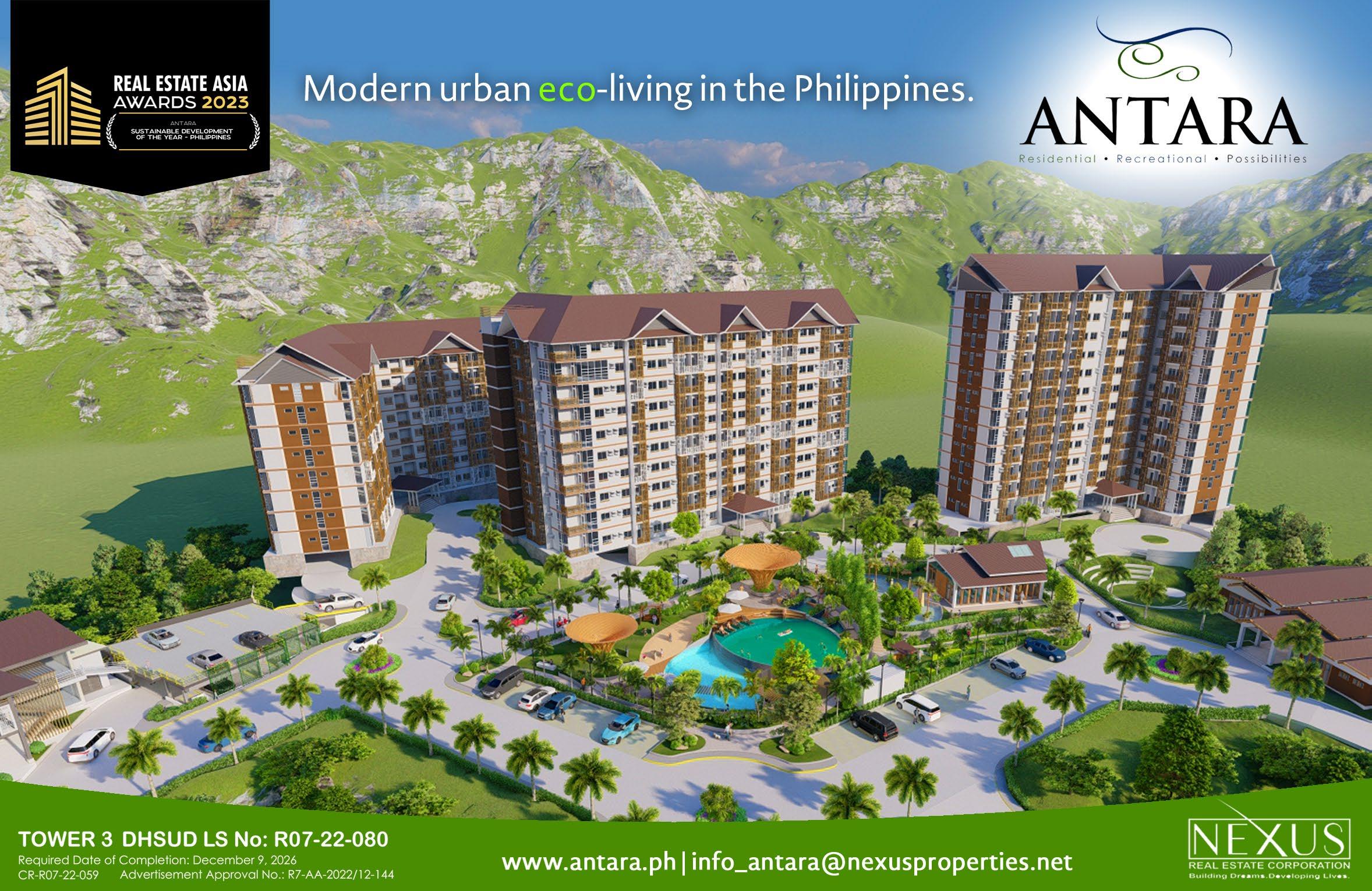 There is also muted-coloured rented bed and closets for married couples
The stylish furnishings evolve the study experience in the dedicated study room
Here is another design of bedroom space at STAS
Some units have pools and a terrace to add a leisure environment for families
There is also muted-coloured rented bed and closets for married couples
The stylish furnishings evolve the study experience in the dedicated study room
Here is another design of bedroom space at STAS
Some units have pools and a terrace to add a leisure environment for families
‘Wall-less’ office opens up collaboration amongst AnyMind’s creatives
The office encourages employees to collaborate, relax, and enjoy ‘happy hour’ and ‘mental space.’
When commerce tech company, AnyMind, was planning to transfer offices, the company’s main goal was to move to a “collaboration space” rather than a “co-working space,” which is why its new headquarters in Kwun Tong was fit out to have no walls between departments.
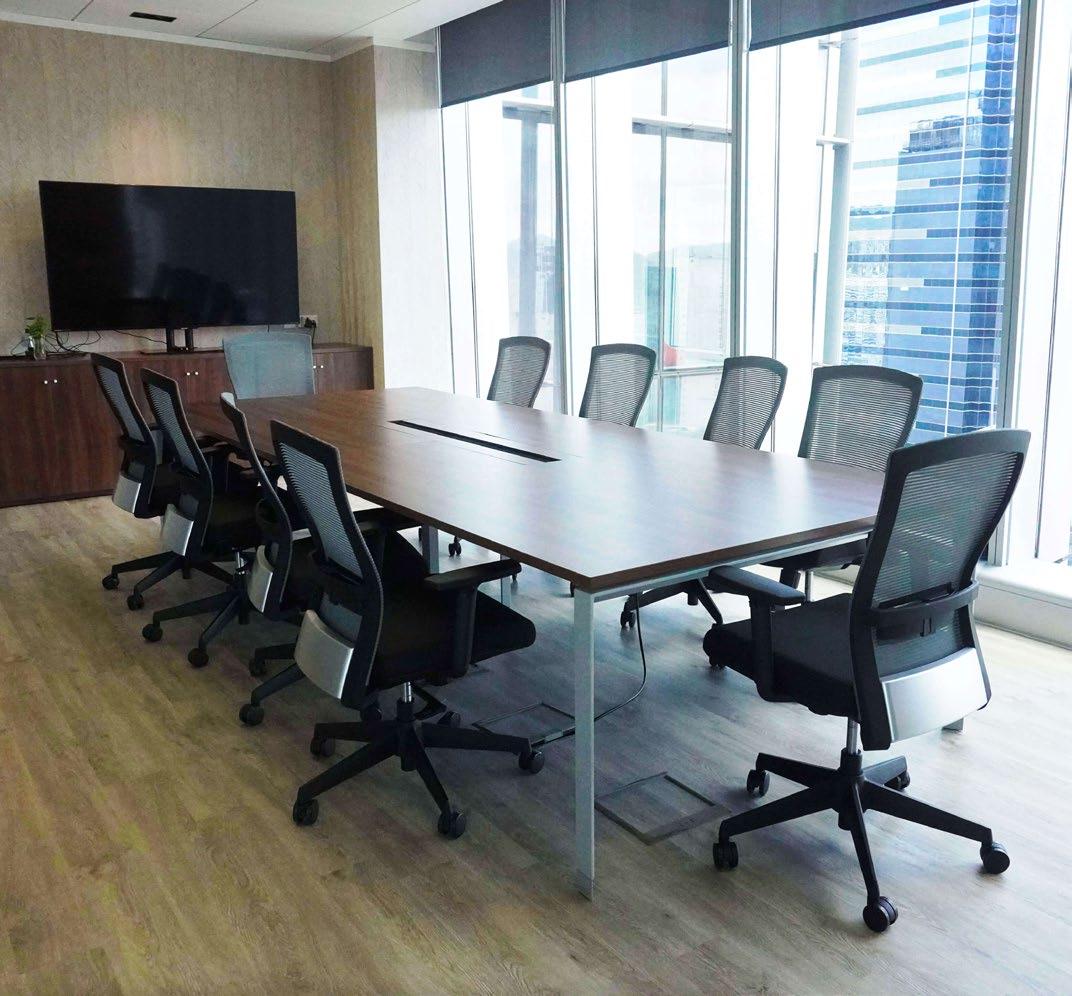
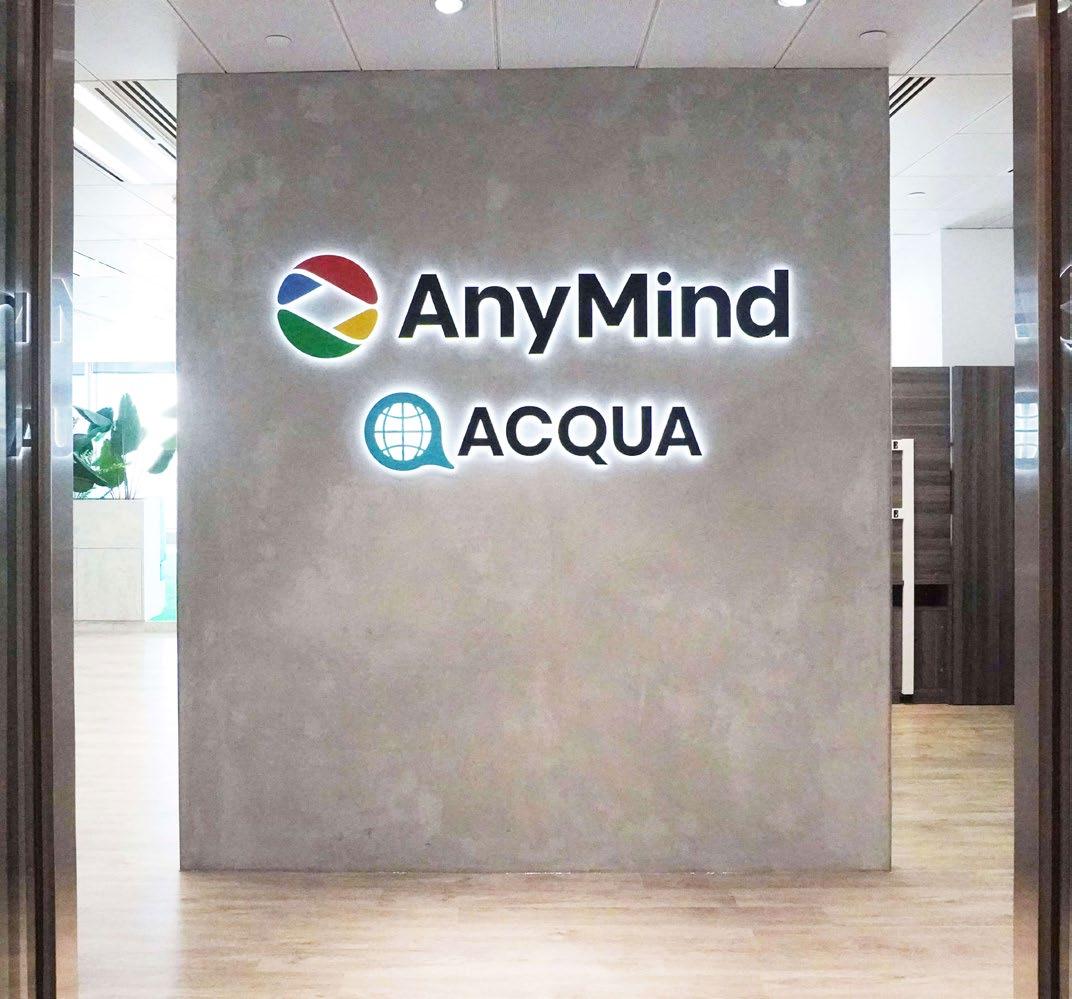
“Everything is kind of open. We particularly picked this office because there are just full height windows all around, there are no walls,” AnyMind Managing Director for Greater China Ben Chien told Real Estate Asia.

“Our type of business requires a lot more collaboration, less room, [and] less privacy on purpose. We don’t need as many private areas. We designed it [in a way] that everyone can sort of hear what each other is doing; [that’s] the basis for collaboration. If we don’t know what other people are doing, it’s kind of hard to collaborate,” Chien explained.
Since floor-to-ceiling windows adorn AnyMind’s office – even its conference room –employees not only get good lighting but also picturesque city views, particularly of Victoria Harbour.
Apart from being “wall-less,” AnyMind’s headquarters was designed to offer employees a “relaxed environment.”
Amongst spaces in the office where employees can relax whilst doing their job or simply take a break in the “collaboration area,” which looks like a greenfield and has bean bag chairs.What also makes the office “relaxing” are its wooden furniture and flooring.
Beyond the facade
Chien underscored that apart from physical space, employees in AnyMind are also given “mental space” to
do their jobs better and come up with more creative ideas. AnyMind’s effort to boost their employees’ morale goes beyond, one of which is providing them with a relaxing space to work with.
The company also has team-building activities in the office such as “happy hour” and “TGIFridays” to increase the job satisfaction of their employees.
“We have lunch on Fridays or have a beer or something after work. We support this because it will encourage everyone to build relationships outside the office environment, to talk about other things other than just work all the time,” Chien explained.
Recognising employees
AnyMind also gives department-level awards to their best employees and rewards them with either travel or time to take a break and relax.
“It’s difficult enough to find the right people. We have to do whatever it takes to keep these people and to pretty much get the most out of each other,” Chien noted. Currently, AnyMind has 38 employees in its office in Hong Kong.
For better performance of employees, AnyMind also provides training and coaching to their senior members.
“The training and coaching program in Hong Kong is completely new. These help everyone have a stronger mindset and have a better understanding of their strengths and weaknesses and activate their power,” Chien said.
In the end, Chien emphasised it is most important to let employees know that “the company will invest in them.”
12 REAL ESTATE ASIA
SPACE WATCH
A logo of AnyMind and Acqua greets employees of the commerce tech company Full height windows surround AnyMind’s meeting room
HONG KONG
Ben Chien
If we don’t know what other people are doing, it’s kind of hard to collaborate
SPACE WATCH
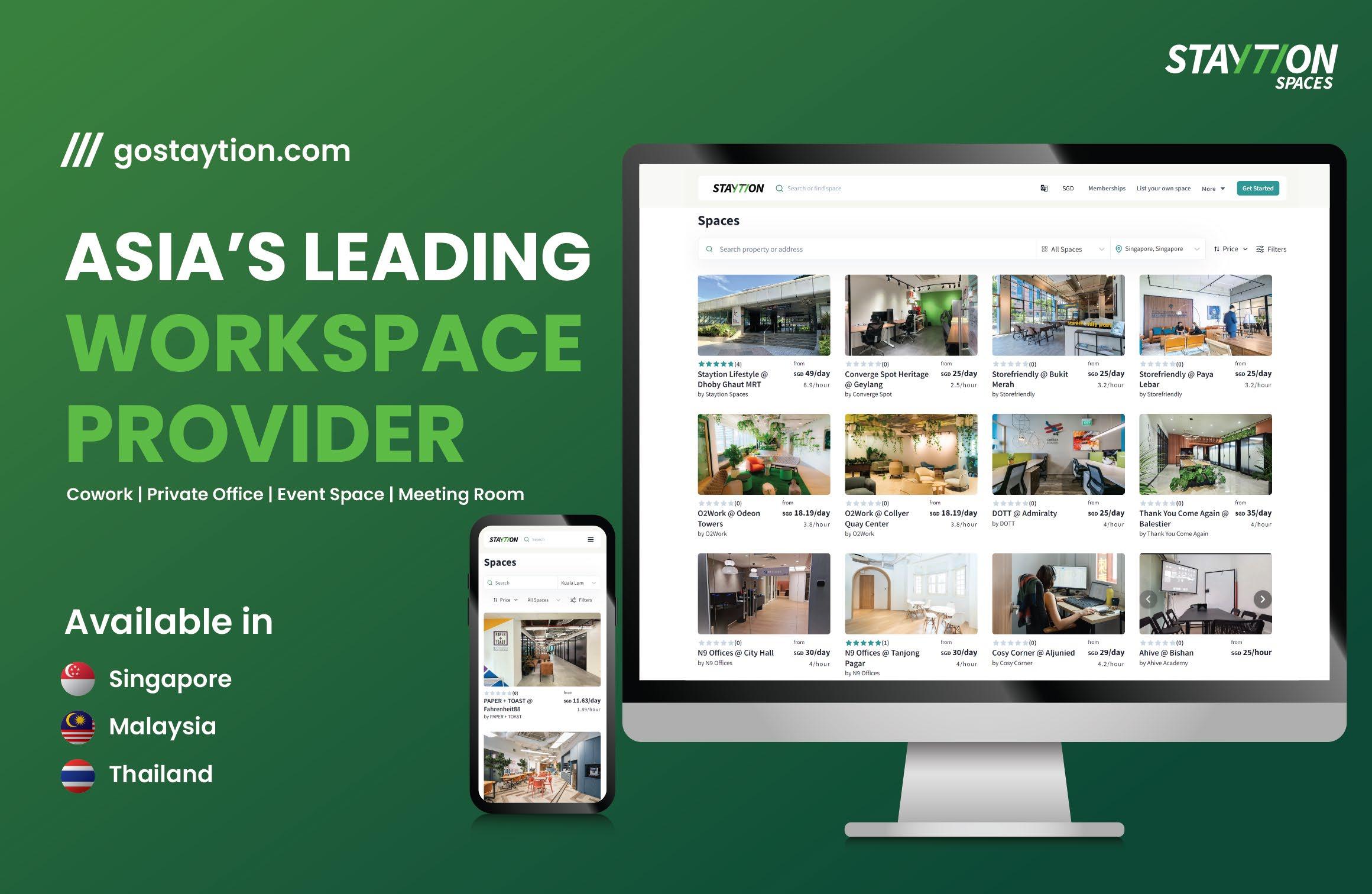
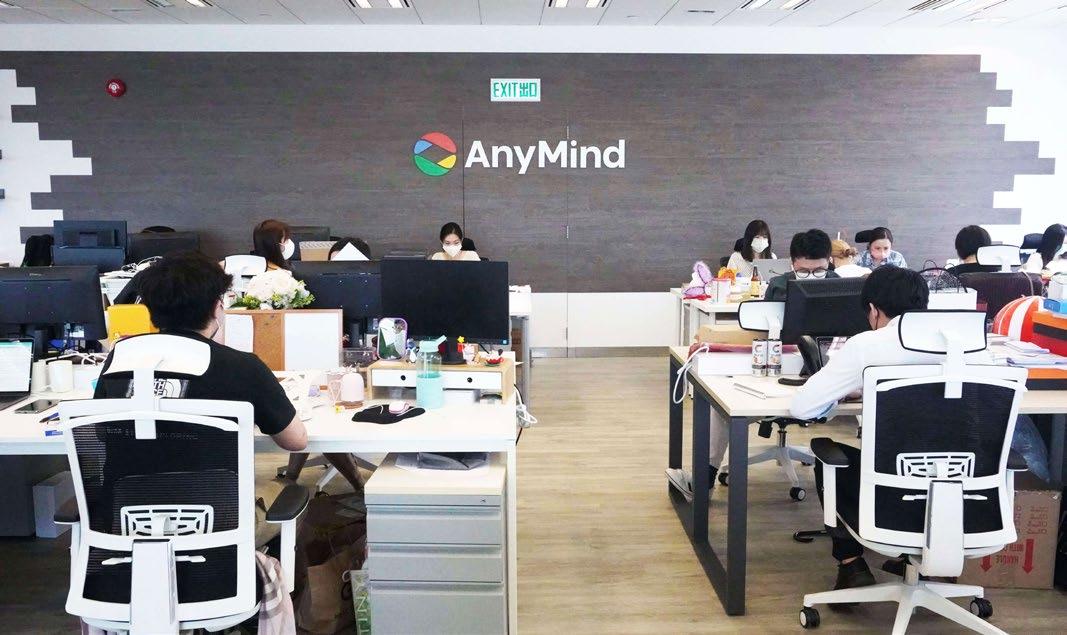

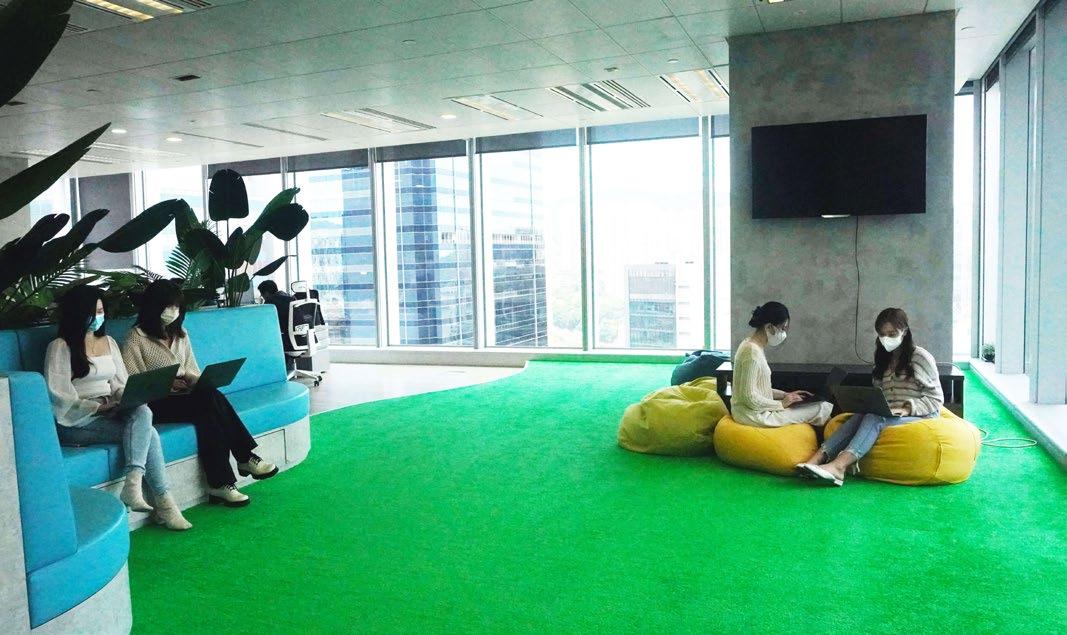 AnyMind’s new headquarters in Kwun Tong have no walls between departments
AnyMind conducts team-building activities in the office such as “happy hour” and “TGIFridays” to increase the job satisfaction of their employees
Its "collaboration area" has a greenfield look and bean bag chairs for relaxation and informal work
AnyMind’s new headquarters in Kwun Tong have no walls between departments
AnyMind conducts team-building activities in the office such as “happy hour” and “TGIFridays” to increase the job satisfaction of their employees
Its "collaboration area" has a greenfield look and bean bag chairs for relaxation and informal work
Developers gear up for prime sites in Singapore's H2 2023 Government Land Sales
The programme comprises eight confirmed list and nine reserve list sites.
sitting next to Orchard Boulevard MRT station and close to the premier shopping belt at Orchard Road.
“The embassies in the vicinity and the Singapore Botanic Gardens. The last time a GLS site was sold in the Orchard Road area was in May 2018, where Cuscaden Reserve is now being developed,” Tay said.
Data from OrangeTee showed that Cuscaden Reserve attracted nine bidders. The winning bid for the site was US$1,784.28 (SG$2,377.2) per square foot per plot ratio (psf ppr) and was awarded on 17 May 2018.
Christine Sun, Orange Tee’s senior vice president of research and analytics, has stated that Orchard Road may be viewed as a “trophy project” by the developers.
With strategic locations and accessibility to mass transit stations, four prime sites under Singapore's second half (H2) of the 2023 Government Landscape (GLS) programme are drawing significant attention from real estate insiders. Not only do they promise unparalleled connectivity and luxury, they could usher in a fresh chapter in the city-state's residential development.
These four prime sites include Orchard Boulevard, two on Zion Road, and Holland Drive.
According to Tricia Song, CBRE’s head of Research for Southeast Asia, the prime sites account for 24% or 1,225 units of the total units that can be built on the Confirmed List. Including the Reserve List, these four prime sites make up about 29% of the total residential supply.

The prime sites under the Confirmed List are Parcel A - Zion Road and Orchard Road, whilst Parcel B - Zion Road and Holland Drive are under the Reserve List.
“We have not seen such prime sites since GLS H2 2019’s Irwell Bank Road site, and not as many prime
choices in a single GLS programme in a decade or more. The proportion devoted to prime sites is surprising given the recent cooling measures, which included the 60% Additional Buyer's Stamp Duty (ABSD) on foreigners and should affect the prime housing market the most,” Song commented.
Meanwhile, the four sites can also potentially inject over 2,500 units into the Core Central Region (CCR), according to Leonard Tay, Knight Frank Singapore’s head of research, as the government seems keen to develop residential catchments around these mass transit stations.
“It does appear that with the commissioning of new MRT lines in recent years, such as the ThomsonEast Coast Line, the government is also starting to populate residential catchments along some of these new mass transit stations, such as at the Orchard Boulevard, Zion Road and Upper Thomson Road plots,” Tay commented.
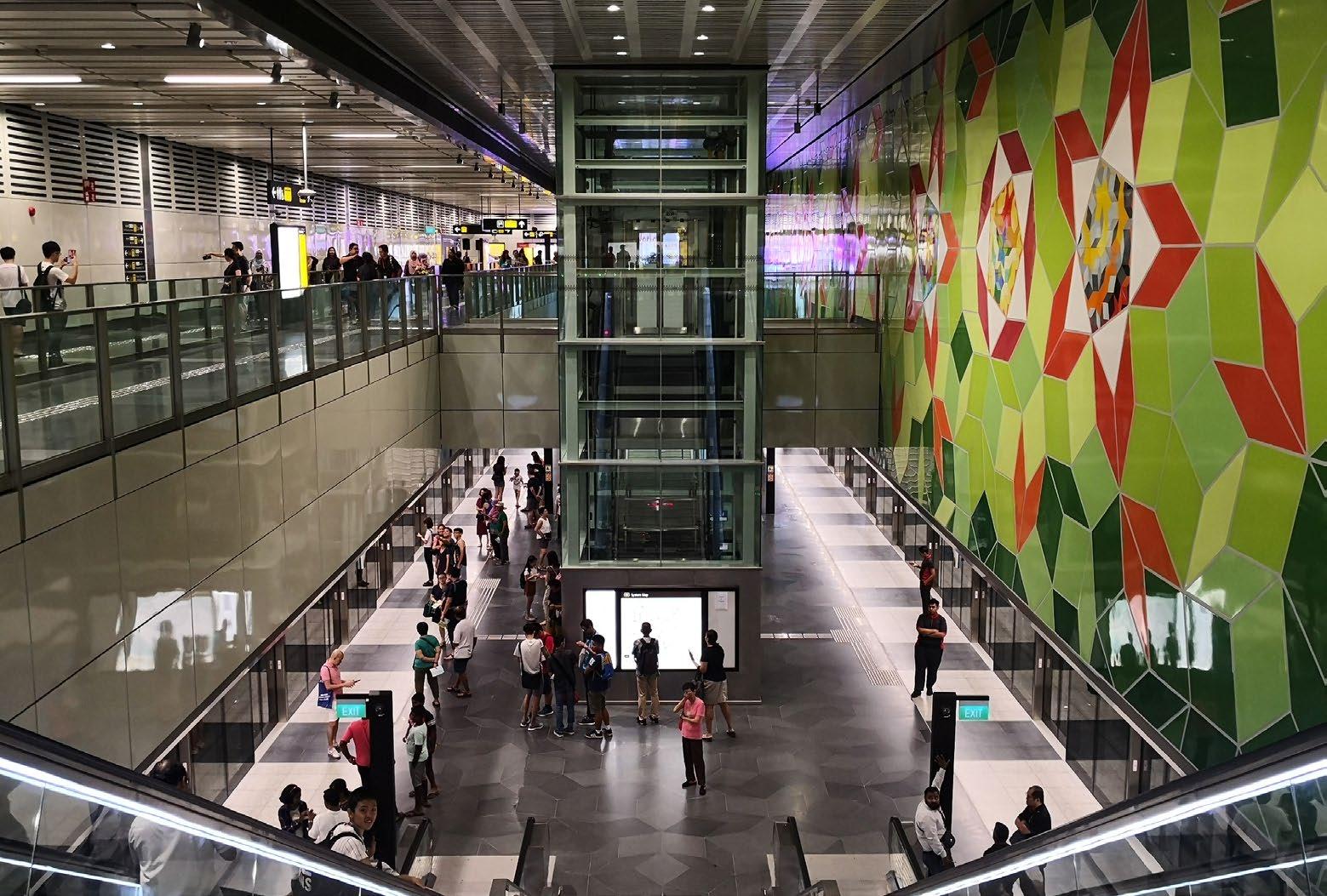
Orchard Boulevard
What makes this site attractive is its location, said Tay, adding that it is
“It is a plum site situated beside the Orchard Boulevard MRT station and nestled within the Orchard shopping belt, which is very rare in the market. The MRT station is along the Thomson East Coast Line opened recently. Moreover, few new developments in the Orchard area are directly linked to an MRT station,” Sun said.
“There has not been a GLS released for sale in the vicinity in the past five years ago. Therefore, developer and buying interest may be healthy for this plot…The future condominium may be marketed as a super-luxury project which may draw keen interest from high-networth individuals,” she added.
Lee Sze Teck, Huttons’ head of research, said the top bid for the site could be more than $1,500 psf ppr.
Zion Road
The two Zion Road land parcels will be attractive to developers because of the accessibility to public transport nodes, said Tay, adding that the sites are a short drive from the Central Business District (CBD).
Lam Chern Woon, EDMUND TIE’s head of research and consulting, expects strong enduser demand for the Zion Road parcels “given its choice location and

14 REAL ESTATE ASIA PROPERTY REPORT: SINGAPORE
The government is starting to populate residential catchments along some of the new mass transit stations (Photo by yenwei from WikiCommons)
We have not seen such prime sites since GLS
H2 2019’s Irwell Bank Road site
Tricia Song
Leonard Tay
proximity to the Great World City, the Tiong Bahru food centre, quaint and hip neighbourhood of cafes, and the Great World MRT station.”
Sun had a similar sentiment, saying the future development in the site may be popular among buyers as it is within walking distance of an MRT station. “However, future condominium units may not enjoy river views as they could be blocked by nearby developments,” she added.


Still, Sun expects strong interest from developers on this site, given that other GLS in the vicinity attracted many bidders.
Lee , on the other hand, expects the top bid for Zion Road (Parcel A) to reach more than $1,300 psf ppr.
Holland Drive
“The Holland Drive site introduced in H2 2023 can be an interesting one for developers, as it is located next to
units. Lam had a similar sentiment saying that the Holland Drive site will “ride” on the success and rejuvenation of the Holland Village precinct by the One Holland Village project.
“This site is likely to draw strong interest from developers given its proximity to town, the range of amenities and F&B options, as well as connectivity provided by the Holland Village MRT station on the Circle Line,” Lam added.

Other attractive sites

Other sites which experts believe will be attractive to developers include De Souza Avenue, Upper Thomson Road, Clementi Avenue 1, Lorong 1 Toa Payoh, and Tampines Street 95 (Executive Condo).
De Souza Avenue under the Reserve List, is expected to draw in developers due to its proximity to the Bukit Batok Nature Park and
due to its proximity to the ThomsonEast Coast Line. “There is ample greenery in the vicinity which will draw nature lovers and units facing the greenery may have good views. However, some units at Parcel B which faces the expressway may be noisy and dusty,” Sun commented.
Clementi Avenue 1 Site and the Lorong 1 Toa Payoh sites will gain interest as both these projects are in popular residential precincts namely Clementi and Toa Payoh, said Wong Xian Yang, Cushman & Wakefield’s head of research for Singapore & SEA. “The sites [are] underpinned by strong underlying buying demand,” Wong said.
Meanwhile, the Lorong 1 Toa Payoh site will be popular given that the supply of private homes in the area is quite limited. The top bid for Lorong 1 Toa Payoh could be more

REAL ESTATE ASIA 15 PROPERTY REPORT: SINGAPORE
Christine Sun
Lee Sze Teck
Lam Chern Woon
Excess supply of offices depleting in Asia-Pacific
By 2033, the region will have the lowest future office availability.
Future Office Availability Index
The Asia-Pacific region faces a looming depletion of excess office supply by 2033, driven by shifting workplace dynamics, according to forecasts by Savills' Future Office Availability Index.
Cities such as Singapore, Seoul, and Mumbai are at the forefront of this trend, in contrast to the United States, which is projected to have ample office availability in the same timeframe.
“This isn’t about offices just becoming empty due to some cities seeing lower return to work levels post-pandemic”, said Kelcie Sellers, associate at Savills World Research. “It’s about how longterm economic, demographic and development trends interact with working patterns, to determine which cities potentially need to focus most closely on retrofitting and repurposing excess office space for other uses.”
The Savills index indicates that United States cities are likely to have the highest future office availability,
whilst the excess supply for cities across the Asia-Pacific region are expected to be lowest. European cities generally fall in the middle, with supply and demand dynamics maintaining a relatively balanced state, whereas in Singapore, a growing number of employees are returning to the office, particularly in industries such as banking, finance, and companies from China, Japan, and Korea.
However, technology firms continue to embrace flexible working policies. Going forward, a hybrid working model is anticipated, driven by the need to retain millennial and Gen Z staff who value remote work and occupiers’ need to reduce rental overheads.
Singapore’s new office supply has remained relatively low from 2020 to 2022. In 2022, considering the withdrawal of office space from the market and new additions, the net lettable area (NLA) is recorded at 926,000 sq ft (Source: URA). For
2023, despite the influx of 1.9 million NLA of new space, a significant portion (1.26 million sq ft) is attributed to IOI Central Boulevard. Considering potential project delays, this upcoming development may spill over into the supply figures for 2024. Cumulatively, from 2024 to 2028, the projected new supply stands at 3,196,000 sq ft NLA (Source: Savills).
Alan Cheong, executive director of Savills Research & Consultancy, comments, “Whilst office space in most developed economies faces excess supply in the coming years, Singapore remains a relatively tight market due to a lack of new supply, which offsets the expected decrease in demand as companies adopt hybrid work models.”

In comparison, US cities are projected to experience the highest office availability over the long term. Many occupiers have already implemented “return to office” mandates in 2023, which is expected to drive short-term office demand. This will gradually reduce the surplus space in some locations, offering tenants a range of options to choose from.
Retrofitting excess space

Marcus Loo, chief executive officer of Savills Singapore, highlights, “Singapore’s office market may possibly buck the trend observed in the US, as local authorities manage the supply of land available for large-scale office developments. Moving forward, the narrative will revolve around two key themes. A limited supply-driven market and the increase in secondary stock. Two diametrically opposed effect on rents and how it will behave, and we expect these two themes to continue to play out in an economic environment as occupiers continue to remain cautious on spending.
However, it is becoming apparent that higher tiered green buildings will see sustained interest as more tenants consider environmental, social, and governance (ESG) factors in their selection and decisionmaking process.”
To read the full story, go to https:// realestateasia.com/

16 REAL ESTATE ASIA PROPERTY REPORT: APAC
More tenants consider environmental, social, and governance (ESG) factors
Source: Savills Research using Oxford Economics, Kastle Systems, and local sources
Note: Index is colour ranked from markets most likely to see an increase in office availability (dark blue), to those least likely (burnt orange). Each category is individually colour-scaled. Utilisation trends is given a half weighting. Demand trends and supply trends are equally weighted.
Alan Cheong Demand trends Supply trends Utilisation trends Total San Francisco New York Los Angeles Chicago Houston Washiton DC London Berlin Madrid Hong Kong Amsterdam Frankfurt Dubai Tokyo Paris Sydney Shanghai Beijing Kuala Lumpur Delhi Singapore Mumbai Seoul Guangzhou Ho Chi Minh City Shenzen
Kelcie Sellers
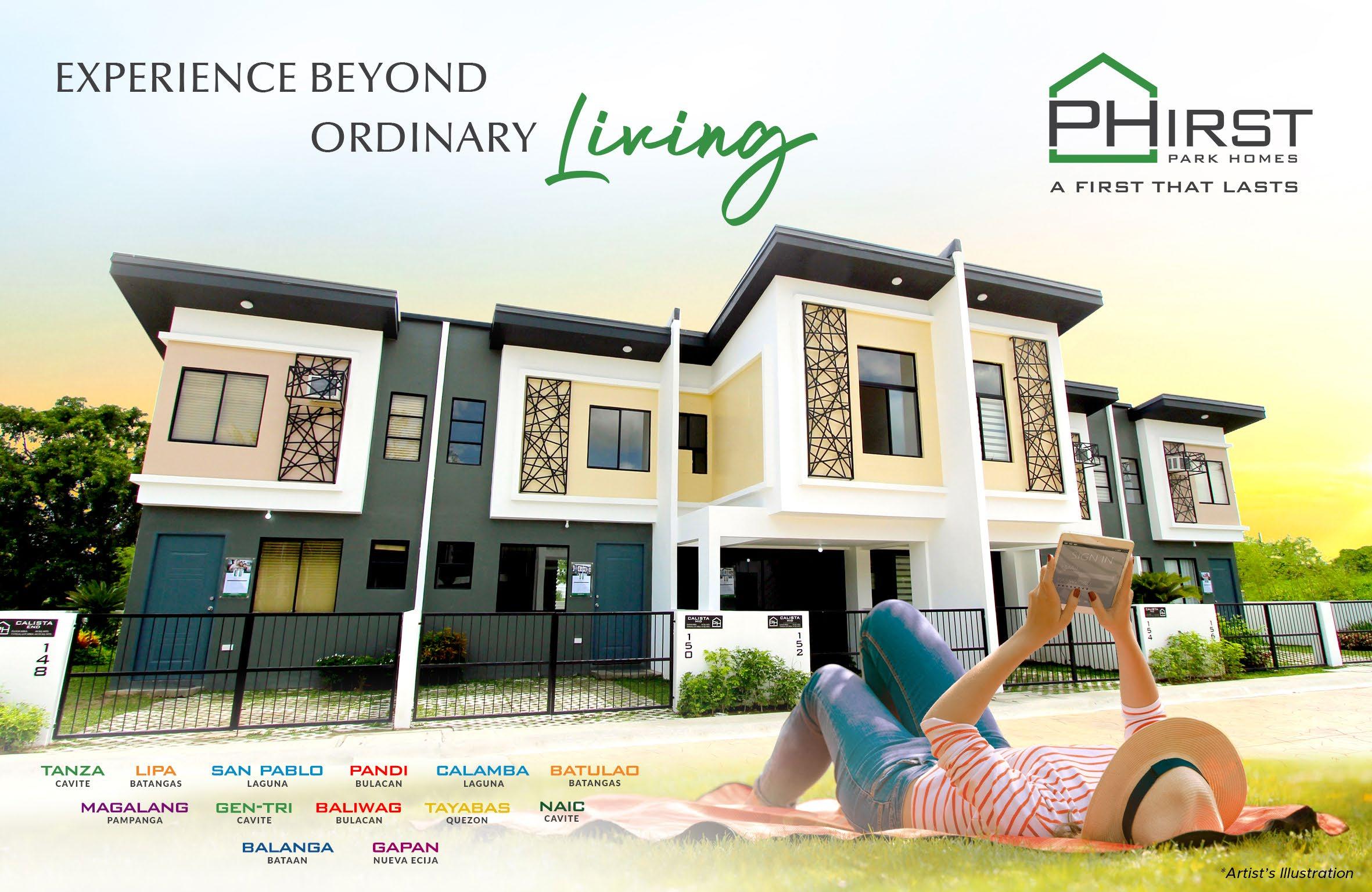
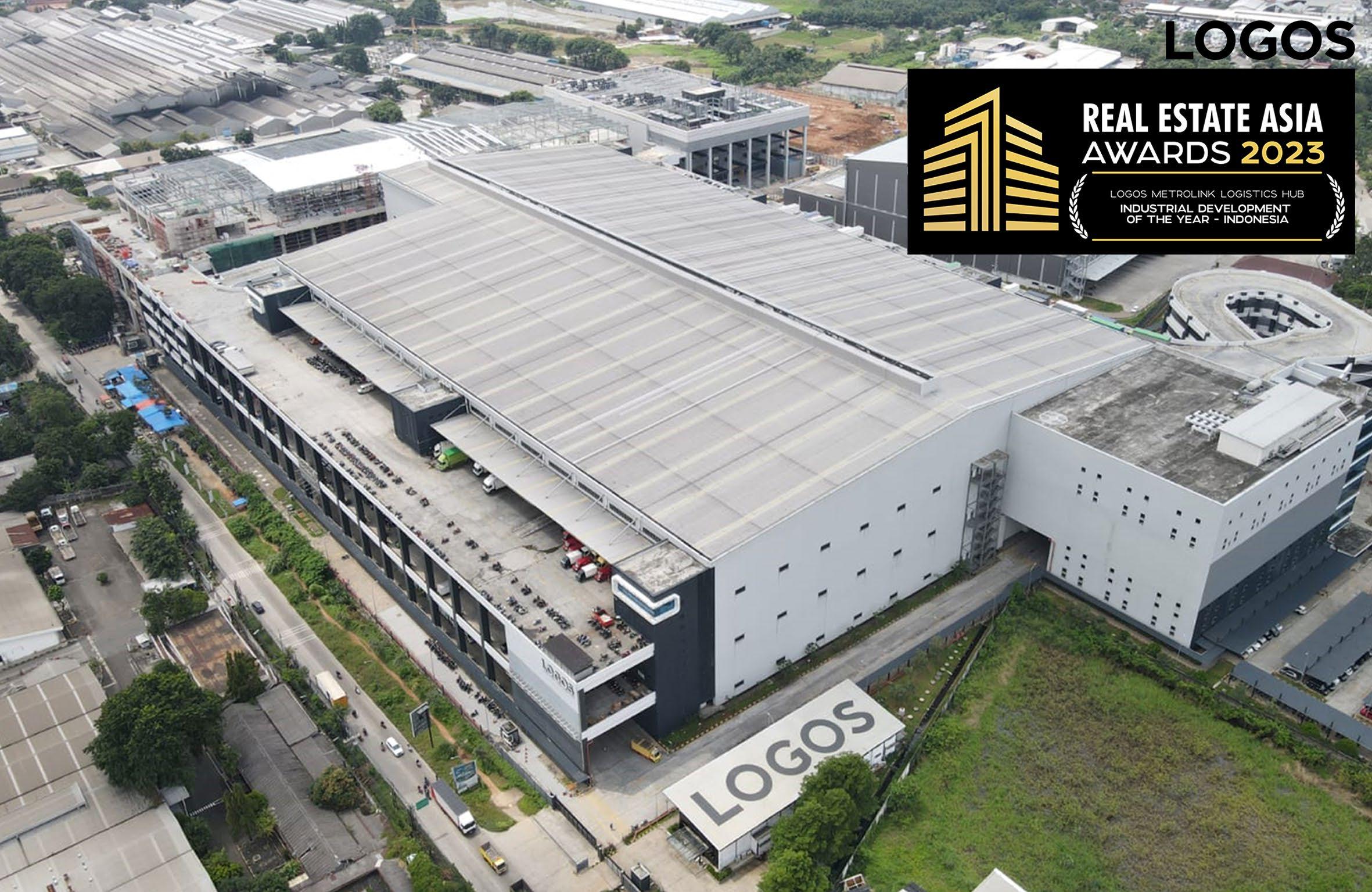
Savills pioneers next-level 3D interactive property tours in Hong Kong
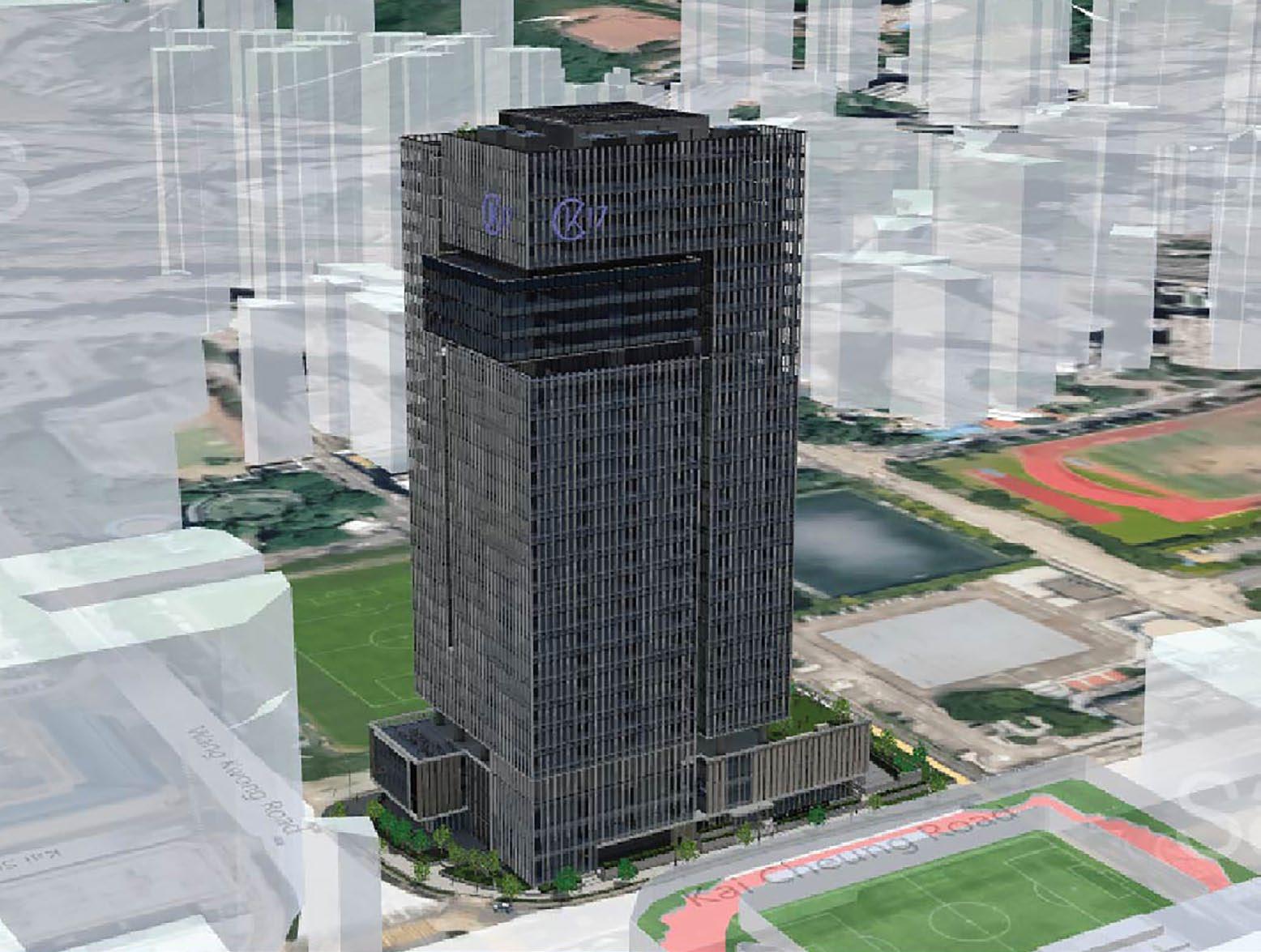
Clients can see the whole property, tenants, and community virtually.
Multinational firms seeking new offices in Hong Kong will no longer need to fly out to the city to view potential properties or ink property contracts blind, thanks to Savills’ launch of interactive 3D models.
Through this technology, would-be property buyers and renters will be able to simulate what it’s like to stand and move in the same exact space as the unit they are looking to get, even when they are standing a thousand miles away from the exact property.
Godfrey Cheng, deputy senior director of Savills Hong Kong, said travelling constraints brought at the height of the COVID-19 pandemic gave Savills the reason to come up with this new service.
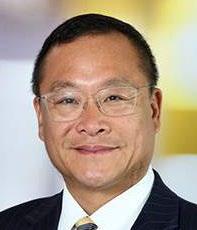

“People, especially those from Singapore and our overseas clients, cannot go to Hong Kong physically at the time,” Cheng told Real Estate Asia. “We found this tool which offers property tours virtually so that the client could just click on the link and browse all kinds of information they may need.”
Tech investments
Whilst the technology for 3D space capture has been available since the mid-2010s, Savills’s new technology has gone beyond the limitations of just touring a single space. Its technology allows clients to view whole buildings, as well as nearby tenants who might well be their next neighbours. “It is quite different from what we found on the market previously, which is only the Matterport-type virtual tour,” Cheng said. This technology has been on the market for five to six years, he noted, but usually only has a link to a single unit or a single floor. To offer its new service, Savills teamed up with startup Inspace XR, which makes use of virtual reality and augmented reality to create interactive 3D
models for the AEC (Architecture, Engineering, Construction) industries. This allows Savills to bring forth interactive, high-fidelity VR experiences to buyers, tenants and stakeholders beyond the confines of geography.
“For our 3D model, what we do is find the keywords that integrate all the elements in one link. An investor could just click a link, and they will be able to virtually visit the property,” Cheng explained.
He gave the magazine a tour of the service, which giv es a view not just of the building’s interface, but also information regarding which tenants are in the property, for example. It also gives an overview of nearby infrastructure and buildings, even those that have not yet been fully built. For clients, Savills Hong Kong tailors a link to show them the keywords or details they may particularly want to know about. “This saves a lot of time for
our tenants and buyers before they actually physically install in the property, because it saves them a lot of time from travelling,” Cheng said.
More than anything, the service positions Savills as a pioneer of interactive 3D model technology in the Hong Kong and Greater China real estate industry.
“As the first real estate services firm to formally adopt the interactive 3D model technology, we firmly believe it will prevail in the industry,” Raymond Lee, CEO, Greater China of Savills, remarked during the launch of the service.
“Working with Inspace XR, we hope to pioneer this technological breakthrough in our business operations in property investment, leasing and property management advisory, with a view to promoting the technology to a wider circle of asset management companies, REITs and developers that leads to the digital transformation of the local real estate industry,” Lee said.
18 REAL ESTATE ASIA CONCEPT
WATCH
INSPACE XR interactive 3D model (Photo courtesy of Savills Hong Kong)
An investor could just click a link to virtually visit the property
Godfrey Cheng
Raymond Lee
HONG KONG
Trendsetting students drive SWID’s Metaverse apartments’ occupancies
Investors, who are only 30% of the total, also rent out their units to students.
Property developers are racing to construct towering structures to target millennials in smaller cities, with Yogyakarta standing as a prime example.
PT Saraswanti Indoland Development Tbk (SWID) has recently developed a 60-metre-tall high-rise building with 18 floors in the area they call Mataram City. The infrastructure offers metaverse-era apartments, designed specifically to appeal to the preferenes of millennial and Gen Z students.
The company’s marketing director, Mita Ratri, explained that students comprise 70% of the building's occupants, with the remaining 30% being investors who rent their units to students.
Design for students
SWID recognised the potential of the market in Yogyakarta, where the demand for high-quality student housing far outstrips supply. With boarding prices in the city reaching up to US$132.20 (IDR2m) per month, SWID saw an opportunity to cater to a new generation of students with increasingly sophisticated tastes and financial capabilities.
According to Ratri, young people today are very different from previous generations in their preferences for living spaces. “They don’t just want a place to sleep; they want a place to relax and enjoy themselves. That’s why our apartments are designed to be a ‘staycation’ destination.”
Mataram City is a mixed-use area that spans nearly three hectares of land in Yogyakarta. It combines apartments with hotels, convention halls, restaurants, cafes, minimarkets, gyms, co-working spaces, ATM centres, open areas, jogging tracks, and large parking areas.
Five towers make up the development, including Nakula, Sadewa, Yudhistira, and the two towers that were recently launched, namely Arjuna and Bima. SWID has paid close attention to the design and interiors of their
apartments, recognising that current young generation today value aesthetics; hence, very design-conscious.
“I have to think creatively with my team, most of whom are young people. Once, when we made a campaign with prizes for students, we found that they were more interested in getting Yeezy shoes as prizes than prizes for TVs, air conditioners, or refrigerators,” told Ratri.
Metaverse apartments
SWID’s strategy to capture the student market goes beyond offering aesthetically pleasing apartments. They also emphasise the use of technology in their developments, with a focus on what Mita calls “apartments in the metaverse era.”
“We approach consumers through a virtual tour that we have developed. They don’t need to visit and can see everything live in hand,” said Ratri.
The units are equipped with a Google Assistant that manages everything from electricity to room temperature to water management. “Everything is integrated, including secure parking, which is typically found in high-end developments,” explained Ratri. SWID has also incorporated elements of Yogyakarta’s cultural heritage into their developments. Mataram City, for example, is named after the ancient Javanese kingdom that once ruled the region. The names of the towers also draw inspiration from Javanese mythology, with Nakula, Sadewa, Yudhistira, Arjuna, and Bima all referencing characters from the Mahabharata.
SWID’s innovative approach has paid off, with the company achieving an increase in sales even during the pandemic. It was able to hand over apartments in 2020; and in 2022, it registered as a public company on the Indonesia Stock Exchange.
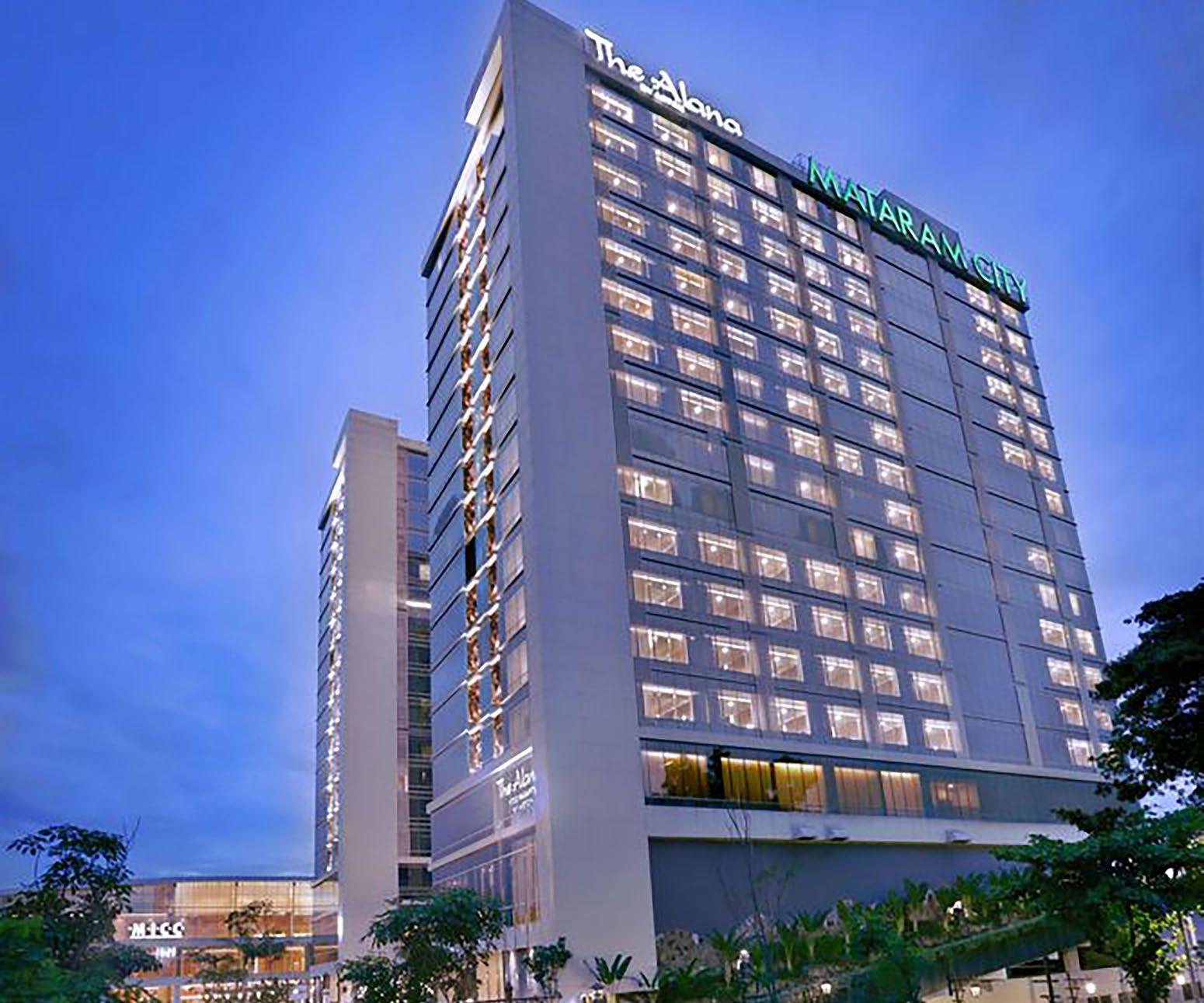
REAL ESTATE ASIA 19
Mataram City is a mixed-use area that currently consists of three towers, the Nakula, Sadewa, and Yudhistira, located in Yogyakarta (Photo courtesy of SWID official website)
are designed to be a ‘staycation’ destination
Apartments
PROPERTY WATCH: MATARAM CITY INDONESIA
Sun Hung Kai Properties’ hybrid aparthotel caters to next-gen tenant needs
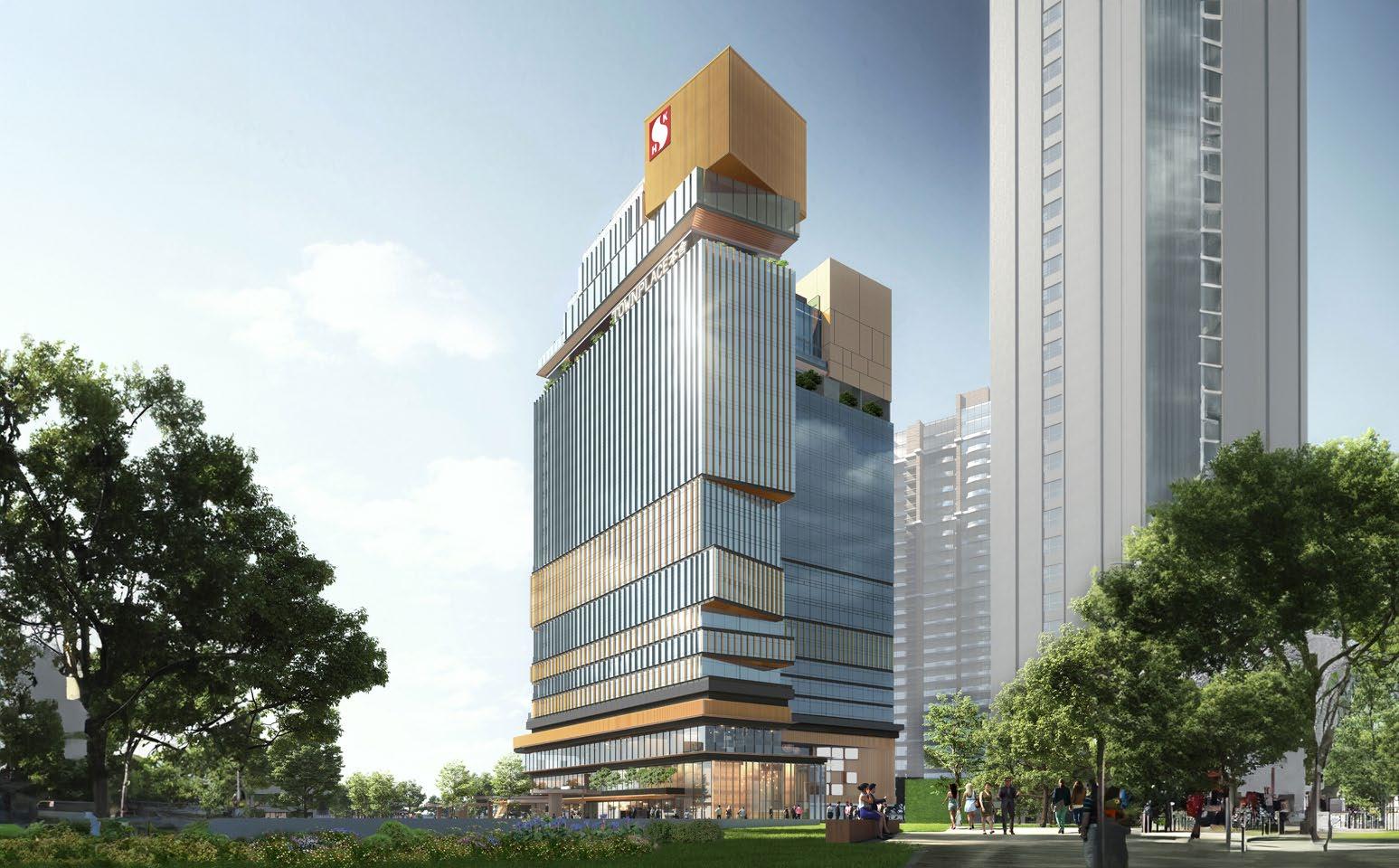
TOWNPLACE WEST KOWLOON offers incredibly flexible lease terms in a modern and upbeat community.
Young professionals in Hong Kong are now looking beyond location and design when searching for homes and are choosing spaces that can offer them an “exquisite living experience,” which is why Sun Hung Kai Properties created a development that offers both.
TOWNPLACE WEST KOWLOON (TPWK) is an 843unit aparthotel tailored for young professionals, offering individual layouts, mostly studios and onebedroom as well as options of two-to three-bedrooms. The size of units ranges from 243 square feet to 860 square feet.
The development was established with the help of the interior design experts at Conran and Partners and architectural firm, LAAB.
Hybrid concept
“Aparthotel is the exact answer to the modern needs of young professionals that does not rigidly define the space, but combines the good side of both apartment and hotel — that’s what we call a hybrid concept,” TOWNPLACE (TP) Deputy General Manager Elee Lee told Real Estate Asia.
Flexibility to every extent — lease terms, designs, and ondemand services
“Flexibility to every extent — lease terms, designs, on-demand services, etcetera — allows millennials to choose what they want. Flexibility is definitely our edge,” Lee added.
The TOWNPLACE features that make it attractive to young professionals include a hybrid shortand long-term leasing model and hotel service on-demand options.
Lee revealed that TPWK offers flexible leases from mere days to months, and even years.
Apart from flexible leases, the TOWNPLACE development also offers a “trio” unit which is designed for tenants who value “togetherness and privacy.”
“Each of the three private bedrooms is connected to a spacious shared living room area, providing the perfect balance of comfort and socialisation. It is perfect for a group of working buddies or partners who want to stay close together whilst still enjoying their own private space,” Lee said.
The development also prides itself on the “Community.” The development has a comprehensive clubhouse as well as a common area where tenants can socialise.
“Young professionals need a socialising platform for them to get together and to build something greater. They look for a dynamic and quality lifestyle as well as a platform allows that them to have social and business networking, We name it as ‘Blesisure’ lifestyle,” Lee said.
A centre for young professionals Sun Hung Kai Properties selected West Kowloon as the location for its new aparthotel for several reasons, but mainly for being “consumer/ customer-centric for the young professional.”
“The lively West Kowloon Cultural District is becoming an outstanding creative hub, attracting young professionals and inspiring modern and traditional ideas,” Lee said.
In addition, the government is developing West Kowloon into a business district; thus, stirring up young professionals’ preference to live in the area.
“The buzzing new West Kowloon Cultural District (WKCD) is shaping up to be a hive of outstanding creative activities, which has become a thriving destination for young professionals to gather and be inspired by both modern and ancient ideas alike,” Lee explained.
TOWNPLACE WEST KOWLOON s close to Hong Kong’s Central Business District and high-speed rail station and airport line station.
The development is also adjacent to the International Commerce Centre (ICC) and the International Finance Centre (IFC). Other notable places near the development are M+ and the Hong Kong Palace Museum.
Lee said there will also be an upcoming Grade A office development in West Kowloon, making the area the perfect place for the aparthotel.
Looking ahead, Lee said Sun Hung Kai Properties will build more developments that cater to the needs of the new generation tenants.
20 REAL ESTATE ASIA PROPERTY WATCH: TOWNPLACE
TOWNPLACE WEST KOWLOON Facade (Photo from Sun Hung Kai Properties)
HONG KONG
IOI CBT redefines cooling system to reduce aircon dependence
Real estate developer IOI Properties’ new Central Boulevard Towers (CBT) installed a smart system within its rooms to adjust the temperature depending on the number of occupants. For example, when there are two people, the temperature will not be too cold.
Each office at the tower has a double-glazed full-glass window that allows an optimal indoor environment with ample natural lighting, resulting in lower aircon consumption.
"Our facilities will help guide the tenants to design the rooms [and] the breakout area in such a way that they are able to balance the aircon proportionately within the space itself,” Karen Lau, head of business at IOI Properties Singapore, told the Real Estate Asia

The development's orientation also allows enough sunlight into the office, leading to natural ventilation in its plaza area.
IOI Properties invested US$1.89m for the CBT project, which began in 2017. It will be completed this year but will only be occupied by early next year due to pending paperwork. Morgan Stanley and Amazon may be the first businesses to occupy the CBT spaces.
Convenient space
The property has an eight- to 16-storey shorter podium tower, an eight-to 48-storey taller tower, and 70,000-square feet (sq ft) of two ultralarge floor plates at Levels 5 and 6.

IOI CBT's offices also have breakout areas to attract talent and retain employees.
The development has a “Central Green” space, a 200-metre jogging track and biking parking lots to promote healthy transportation.
IOI CBT has also changing rooms and shower facilities to encourage biking to work without feeling sweaty in the office.
We immediately saw an opportunity for a new Grade A office development to better cater the needs of Singapore
Another convenient feature is a childcare centre for working parents to let their children have a place to stay on a workday.
Perfect for hybrid workers
The development is also highly accessible to hybrid workers due to its seamless connections to at least four MRT stations, with direct underground links to Downtown, Marina Bay, Raffles Place, and Shenton Way. It also has link bridges to One Raffles Quay and Asia Square. It is within walking distance of Singapore’s key financial and business centres in Raffles Place, Shenton Way, Cecil Street, and Marina Bay.
“When we looked at other developments in the area, we immediately saw an opportunity for a new Grade A office development to better cater to the needs of Singapore’s modern workforce in the heart of the Marina Bay District,” said Lau.
Sustainability as a core design
IOI CBT is also connected to the Marina Bay District Cooling Network, making it committed to the network’s focus to reduce the district’s carbon emissions by 19,439 tonnes yearly, equivalent to getting rid of 17,672 cars on roads.
The Building and Construction Authority also awards the development of the Green Mark Platinum Certification in Singapore. With this certification, IOI CBT generated 30% energy and water savings and environmentally sustainable building practices. This means it commits to over 4,146 tonnes of carbon dioxide emission reduction each year.
Once the tower has opened to tenants, its other sustainability initiatives include recycling systems, waste disposal, and cleaning materials.
REAL ESTATE ASIA 21
IOI CBT is made of 75% of precast concrete, which cuts carbon and construction waste (Photo from Raffles Quay)
The IOI Central Boulevard Towers use a balanced air conditioning feature to lessen the carbon footprint in the units.
CBT SINGAPORE
PROPERTY WATCH: IOI
Karen Lau
ANALYSIS: CONSTRUCTION
Competing construction firms unite to meet industry’s towering demand
Builders leverage technology and shared expertise as the construction sector anticipates a $26b growth this year.
With millions to billions of dollars involved in every construction development venture, one would assume that builders compete fiercely to secure these projects. That cannot be said about Singaporean constructors that have begun to collaborate with competitors amidst an anticipated growth of the industry.
Data from the “Singapore Construction Industry Databook Series” show that Singapore’s construction industry will grow by 2.1% to reach US$26.57b in 2023. The Building and Construction Authority (BCA), meanwhile, estimates construction demand to range between US$19.93b and US$23.62b.
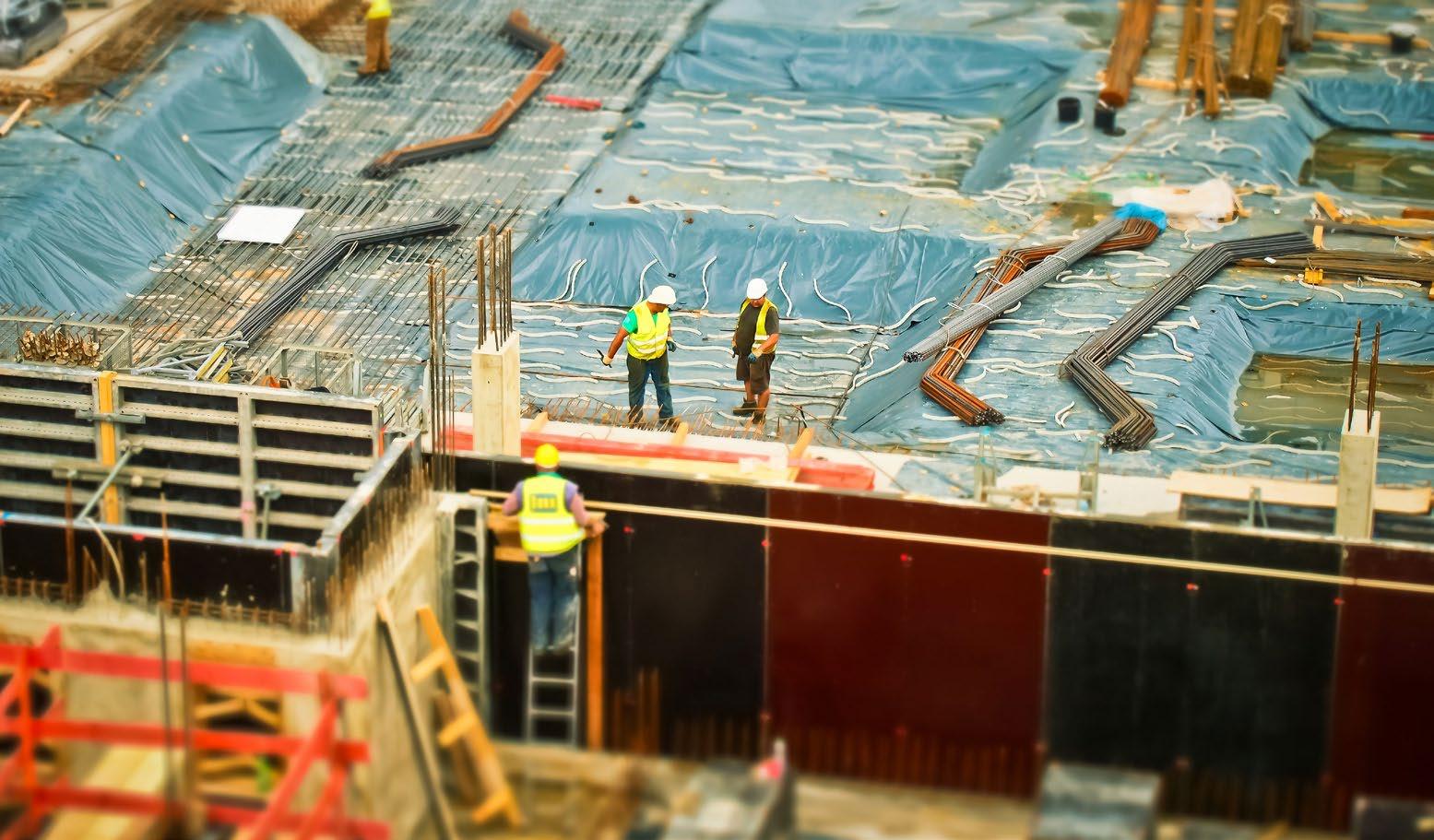
“Companies are actively exploring collaborations with competitors to risk-share and capitalise on new build projects,” Dennis Lee, partner at RSM Singapore, told Real Estate Asia. “Construction firms have [also] been looking closely at capacity management, reducing down time and working closer with authorities to explore flexibility and efficiency in project planning,” Lee added.

Catching up
Lee said firms are also collaborating with competitors to make up for lost time during the pandemic and work on project schedules that have been pushed back.
ISG General Manager Kelvin Hon has made the same observation, citing how several contractors are working on a single development since the clients have split big projects up into separate packages.

Lee agreed that subdivision of a project into smaller phases or packages may promote concurrent activities and reduce overall project duration.
The RSM Singapore expert added that doing such will also help “limit exposure to a single main contractor that may not have the strongest of financial positions.”
“Working with a broader range of project vendors, allows developers
to extract value by leveraging on a range of expertise, specialisation and valuable relevant experience,” Lee added. However, he underscored that there are still projects that have fallen behind timelines despite such arrangements. “This can often be attributed to coordination challenges and having to align interests with a larger pool of working parties,” said the RSM expert.
“Other downsides [of such an arrangement] include inconsistent communications in particular relating to health and safety, which can be overlooked when having to deal with numerous parties,” he added.
Tech as foundation
Apart from coming together, firms have leaned into technologies such as Building Information Management Systems (BIMS), to avoid project delays. BIMS, in particular, helps firms in terms of “better end stage visualisation and anticipation of resource or material deficiencies which could further worsen project delays.
Companies also looked hard into implementing project management systems which allowed them to reduce
data gaps and better identify project shortages that could be addressed with the necessary parties earlier,” said Lee. Hon said that adoption of technology brings enhanced efficiencies and opportunities to the construction process, whether it’s the use of game-engine derived 3D renderings to produce realistic building walkthroughs or to validatematerial products and specifications.
Head-mounted cameras are also used to provide project updates without the requirement to physically visit site for progress reports. These technologies not only help speed up projects, but also address other challenges hampering the industry such as the manpower crunch.
Addressing obstructions
Lee said labour shortage remains one of the major challenges of the industry, given that Singapore has a heavy reliance on foreign manpower for building projects. Insufficient dormitory space throughout Singapore to house registered construction workers have also affected labour supply in the industry.
To read the full story, go to https://realestateasia.com/
22 REAL ESTATE ASIA
Companies are actively exploring collaborations with competitors to risk-share and capitalise on new build projects
Downsides [of collaborating] include inconsistent communications in particular relating to health and safety
Kelvin Hon
Dennis Lee
SINGAPORE
How to find the right flex space for an organisation
Five out of 10 organisations in Singapore opt for flex leases, says an IWG expert.
situation because the landlord will retain you as a tenant and they can have space that can go back into the market to lease out again so they won’t lose the client,” he explained.
With environmental, social, and corporate governance (ESG) being a big topic in Singapore, Van Beijsterveldt said occupiers must look into sustainability credentials of the space providers.
Rogers said IWG also chooses landlord-partners whose buildings have received Green Mark Certification. An example of this is IWG’s Regus Centre at 61 Robinson Road, which has received a Green Mark Platinum certification.
“Using flex and the recyclability and the reusability of the same space helps organisations reduce that footprint from their long term leasing strategy as well,” the IWG executive said.
Demand drivers
Businesses are pivoting from traditional long-term leases to flexible spaces to cut their office footprint and meet the workers' varying demands. To help occupiers narrow down their options, operators have begun offering spaces to cater to the specific needs of businesses.
IWG, for instance, has a roster of brands that cater to different ways of working such as Signature, which has a high-end finish and resonates with users who want to give an “image and presence” of being a C-suite environment.
“We also have our Spaces brand which tends to be more entrepreneurial, a little bit more relaxed, and what you would classify as a co-working environment,”
IWG Singapore Country Manager Darren Rogers said.
Rogers underscored, however, that organisations must first identify how their organisation works and what kind of work environment is needed by the employees when choosing flex spaces.
Companies such as Standard Chartered, for instance, which may need a lot of private meeting rooms to have in-depth discussions amongst employees will likely need a clinical environment in which to work. “One product and one type of co-working
One product and one type of coworking [setup] doesn’t always work for every customer
[setup] doesn’t always work for every customer,” Rogers stressed, adding that a company’s accounts team won’t have the same demands as the tech team.
Colliers Singapore Managing Director Bastiaan van Beijsterveldt shared a similar sentiment, underscoring how important it is for organisations to know what employees want.
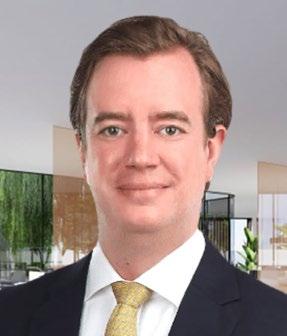
“Businesses should not only look at how the office is being used today, but more importantly, how employees want to use the office tomorrow,” Van Beijsterveldt said.

“It could be that today your colleagues would like to have some more informal kind of conversation points or informal meeting points; so instead of having just desks and meeting rooms in your office, you also have open spaces. But then later on, you will have more people back to the office for focus work… and want more individual desks,” he said.
Since flex spaces also translate to flexible leasing terms, Van Beijsterveldt advised occupiers to look into how their landlords can agree to more flexibility.
One option for occupiers with a five-year lease term is to propose that some space be handed back over time. “It can be a win-win
Companies’ shift from traditional long-term leases to flex leases are driven by a lot of factors, including the uncertainty of where hybrid work is going.
“Certain occupiers, prefer not making decisions right now that have a longer-term impact because they don’t necessarily know how the office will be used in three years’ time or how the business’ growth will be over the next three years,” Van Beijsterveldt said.
In Rogers’ view, many organisations are shifting to flex spaces to reduce facility spending.
“Sixty-five percent of all CFOs (Chief Financial Officers) are looking to achieve at least 10% cost savings, which they can do through resizing, remodelling their existing portfolio and existing office space,” he said.
“We also found about 50% of businesses are already reducing and opting for shorter term leases, as well, which naturally brings you into the realms of looking at hybrid and flexible solutions,” he added.
Rogers underscored that there’s an “absolute incessant demand from business to have flex as part of their core strategies.”
Citing data from JLL, IWG has realised how flexible workspaces will account for 46% of a business’ portfolio estate by 2025 from the current 30%.
To read the full story, go to https:// realestateasia.com/
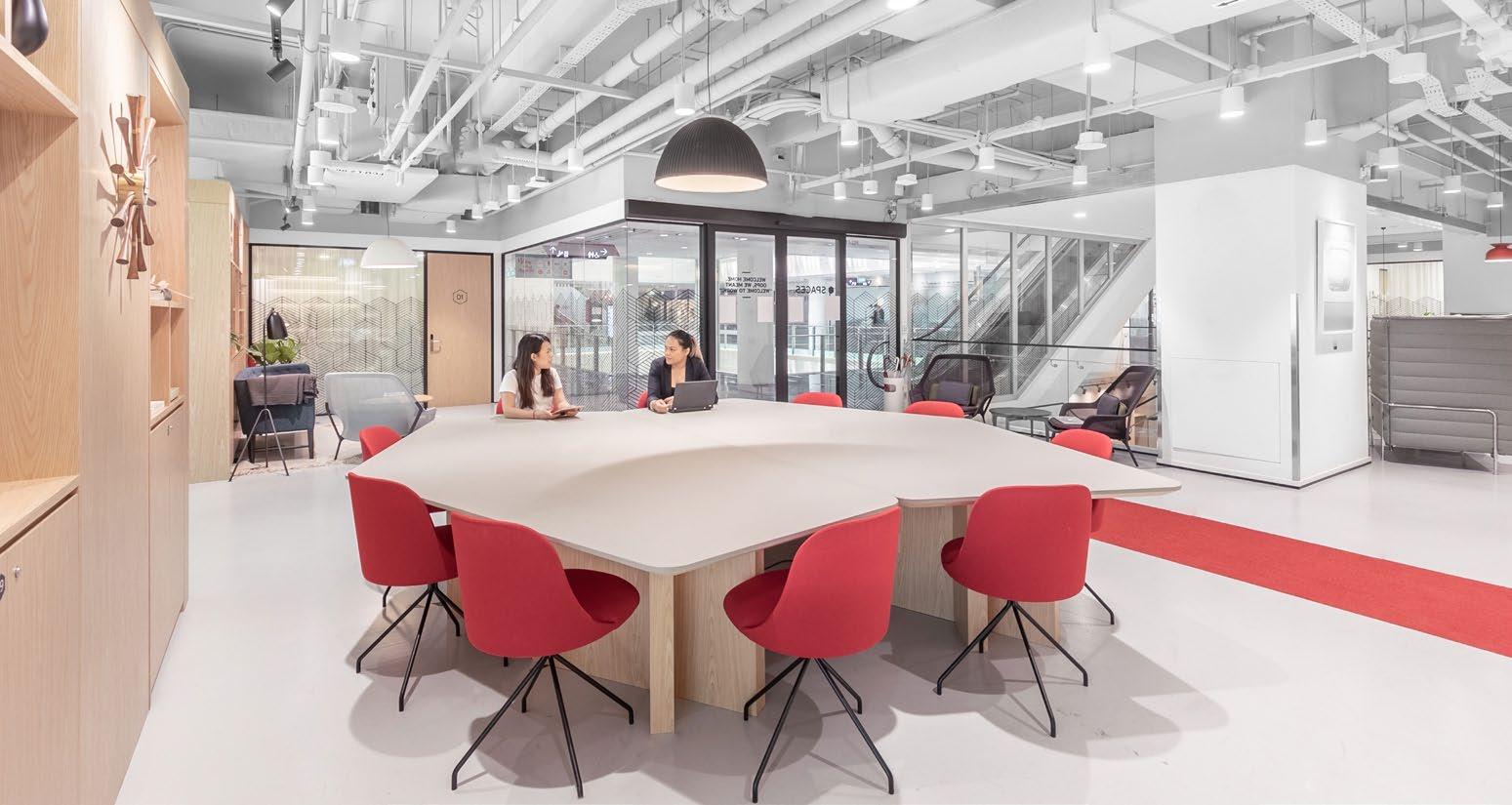
REAL ESTATE ASIA 23 INDUSTRY INSIGHT: REAL ESTATE
SINGAPORE
Darren Rogers
Bastiaan van Beijsterveldt
Spaces One Raffles Place 5300 Singapore Community Desk (Photo from IWG)
BPO sector seeks hub in Philippines’ provincial markets over labour costs
The office sectors in Clark, Iloilo, and Davao are expected to be ‘very bullish.’
With a huge spike in wages and increasing labour costs, businesses, especially business process outsourcing (BPO) sector, are looking for office space outside the capital of the Philippines.
According to KMC Savills, the net absorption in the office market in 2022 was 270,900 square metres (sq m), a reversal of the negative uptake in 2021.
“The office sector in general… is a mixed bag,” KMC Savills Managing Director Michael McCullough told Real Estate Asia. “We see some really high-performing markets like the Bonifacio Global City (BGC)… other submarkets like Alabang, the area has struggled.”

The BGC market saw a net absorption of around 141,000 sq m or more than half of the total in 2022, with the lowest vacancy rate in the capital region at 7.6%, as submarket’s “superior-quality” stock and location were appealing to the tenants. The BGC’s average annual rental growth rate 1.2% YoY in 2022 was the only recorded positive growth in the submarket.
The Makati Central Business District (CBD) posted a vacancy rate of 15.7%, with the average rents dropping by 3.4% year-on-year (YoY) due to the stock of ageing buildings. Meanwhile, Ortigas Center recorded a net absorption of 22,400 sq m in the fourth quarter, with an increase in rents by 0.9% compared to the previous quarter.
Provincial pull
On the other hand, McCullough noted the provincial sites are performing well, noting that they are “very bullish” on Clark in the province of Pampanga in the northern Philippines, Iloilo in the central, and Davao in the south. He also noted that Cebu is starting to see some recovery with landlords adjusting prices. There is a shift in demand in the provinces, particularly
The deciding factor is not so much the cost of the rent ...it's the cost of labour
for business process outsourcing (BPO) due to the cheaper labour as it accounts for around 80% of their cost structure.
“The deciding factor is not so much the cost of the rent. That doesn’t force the companies that go one place or another, per se. It’s the cost of labour, which is a lot larger portion of the way their expenses go,” he said.
“Labour is really driving the decision process. If they can save a little bit of money by being in the provinces with more affordable office space, more affordable labour, then the clients feel very happy,” McCullough added.
Cebu take-up triples
According to Savills, Cebu saw its net take-up triple in 2022 to 51,800 sq m with the Cebu Bussiness Park (CBP) accounting for around half of the absorption, and Cebu IT Park (CITP) underperforming with an uptake of just 12,800 sq m.
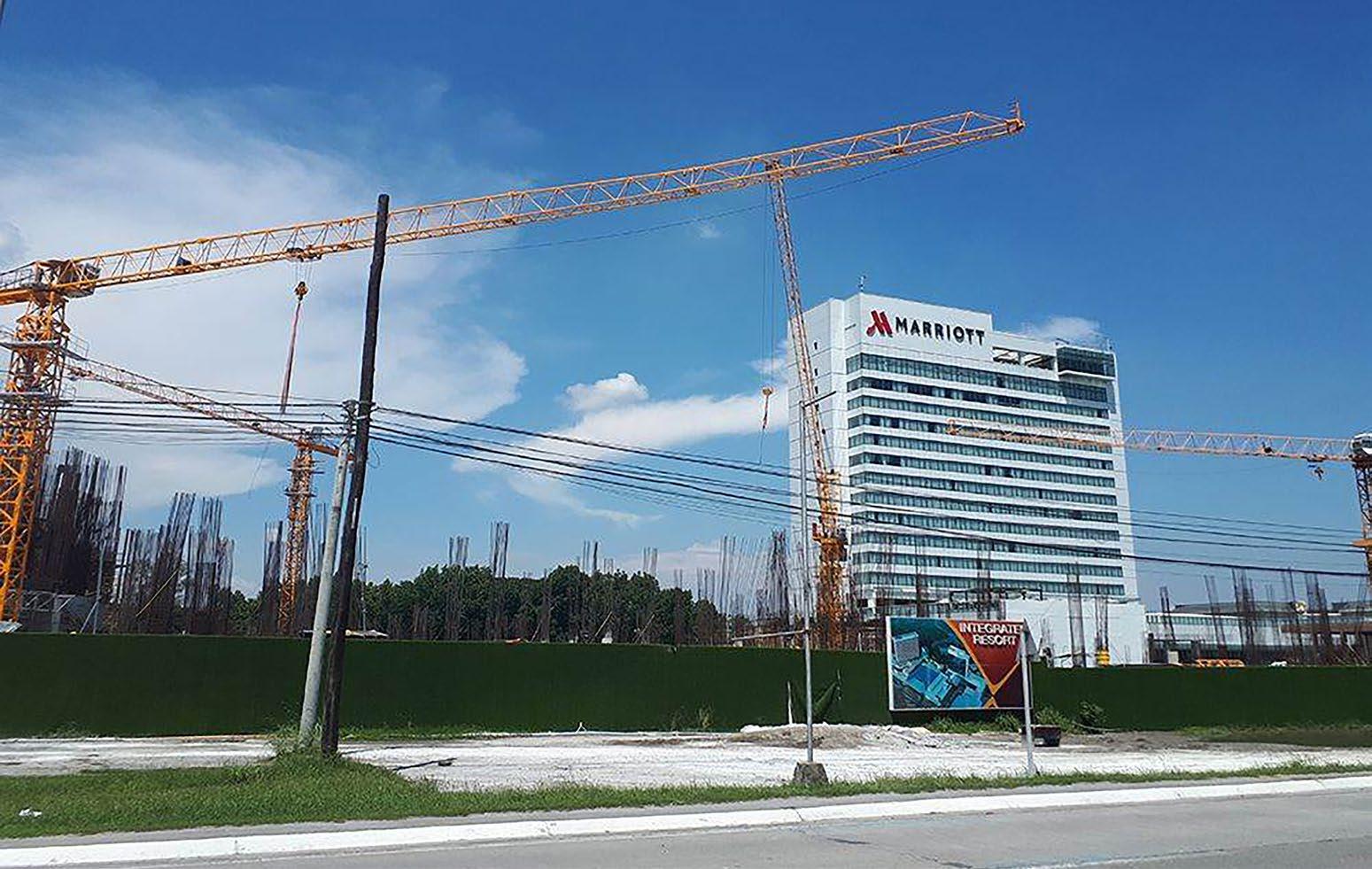
Despite this, Cebu’s overall vacancy rate was maintained at 21.8% with the additional 65,300 sq m supply. The average rent in the province declined by 8.6% YoY,
with the Cebu Fringe suffering the worst fall at 11% YoY
“For 2023, we expect new building completions covering 187,900 sq m to reach their highest since 2015, as a bulk of new supply is set to locate in CITP,” a Savills report read.
“However, we still forecast Cebu’s vacancy rate to drop to 18.8% as we expect a rebound in demand from the IT-BPO sector assisted by the lower rents from landlords. CBP may edge closer to single-digit vacancy rates this year whilst most leasing activity may concentrate in CITP and Cebu Fringe due to the number of vacancies,” the report added.
Future of the office sector Savills expects that the rebound will continue this year, with the net absorption expected to see a slight increase. However, this may be isolated only to the top markets.
The occupancy rate is also not expected to return above 85% of office stock until 2025.
The occupancy rate is also not expected to return above 85% of office stock until 2025.
To read the full story, go to https:// realestateasia.com/.
24 REAL ESTATE ASIA
REPORT:
SECTOR
COMMERCIAL PHILIPPINES
Additional office space in Clark, Pampanga expects to bring more BPO firms (Photo from the official website of KMC Savills)
Michael McCullough
Landed houses offer a solution to housing backlogs
Millennials in urban areas are experiencing a 79% occupancy shortage.
Property developers are focusing on creating homes that cater to the distinctive preferences and needs of millennials, who not only comprise the next generation of property buyers but are also the most affected by the gap between demand for and supply of housing in Indonesia.
In addition, despite the highinterest rate set, for example, by Bank Indonesia reaching 5.5%, Lamudi. co.id has observed that property consumers remain resilient.
In December 2022, though, online property searches increased by 9%, indicating a sustained interest in property despite the challenging economic climate.
Lamudi.co.id CEO Mart Polman noted that the next generation of property buyers are the millennial and Gen-Z generations, who make up 60% of property seekers on their platform.
“Within this group, landed houses are the dominant search target, accounting for 76% of searches in the period between June to December
2022,” Polman told Real Estate Asia. This preference for landed houses is driven by the younger generation’s desire for homes that meet their needs and preferences, such as having an effective and efficient area and being connected to the internet to facilitate ease of living.
Focus on landed houses
Real Estate Indonesia (REI), an organisation representing property developers, consultants, and agents in Indonesia, said that developers are currently focusing on landed houses. Around 79% of property development in Indonesia today consists of landed houses with a price range of US$19,753 (IDR300m) to US$65,845 (IDR1b). This residence, although relatively smaller, is effective both in terms of interior and facilities.
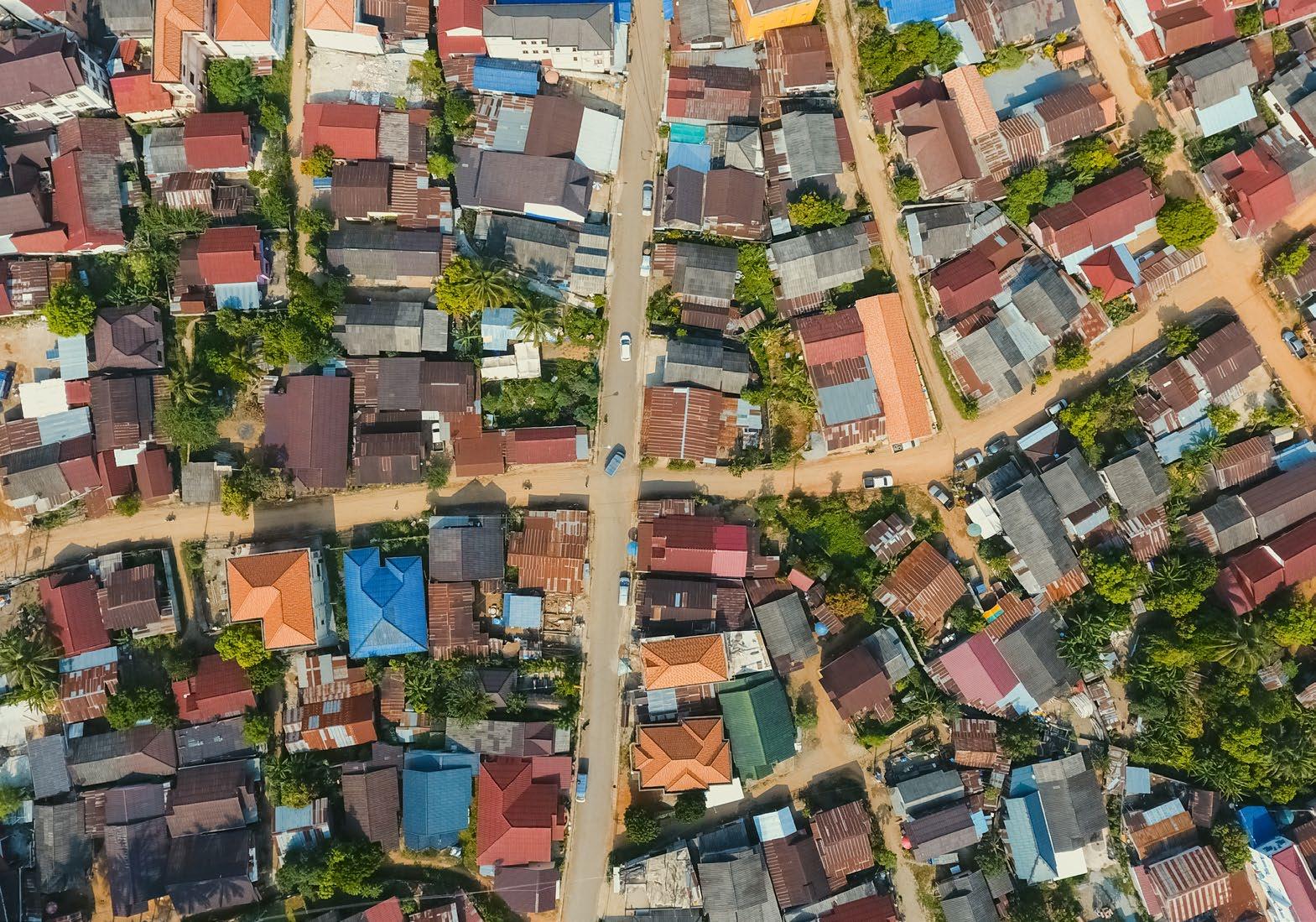
“The most important thing is how everything is connected to the internet. Especially when all the elements in the house, such as electronic devices, can be ordered via a smartphone. Therefore, the current property market share of
65% is millennials,” said former REI Chairman Paulus Totok Lusida Meanwhile, developers are also providing convenience in payments. “For example, we make it possible for them to pay interest first, for example for the first five years, then only after 10 years they can repay the principal. That way, they feel less burdened in terms of costs,” Lusida noted, adding that this is part of REI’s current mission considering that conditions in Indonesia are different from other countries.

Overcoming backlogs
Vice President Director of Bank Tabungan Negara (BTN), Nixon L.P Napitupulu, highlighted that 5.8 million millennials currently cannot afford to own a house, with a 79% housing shortage experienced by millennials who are in urban areas.

As a state-owned enterprise engaged in the banking sector to support housing sector financing, BTN has developed a housing credit programme to make it easier for the millennial generation to have their first home.
Napitupulu said that BTN has currently two flagship programmes. First programme is called Graduated Payment Mortgage (GPM), a tiered instalment system through a product called “KPR BTN Gaess.” “This product is indeed targeting the millennial generation where installment payments in the first few years are lighter,” said Napitupulu.
Second, BTN also launched “KPR Rent to Own” for people who have not been able to prepare a downpayment or who are hesitant to buy a house due to proximity to the workplace. “With this product, people can pay rent every month while at the same time allocating some of their savings for future home purchases,” Napitupulu noted.
In 2021, the KPR BTN Gaess programme sold up to 203 housing units to millennials. Meanwhile, until June 2022, the realisation of KPR BTN Gaess has reached 946 units, with a value of more than US$25.18m (IDR382b).
Meanwhile, for the KPR Rent to Own KPR product, which was released in the third quarter of 2022, BTN is targeting more than 1,000 registrants in the first year this product was launched.
REAL ESTATE ASIA 25
Developers are currently focusing on landed houses (Photo by tirachard from freepik)
SECTOR REPORT: RESIDENTIAL
Landed houses are the dominant search target, accounting for 76% of searches
INDONESIA
Nixon L.P Napitupulu
Mart Polman
SECTOR REPORT: RETAIL
Retail real estate rebounds as spending shifts from online to offline
More than 71% of retailers in Asia Pacific have expansion plans, according to CBRE retail survey.
The battle between online and physical retail outlets sways in favour of the latter in the Asia Pacific, as CBRE highlighted that fewer than 5% of consumers shop purely online.
In its 2023 Asia Pacific Retail Flash Survey, CBRE found that nearly half of the retailers in the region expect a portion of online spending to be shifted to physical retail and 42% see that footfall in physical stores will return to its pre-pandemic levels.
“One very important fact is that fewer than 5% of consumers purely shop online. There is a huge range of hybrid shoppers, who have different shopping behavior,” Ada Choi, CBRE’s head for occupier research and intelligence and management in APAC, told Real Estate Asia.

“This is also a challenge for the brands that have to cater to different shoppers’ behaviour switching between online and offline and be able to address those issues.”
New generation of physical stores

CBRE found in the same survey that operating online retail platforms are increasingly becoming expensive, driven by higher transportation costs, supply chain disruptions, and labour shortages. In addition to this, Google has increased its cost-per-click fee by 15% in 2021 which was particularly detrimental to smaller retailers.
For these reasons, 66% of retailers project that it would be costly to operate online businesses this year. Moreover, 71% of retailers are planning to expand or add new stores in 2023, whilst only 15% have plans to right-size.
“I think for the new generation of physical retail stores, they have to support online shopping, and fulfill other very interesting demand from the shoppers – Instagrammable or more social media-friendly kind of elements,” said Choi.
The CBRE survey also showed that whilst the younger generation is more tech-savvy, the majority of them are
more likely to shop offline as they represent the market that looks out for potentially creative social media posts.
Choi added that interestingly, 61% of shoppers in the region prefer to see products in-store before ordering online, which she linked to the more condensed living environment in the Asia Pacific. This is also higher than in Europe and the Americas – yet another proof that physical stores are here to stay, she said.
“It is easier for us to go to the shopping centres and take a look at the product… The reason for going to an offline store is always about expertise, the experience… and [because] they need to feel the product,” Choi said.
“I think this also makes it very important for the retailers to continue to optimise their sales network and be able to assess their consumers in different parts of the market,” she added.
Retail investment outlook
Physical retail stores have started to stabilise in the latter part of 2022, and investments in the sector have improved. Choi, however, noted investment sentiments in retail are still behind other sectors, such as the
office and industrial markets. In this light, CBRE projected a “largely flat” investment volume during the year. “There are quite a lot of uncertainties. For example, the volatility in the financial markets, and the concerns about the banking sector. This will also affect the investment sentiment as a whole and therefore also the retail investment,” said Choi.
“Another investment driver is the interest rate environment. As we note, the US has had the steepest increase in interest rates in the past year. At this moment, people are expecting the interest rate to peak within the middle of this year and if this happens, the sentiment will improve after we hit that peak. Let’s hope for this to come earlier,” she explained.
Retail investments have been led by markets that reopened their borders early on, including Australia, Singapore, and Japan. Japan is amongst the most preferred markets as it is not affected by highinterest rates.
Also, Hong Kong may be in the running as it rebounds after reopening alongside Mainland China, added Choi.
26 REAL ESTATE ASIA
Physical retail stores have started to stabilise in the latter part of 2022, and investments in the sector have improved (Photo by Christelle Bourgeois from Unsplash)
The reason for going to an offline store is always about expertise and the experience [to feel the product]
APAC
Ada Choi
HK must review valuations for successful land sales
Colliers estimates Hong Kong land revenue last year hit only 50% of target.
Hong Kong government has received a reality check regarding their land sales. Despite setting a revenue target of US$54b (HK$420b) under the 2021-2022 land sale programme, they managed to muster only US$219m (HK$71.7b). Hannah Jeong, head of valuation & advisory services in Colliers, said the factors that led to this failure boiled down to faulty valuation.

To ensure the success of Hong Kong land sales for 2023-2024, Jeong advised the government to reflect on market conditions in their valuations, given that developers, investors, and market players are under financial pressure due to interest rate hikes.
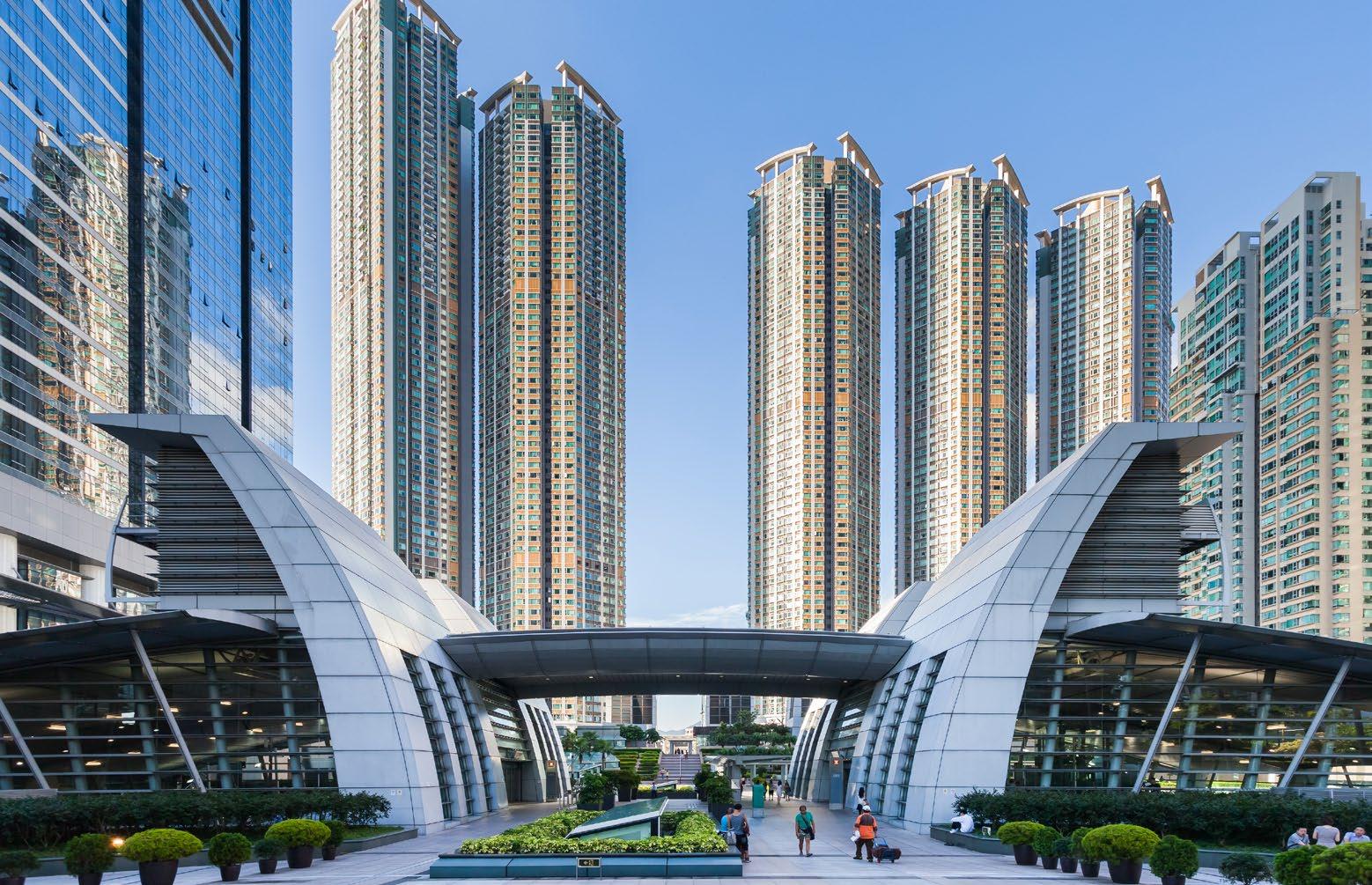
“Getting a new land with a significant billion dollars amount was not really an easy decision for many developers,” Jeong told Real Estate Asia. “I suggest that they have a discussion with different market players like surveyors, developers, and investors so that they understand (the sentiment).”
The Colliers expert cited the failed sale of the residential plot on Cape Road as an example of government valuations not matching with the market sentiment.
The gov't always has a reserve price and it has to be realistic
“The site is a luxury area, but it still has geographical challenges. Also, the interest hike was giving a lot of pressure into the luxury market, which is something not everyone can invoke. The government should reflect [on] these factors and make the reserve price more reasonable so that when bidders come in, they will be able to sell those land,” she explained.
“The government always has a reserve price and it’s not known in the market. It’s their own information. That valuation, reserve price, has to be realistic,” Jeong said.
KK Chiu, international director and chief executive for Greater China of Cushman & Wakefield, expressed the same sentiment and suggested that the government “review standard land price and bidding price to make sure they are on par with market situation.”
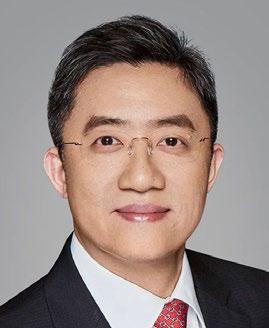
There are 18 plots under the 20232024 land sale programme, 12 of which are residential. Jeong pointed out that half of these residential plots are “rolling over from last year.”
“This means that the government’s KPI was actually only 50%. They didn’t sell as they promised,” she said.
Another view on why the government failed to meet its revenue target last year, said Jeong, is because the actual price at which the lots were sold are lower than the original estimation from the government.
In order for the Hong Kong government to successfully sell their plots, Jeong said it needs to “dispose of a site in a consistent manner based on their KPIs.”
Best plots
Amongst plots under the 2023-2024 land sale programme, three are likely to draw the most attention, said Jeong.
One of these is the residential site on Castle Peak Road, So Kwun Wat, Area 48, Tuen Mun, New Territories which is offering over one million square feet. The other two sites developers would be eyeing are at Yau Kom Tau, Tsuen Wan, in New Territories and Kai Tak Area 4B Site 5, Kai Tak, in Kowloon.
“The Tuen Mun and Tsuen Wan area traditionally have huge populations, and are well received in the local market. Last year, there were two successful land sales [in these areas], one bought by CK Asset Holdings in Tuen Mun. The site in Tsuen Wan was bought by Kerry Properties,” Jeong said.
Driving her point, she said: “These two sites [Yau Kom Tau and Kai Tak Area] are very close to last year’s land sales so they will receive a good response from the market.”
However, Jeong underscored that whilst the Kai Tak area offers a significant 1.13 million square feet, the site is located on a runway.
“The runway infrastructure is still not there. There are residents complaining a lot about [how] there is no monorail. Not enough public transportation, and not enough reach to go outside from the runway,” she said. That considered, Jeong thinks the site will not be well received in the market or would fetch a lower bidding price.
For 2023-2024, it is expected that 20,000 units will be brought in the supply pipeline, indicating the government’s “eagerness to make the supply and demand balanced” and make housing “more affordable,” said Jeong.
To read the full story, go to https:// realestateasia.com/
REAL ESTATE ASIA 27 COUNTRY REPORT: HONG KONG
The gov't must review standard land price and bidding price to make sure they are on par with market situation (Photo by Diego Delso)
KK Chiu
Hannah Jeong
How Metland Indonesia deals with weaker residential purchasing power
The real estate firm thrives in the challenging market with 'growing house' concept and sustainable designs.
The decline in purchasing power for real properties after the pandemic might be a great challenge for developers to overcome, but the desire of the Indonesian people to acquire housing remains strong.
According to Wahyu Sulistio, director of PT Metropolitan Land Tbk. (Metland), the complexity of the setbacks in the industry, from company layoffs to inflation and the rise in the cost of materials as a result of the conflict in Eastern Europe, housing remains one of the primary needs of Indonesians.
In fact, landed houses are still the pinnacle of the residential market, said Sulistio. The Metland executive explained that landed houses have an advantage because they embody the concept of a growing house, where consumers can add space as needed.
His insights are well aligned with the findings of the house search site, Lamudi.co.id, which noted an increase in online property searches of 9% at the end of 2022, despite the highinterest rate set that was announced by Bank Indonesia. From these findings, landed houses are the dominant search target with 76% of search data from June to December 2022.

“Then the question is how to deal with high demand with reduced purchasing power? So what we are doing is adjusting so that we can deliver more affordable products targeting the middle, lower middle, and slightly upper middle segments,” Sulistio told Real Estate Asia.
Metland’s strategy
Mindful of the financial circumstances of its consumers, Metland has implemented a strategic approach to address their needs in particular development areas. The company has designed products with lower selling prices, based on the fixed monthly incomes that many of its customers make as employees.
“First, we made a compact building with enough room that the occupants could renovate in the future. The compact building keeps the selling price affordable,” Sulistio said. Some of the property products offered by Metland include residences with an area of LB30/LT60 square meters and LB35/LT72 square metres.
The company never loses its concept of a growing house in its projects. As a result, even though the building area is small, residents can add space up and to the side at a more affordable price.
Because most of Metland’s consumers use the housing mortgage or Kredit Pemilikan Rumah (KPR) system in obtaining housing, the company also provides convenience from down payment (DP) installments and DP subsidies, to several promos such as free land acquisition taxes or Bea Perolehan Hak atas Tanah dan Bangunan (BPHTB), deed of land sale and purchase or Akta Jual Beli (AJB), and KPR provisions.
Besides providing convenience in making payments and trying to provide affordable products, Metland also offers various facilities to attract consumers. Sulistio said Metland
provides public facilities for residents in order to carry out outdoor activities, set up a clubhouse, and be close to F&B shops. Each house is also designed with a multi-purpose room that can be a place for residents to work in response to the current work from anywhere trend.
In addition, it offers facilities in the form of access to public transportation modes such as commuter lines. One of its housing estates, the Metland Cibitung in Bekasi, West Java, is positioned as such, making it easier for residents to do activities that require them to commute.
Metland Cibitung also epitomises the Metland principle of sustainability by having a plastic waste processing facility. “We have also prepared a Water Treatment Plant and we have also applied lamps using solar cells and eco-friendly building materials in our housing, such as in Metland Cibitung and Metland Cikarang,” Sulistio explained. Another facet of Metland that attracts consumers is its innovative sales through advertising promotions and digital marketing strategies on social media such as YouTube, Twitter, and Instagram. “This marketing is quite effective in increasing Metland’s brand awareness, but transactions are still commonly done face-to-face because buying a house is a long consideration that involves many family members,” added Sulistio.
28 REAL ESTATE ASIA INTERVIEW
We made a compact building with enough room that the occupants could renovate in the future
Wahyu Sulistio, director of PT Metropolitan Land Tbk. (Metland)
INDONESIA
SCAN FOR FULL STORY
Ohmyhome eyes sector and market expansion post-Nasdaq debut
CEO Rhonda Wong brings properties vision ‘to be there for everyone’ from Singapore to the world.
When sisters Rhonda Wong and Race Wong started Ohmyhome in 2016, their first goal was to provide Singaporeans a trusted avenue to buy, sell, and rent out their homes. Little did they know that seven years later, they would make history as the first women-only founded proptech to list in the United States and the first to do so in 2023.
In an interview with Real Estate Asia,, Rhonda Wong said the Nasdaq listing will help Ohmyhome achieve two of its goals: to double down on their technology and expand service offerings to more markets.

“We have to continue investing into building the latest state of the art technology to ensure that we will have the best services, and we can continue to lead the future of PropTech,” the Ohmyhome CEO said.
“We’re constantly building new tech features. We want customers to have faster and more streamlined updates about their property. So that could be about the valuation of their mortgage, when they should sell their homes, how the market is doing in terms of transactions, listings, asking prices. These are some of the things that we’re working on, that we will be launching in the near future,” she shared, adding that it is important for Ohmyhome to provide a very seamless transaction experience for their customers.

On expanding markets, Wong said they hope to also serve customers in Southeast Asia, and across the globe. Other than Singapore, Ohmyhome has services in Malaysia and the Philippines.
Wong, however, shared that whilst they have received a lot of interest from around the world following the IPO, they will be focusing on their core markets at the moment.
She also underscored that solutions will vary per market, and what works for Singapore, may not work for homebuyers elsewhere in Southeast Asia.
In Singapore, Wong said she wants Ohmyhome to serve more than just homebuyers.
“The market opportunity is very large and growing. (The) IPO definitely assisted us with having more brand awareness to quickly now talk to more partners,” she said.
“We’re actively looking to expand not just in different countries, but also across different sectors of the market. Right now in Singapore, we’re serving HDB private transactions as well as landed transactions. There’s a lot more room that we can grow and serve, in terms of number of customers, in terms of percentage of market share. These are the immediate plans that we will be taking care of right now that the big busyness with the IPO has settled down,” she added.
Building long-term value for shareholders
Seven years after its inception, Ohmyhome has transacted over 11,600 homes and has achieved a gross transaction value US$2.5b (SG$3.3b).
With these figures and their track record, Ohymyhome gained strong interest from investors, which boosted their
We want customers to have faster and more streamlined updates about their property
confidence about debuting in Nasdaq. “If you ask if we’ve been worried, of course. When people keep saying the (IPO) market isn’t doing very well, it makes us think, ‘oh, okay I guess maybe it’s not the best time,’ because people keep saying that. But now that we have done the listing, our stock price has been doing well and the liquidity is strong. I think it further attests to the confidence that the market has in Ohmyhome and I’m happy about that,” Wong claimed.
With strong confidence from investors, Wong said they never thought that the market was not in their favour.
Wong stated that their investors likewise don’t have to worry about Ohmyhome amidst an uncertain economic environment, given that the company runs in a sector that is not sentiment driven but need driven.
“When it comes to the property market, during a cyclical market, whether it’s a fluctuation, whether it’s volatility, what you generally see is the change in the price of the property. But the transactions of the property when it comes to the mass market, they don’t change a lot. The reason is because selling and buying a home, for most people in Singapore, is due to a change in their life. We’re talking about getting married, having children, moving (closer) to schools,” Wong said.
“Now, of course, we see differences. That means, when times are good, people are buying larger homes. But when times are not that good, people are just basically getting homes that they can afford at that time. These are also times when actually we find that our customers require better solutions,” she added.
REAL ESTATE ASIA 29 CEO INTERVIEW
SINGAPORE
SCAN FOR FULL STORY
Ohmyhome will continue investing into building the latest technology to ensure it can continue to lead the future of PropTech (Photo: Rhonda Wong, CEO, Ohmyhome)
Addressing the elderly housing gap could ease HK's broader residential crisis
JLL warns that the city could face a potential shortage of elderly places by 2032.
Hong Kong will have a shortage of necessary infrastructure for its elderly population, which will hit 2.2 million by 2023. To address this impending issue, Hong Kong must build around 6,000 more elderly residential places annually for the next 10 years.
Tom Parker, institutional clients director of Value and Risk Advisory at JLL Hong Kong, said the city currently only builds 30,000 to 40,000 elderly places yearly.

“To be able to build 6,000 additional senior residential places each year will be a rather significant challenge and may not be possible, but by aiming towards that, at least we can go some way towards tackling the problem,” Parker told Real Estate Asia
“We’ve got a really big gap at the moment in terms of how much elderly housing we have available. That's a gap that we really need to start to bridge in order to develop the sector further and provide suitable housing for our senior population,” he added.
Currently, Hong Kong also only has 39 elderly places for every 1,000 senior residents which is one of the lowest ratios amongst developed markets. In other developed markets, the ratio is 60 to 70 every 1,000 residents.
A solution to a decades-old problem?
Parker acknowledged that addressing the needs of the senior population can relieve some of the pressure that Hong Kong faces overall in terms of its housing shortage.
“If we fail to address the shortage, then ultimately, the biggest risk is we will further exacerbate our existing housing crisis,” he said. “We can help to relieve a lot of that strain on the housing shortage by creating or building more senior living facilities, building more elderly homes, as the current housing shortage ultimately impacts upon the competitiveness of Hong Kong.”
The JLL expert said that elderly residents globally want accommodation or facilities which are more suited to their needs and which can create a sense of community.
“At present, elderly residents who may wish to move into such a facility may not be able to do so because the facility doesn’t exist or because there’s no space in the existing facilities. So what we ended up with was a large number of private and public housing, which continues to be occupied by elderly residents,” Parker said.
“Rather than [public and private] housing coming back onto the mass market to create further homes for families and young people, we ended up with a large amount of our existing housing stock being tied up with a population for whom that housing stock may not be best suited,” he added.
Aspirational living
In terms of location, Parker said developers can consider Kwun Tong and Tuen Mun especially for traditional elderly housing, otherwise known as nursing homes or residential care homes for the elderly in Hong Kong. Parker, however, underscored that there’s a demand for
elderly housing across most of Hong Kong at the moment. For Senior Living developments, which often target the wealthier senior population, the best locations would be Hong Kong Island and Kowloon Tong.
Senior Living is a concept of providing “aspirational” housing for the elderly population. “The idea of senior living is to provide something, which is more attractive to the senior population. Some of the features that really set senior living apart can be items such as flexible medical care,” Parker said. Other features that senior living places have include leisure facilities such as cafes and restaurants, or cinemas and gyms.
“[Senior Living] is all about making space in which the elderly population can come together within a senior living facility and really spend quality time to get that sense of community,” Parker explained.
“We’re also seeing a lot in the way of the adoption of technology within senior living facilities globally. That can range from technology, which measures the overall air quality and temperature within a flat to technology that can check slips and trips within a flat and check the residents vital signs to make sure that they’re healthy,” he noted.
Parker reiterated the importance of building special facilities that will meet the elderly's needs, saying that with these places Hong Kong can free up some accommodation and somehow address the city’s housing crisis.
30 REAL ESTATE ASIA INTERVIEW
If the housing crisis is left without solutions it will eventually erode Hong Kong’ overall competitiveness
HONG KONG
Tom Parker, institutional clients director of Value and Risk Advisory at JLL Hong Kong
How CapitaLand Investment retains stakeholders’ trust
CSO talks on ESG pillars to meet the company’s net-zero goals whilst keeping stakeholders on board.
With a refreshed 2030 Sustainability Master Plan, CapitaLand Investment (CLI), an SGX-listed firm, is set on elevating its ESG goals and delivering sustainable returns to its stakeholders. As such, CLI is committed to ensuring transparent reporting, with a dedicated Strategy and Sustainability committee, and making sure that the ESG agenda is part of their business.
Vinamra Srivastava, CLI’s chief sustainability officer (CSO), disclosed that their reporting complies with worldwide standards such as the Global Reporting Initiative, Sustainability Accounting Standards Board, and Taskforce on Climate-related Financial Disclosure.
As a result, Srivastava said the company gets listed on global benchmarks such as GRESB MSCI, and the Dow Jones Sustainability World Index, which identifies global sustainability leaders.
“We’ve got a Strategy and Sustainability Committee at the board level, which oversees the entire strategy and execution of our sustainability initiatives. Then at each of the business units, we’ve got a very strong sustainability structure,” Srivastava told Real Estate Asia in an interview when asked how his company deals with the risks of greenwashing.
To build a culture of sustainability across the board and all business units, Srivastava said they are introducing multiple sustainability roadshows, brown bag sessions, and sessions from industry experts to promote awareness to their staff about CLI’s Sustainability Master Plan and sustainability targets.
Aside from this, the company has learning and development training for its employees. So far, they have completed over 370,000 training hours in 2022, with more than 83% of their staff attending at least one ESG training.
Srivastava said sustainability is integrated into their business and balanced scorecard through which the sustainability targets are tied to the key performance indicators and remuneration of its top management and staff. He added that CLI’s sustainability efforts are aligned with globally recognised standards and included in the company’s decision-making and long-term planning processes.
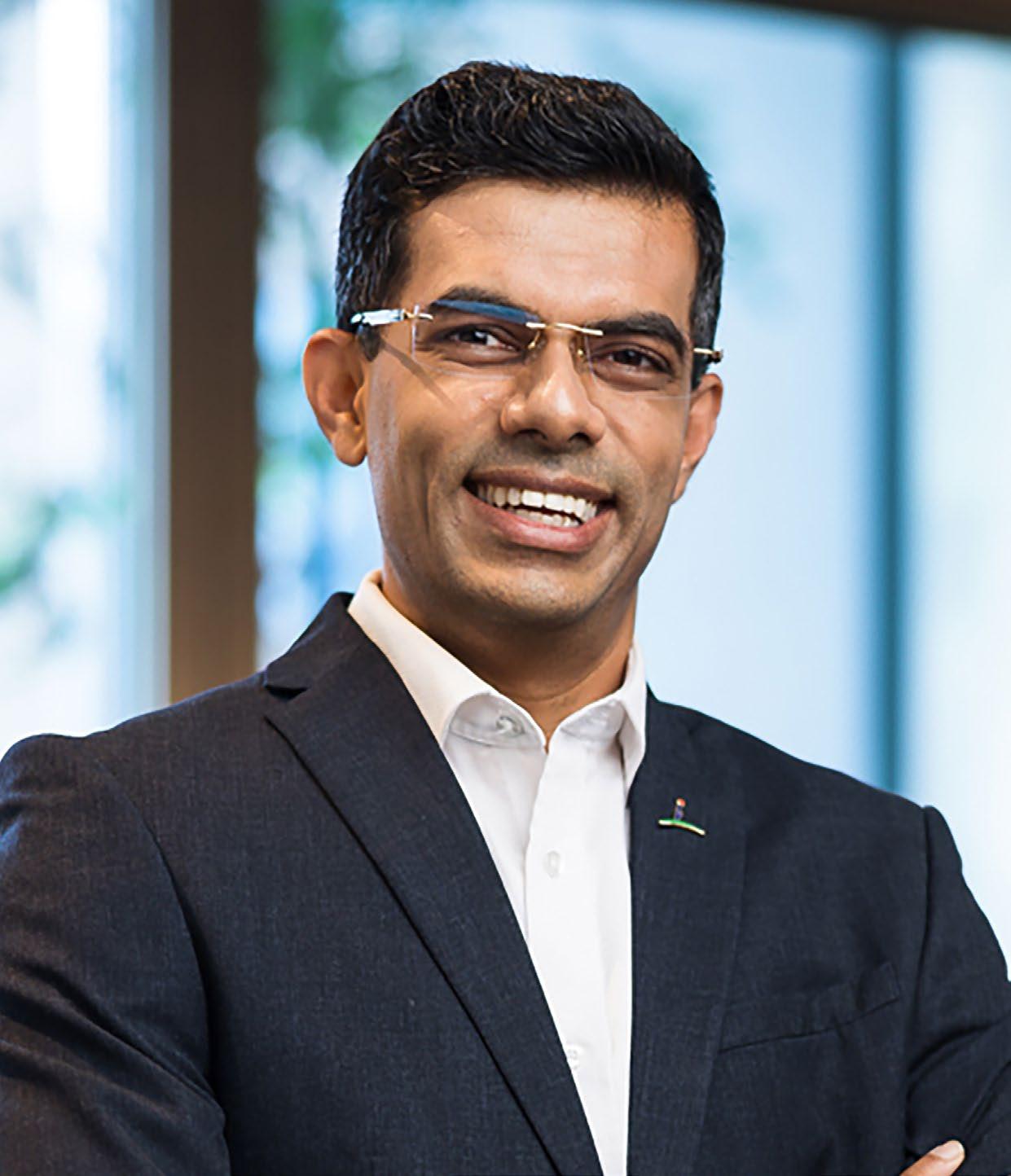
“There are good internal checks and balances to make sure we are on the right track. You’re only communicating what is real and factual, which can be measured objectively and keep moving forward,” he explained.
Pillars of sustainability
The CLI’s 2030 Sustainability Master Plan includes three pillars to align the company’s net zero goals and its increased social and governance focus.
Srivastava said the first is to build a resilient and resourceefficient real estate portfolio. The goal is to accomplish the company’s environmental target, particularly reducing the scope one and scope two emissions by 46% by 2030.
To do this, Srivastava revealed that they plan to increase renewable energy (RE) by 45% of its entire portfolio by 2030. For RE, they are already maximising onsite
There are good internal checks and balances to make sure we are on the right track
renewable energy deployment through solar panel use in properties and micro wind turbines that can be installed on rooftops of properties, he said.
“We are maximising getting into long-term power purchase agreements with offsite, solar, wind, and hydro providers so that we can secure a long-term commitment to procure green power from these sources because on-site solar or other options can only give you so much,” he added.
The second pillar is to create a thriving and future adaptive community, and one example is CLI’s effort to have a more inclusive workplace. The company is looking into achieving at least 40% female representation in senior management by 2030, Srivastava said.
“We treat everybody equally and give them equal opportunities. We want to do that because, especially in an organisation like ours, having perspectives that represent different backgrounds and different lenses of looking at the same issues provides us with a much more robust input when making business decisions,” the CSO added.
The final pillar is stewarding responsible business conduct and governance. It focuses on how the company upholds strong corporate governance regarding sustainability.
REAL ESTATE ASIA 31
SINGAPORE SCAN FOR FULL STORY
Vinamra Srivastava, chief sustainability officer of CapitaLand Investment (Photo by CapitaLand Investment media team)
INTERVIEW
Here are Singapore's most notable real estate agents under 40
Global economic conditions, cooling measures, and rising prices failed to wither Singapore’s attractiveness towards Asia’s wealthiest and property investors around the world.
The strong appeal of Singapore’s real estate market extends beyond the political stability and exceptional infrastructure. The market also owes its charm to realtors who elevated the local market to a paramount position.
This year, Real Estate Asia recognises 20 real estate agents who helped polish the Lion City’s crown as a haven for property investors. Agents on the list have thrived in negotiating multi-million and billion-dollar deals in the residential, commercial, retail, industrial, and investment markets.
Amongst clients handled by this year’s awardees include VISA, Phillips, Coffeebean, Cornerstone Global Partners, Hitachi Vantara, SAP, Fortinet, and Vantage Data Centres.
Here are this year’s awardees from youngest to oldest.
After obtaining a Real Estate degree from NUS, Celine Koh excelled as a capital markets and investment sales agent, handling multi-milliondollar properties and billion-dollar en bloc deals. Joining OrangeTee in 2019, she focused on asset management and commercial real estate, specialising in shophouses, retail, and offices. She earned her recognition, ranking in the Top 10% achievers in 2019 and Top 5% in 2020. Celine received the prestigious Top Retail Leasing Award and SEAA 2022 Outstanding Youth award, solidifying her spot in OrangeTee’s Top 3% achievers and establishing her prominence.
During her five years at Savills, Ng Wan Ping, associate director of Commercial Leasing Team, closed 100+ deals totaling US$99.7m, earning the 2022 top broker title. Notable deals include Bank Julius Baer’s 75,000-sq ft office relocation and a 222,000-sq ft warehouse transaction. With her seven-year experience, she excels in leases, tenancies, and JTC policies. Transitioning to the private sector, she bridges tenant-landlord gaps, gaining trust from MNCs like VISA, Phillips, and Coffeebean. A respected leader, she fosters teamwork, mentors, and garners admiration from colleagues and bosses.

Jaden Shi, a rising star at Huttons, achieved remarkable success in just 3 years. His commissions steadily increased, reaching over US$300,000 in February 2023. He earned accolades as Top Millennial and Top 3 Producers in Huttons in Q1 2023. Jaden also excels in gaining leads and managing properties for high-net-worth clients. His commitment to excellence exceeds client expectations, leading to referrals from HDB and GCB listings. Eager to learn and fostering good relationships with colleagues, Jaden continues to shine in the real estate industry.


As director at Savills Investment Sales & Capital Markets, Sophia Lim specialises in mid-market assets and has transacted over US$439m in this segment since 2021. Notable deal includes the US$16.94-m hotel in Geylang. Sophia’s expertise also shines in office strata sales, achieving a record-breaking US$2,400 per square foot for a single floor at Suntec City Tower 2 with a total of US$30.2m. She offers valuable advice to property developers, private funds, family offices, high-networth individuals, staying ahead of market trends.


, senior manager of Industrial and
Tyrese
Singapore, boasts eight years of cross-functional experience in asset management, lease management, and brokerage. In 2022, he brokered a notable 1 million-sq ft industrial space lease. Over three years at Savills, Tyrese completed 40 deals worth US$126m, representing major industrial occupiers like Medtronic and Daimler Group. He also worked with major international and local developers. His approachability fosters strong relationships with asset owners, developers, and REIT managers.
32 REAL ESTATE ASIA
REAL ESTATE LUMINARIES: SINGAPORE
Low
Logistics at Savills
1 Celine Koh 29, Orange Tee
2 Ng Wan Ping 30, Savills
3 Jaden Shi 31, Huttons Asia
4 Sophia Lim 32, Savills
5 Tyrese Low 33, Savills
Nazri Baobed is an accomplished real estate professional with an exceptional track record of achievements. As a recipient of multiple ERA Asia Pacific Elite Awards, including 2022, 2021, and 2020, he has consistently demonstrated his excellence in the industry. His impressive achievements also include being recognised as an ERA Rising Millionaire in 2022 and 2021, as well as coming in 73rd amongst ERA’s Top Achievers in 2022. His expertise in HDB resale transactions is impressive, securing top rankings as one of the Top 3 Resale Achievers for HDB transactions and commissions in 2021 and 2020. His outstanding performance has consistently earned him a position amongst ERA's Top 50 Achievers.
With a strong belief in delivering exceptional customer service, Javen Soh is dedicated to ensuring a seamless user journey for his clients. He stays ahead of the curve by providing up-to-date market information and offering expert advice tailored to each individual’s unique needs. Javen’s commitment to excellence has earned him well-deserved recognition. Since 2019, he has been receiving the prestigious annual top project tagger award and monthly top project tagger award highlighting his outstanding performance. Javen is a regular name on ERA’s esteemed Top 50 Achievers list, showcasing his consistent success and exceptional achievements.
Joan Chua has consistently attained top rankings and prestigious accolades. In 2022, she secured a remarkable 32nd position amongst ERA’s Top Achievers. To date, Joan's unwavering commitment has enabled her to be a Diamonds by ERA recipient 9 times, a distinction earned by realtors achieving six-figure commissions in a single month. She also excelled in project sales, securing the titles of Top Project Achiever and Top Project Transactor in July 2022. Joan’s astute investment skills are evident, as she personally acquired two properties last year, a newly launched two-bedroom condo, and a landed property, showcasing her aptitude for wealth creation.


As a PropNex Millionaire from 2020 to 2022 with over 10 years of experience, Linda Yang stays relevant by keeping an open mind, using a statistical approach, and staying connected with clients. Adaptability, clientfirst mentality, and transparency are vital for her success. Her 2023 goals include breaking into new market segments, doubling her team’s strength at Linda Yang & Associates (LYA), and empowering more families to fulfill their property dreams. Linda believes in honesty, integrity, and building long-term client relationships for sustained success in the industry. Her advice: “This is a marathon, not a race,” a quote that resonates greatly with her passion for her craft.
Julian Li is a rising millionaire at Huttons, achieving rapid success since joining as a part-timer in 2019 and transitioning to a fulltimer in 2021. His effective communication and engineering-trained practical mindset help him connect with diverse clients and efficiently resolve their property-related issues. Julian handles various transactions, from room rentals to commercial properties, with equal passion. Besides being a top producer, his inspiring personality and leadership have led to a strong team of over 20 individuals, multiple top recruiter awards, and three promotions from marketing manager to district director. He selflessly shares his experience to help his teammates thrive.

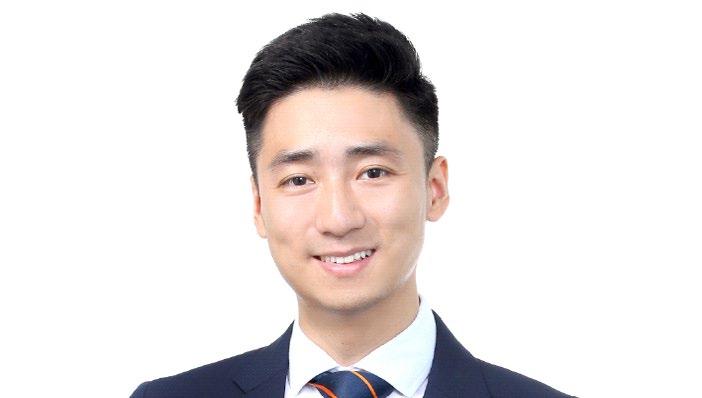

Kevin Chia embarked on a real estate career in 2013, driven by financial success. Despite challenges, he persevered, taking on diverse projects to gain experience. Kevin specialised in commercial real estate, particularly HDB shophouses, recognising limited competition in the niche. Trust from customers grew through word-of-mouth and door-to-door efforts, earning him recognition amongst the top 150 agents in four years. He excelled in retail leasing, winning consecutive champion awards from 2015 to 2021. Kevin’s expertise in HDB shophouses solidified his reputation as a trusted advisor. He prioritises seamless experiences and dedicated work, earning him prestigious awards.

REAL ESTATE ASIA 33
REAL ESTATE LUMINARIES: SINGAPORE
6 Nazri Baobed 33, ERA Singapore
7 Javen Soh 35, ERA Singapore
8 Joan Chua 35, ERA Singapore
9 Linda Yang 35, PropNex
10 Julian Li 36, Huttons Asia
11 Kevin Chia 36, Orange Tee
REAL ESTATE LUMINARIES: SINGAPORE
Johnny Chia, an esteemed leader in commercial real estate at OrangeTee, discovered his passion for the property industry after university. He consistently ranks as a top achiever, securing positions in the Top 10 Achievers and Top 50 Achievers for three consecutive years. Johnny excels in retail leasing, winning multiple yearly Top Retail Leasing Champion awards. His outstanding accomplishments earned him the Emerging Millionaire Award in 2021 and 2022, as well as the SEAA Salesperson Achievement Award (Platinum) in 2022. Started with a small database, his proactive approach, personal interactions, and dedication led to remarkable success and long-lasting client relationships.
Meet KS Tan, a real estate virtuoso with nearly 13 years of experience. Starting right after National Service, he challenged the status quo, becoming an industry leader. His in-depth analysis of real estate trends and dedicated research team guide clients to financial success. With the ability to reframe common mindsets and forecast exit strategies, he empowers clients to maximise their investments. Growing up in a modest background, KS understands the value of dedication and grit, driving his dream to help clients reimagine real estate and build lasting portfolios together. Clients view him as a coach, mentor, and friend, making him a notable agent in this list.
Matthew Tan has established himself as a seasoned realtor with a sharp eye for numbers. With a decade of industry experience, he has a deep understanding of the real estate market and provides his clients with invaluable insights, guidance, and savvy negotiation skills. Through his dedication and personalised approach, he has grossed more than US$700,000 in sales commission each year in 2021 and 2022 and regularly makes it into ERA’s Top 50 Achievers list. His exceptional track record is a testament to his unwavering commitment to excellence and his ability to consistently exceed client expectations.

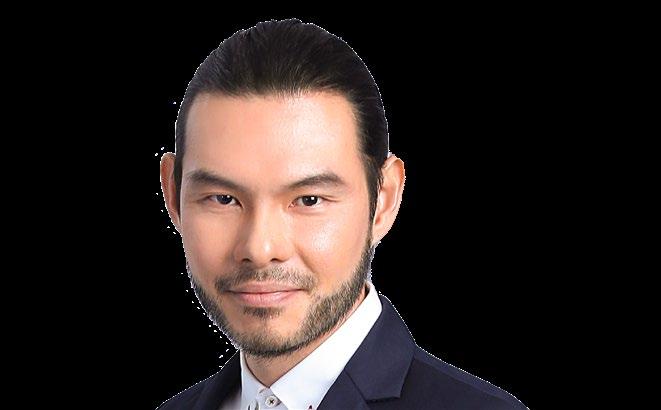

Yeo Khim Kieng joined OrangeTee in 2012 to seek work-life balance after having her second child. Her determination and selflearning abilities stood out as she navigated diverse clientele, primarily business owners. Khim ensured accuracy by verifying intricate details of various trades and prioritising honest and reliable relationships with each client. She maintained a consistent top 10% performance, earning recognition from the Southeast Asia Property Awards (SEAA). Khim's tenacity, adaptability, and innovative problem-solving set her apart as a trailblazer in the industry, working with clients from diverse backgrounds and ensuring growth in her career.
Lindy Lim's impressive client portfolio includes industry giants as well as notable organizations. Her exceptional capabilities as a trusted advisor and reliable partner are evident. Notably, Lindy's remarkable work is seen with her prompt response, proactiveness, and meticulous follow-up. Lindy's ability to understand and anticipate her clients' requirements sets her apart as a true industry leader. Lindy's hard work, dedication, and strategic approach as a Tenant Representative make her a deserving nominee. Her relentless pursuit of client satisfaction, negotiation skills, and longterm vision set her apart as an industry leader, inspiring others in the field.
As senior manager of the International Residential Services (IRS) Team at Savills Singapore, Rachel Ho specialises in international residential properties. In her 4 years at Savills, she closed 47 deals worth US$62m. Despite challenges during COVID-19, she secured US$18.4m-worth of deals in her first two years and US$29m in her third year. She is also an IRS team spokesperson, showcasing developments and conducting webinars. Her 12 year-experience with Singapore Airlines as Leading Stewardess provides excellent customer service skills and cross-cultural sensitivity, enhancing her ability to handle international projects and high-calibre clientele.



34 REAL ESTATE ASIA
12 Johnny Chia 36, Orange Tee
13 KS Tan 37, ERA Singapore
14 Matthew Tan 38, ERA Singapore
15 Yeo Khim Kieng 38, Orange Tee
16 Lindy Lim 38, Colliers
17 Rachel Ho 39, Savills
REAL ESTATE LUMINARIES: SINGAPORE


Henry Chia, a proactive account manager and leader, anticipates clients’ needs, addresses challenges, and strategises for success. His impressive portfolio includes industry giants such as Microsoft, Oracle, Nestle, and Munich RE. Managing 10M+ sq ft corporate portfolios in the Asia Pacific region, his expertise in transaction management, strategic planning, and account management consistently delivers outstanding results. He earned recognition with the Sachin Segal of Colliers award in 2021 for exemplary performance, leadership, collaboration, and agility. Henry’s dedication to exceptional results and leading by example makes him a deserving recipient of this prestigious accolade.
Ben Xia is a millionaire and the 2nd Top District Director at Huttons for 2022. His diverse portfolio includes HDB, private residential, new project launches, and commercial sales and rentals. As a senior district director, he leads a team of 66 agents, many of whom are new. In 2021, he completed 79 deals, followed by 66 in 2022 and 47 so far in 2023, consistently earning Huttons’ monthly top producer awards. Ben is highly adaptable and showcased exemplary leadership by sealing deals electronically during the Circuit Breaker period. Notably, he assisted buyers in securing units at The Pier @ Robertson and Waterbank at Dakota, applying great customer service at all times.

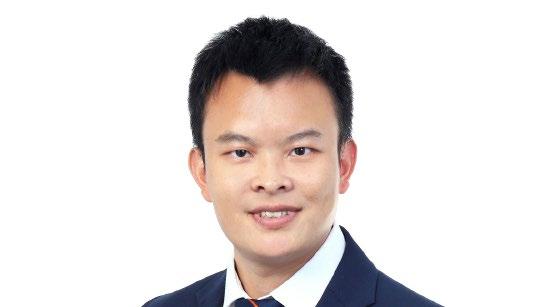
Donald Lin, a promising agent at OrangeTee, made his mark despite being relatively new to the industry, joining less than two years ago. With prior experience as a mortgage banker, he switched to real estate in November 2021, driven to carve his own path. Donald focuses on new launches, attracted by the capital appreciation opportunities. He values building strong client relationships, offering databacked analysis and sound advice. Because of his hard work and support from mentors, Donald won accolades such as Top Project Rookie 2022 and Top Resale Rookie 2022, and ranked in the Top 5% Achievers list. He aims to continue growing and dreams of building his own team one day.
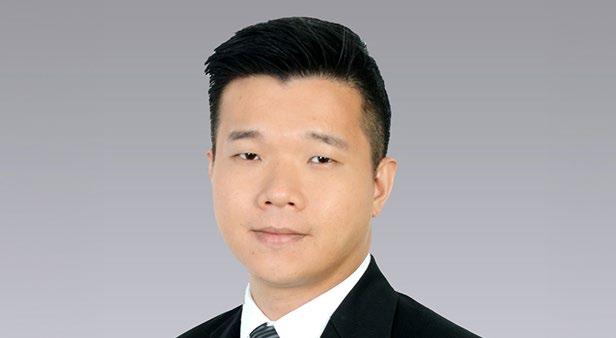 18 Henry Chia 39, Colliers
19 Ben Xia 39, Huttons Asia
20 Donald Lin 39, Orange Tee
18 Henry Chia 39, Colliers
19 Ben Xia 39, Huttons Asia
20 Donald Lin 39, Orange Tee
REAL ESTATE LUMINARIES: HONG KONG
Here are Hong Kong’s most notable real estate agents under 40
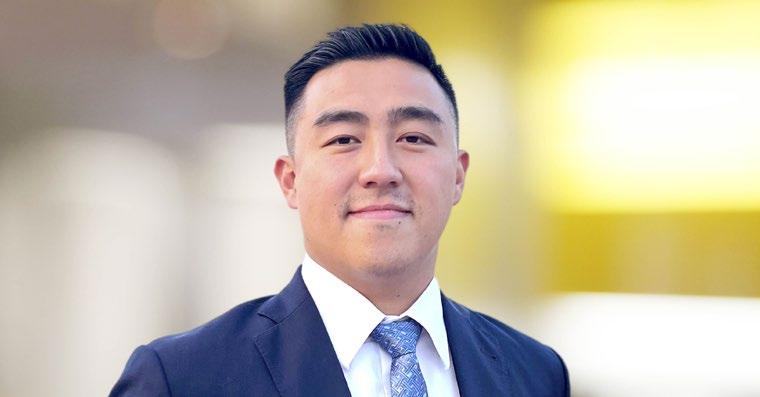
2023 was not a year without challenges for Hong Kong’s real estate market. Rising interest rates and a decelerating recovery in Mainland China impeded its road to recovery.
Despite such setbacks, the city’s property market managed to rebound after reaching its lowest point.
This year, in honour of this resilience, Real Estate Asia lauds 20 real estate agents who have risen to the challenge and helped lift the market against downward pressures.
Agents on the list have thrived in negotiating multi-million and billion-dollar deals in the residential, commercial, retail, industrial, and investment markets.
Clients represented by this year’s awardees include HSBC, Huatai Financial, Peak Re, FedEx, Viva Properties, AEON Credit, NEO, and Love, Bonito.
Meet this year’s awardees, from the youngest to the oldest.
Philip Lam, the Savills’ senior manager on the Retail team, excels in guiding clients through Hong Kong’s retail market challenges. During COVID-19, Philip’s focus on local consumption led to the success in suburban deals, helping F&B businesses thrive. His international network and collaboration with other offices have secured major deals, including Love, Bonito’s 14,000-sq ft flagship at Windsor House. His versatility extends to anchor tenant deals, advising on positioning and strategy for retail developments. Philip’s resourcefulness and expertise have contributed to his outstanding success.
Fionne To is the youngest director at JLL Office Leasing Advisory with eight years of experience. She has advised on over 2 million sq ft of transactions, generating revenue of over US$1.9m since 2020. Her expertise includes landlord representations, restructures, and rent reviews. Notable deals include a 60,000-sq ft surrender transaction, 100,000-sq ft rent review, 300,000-sq ft bank consultancy, and a 1 millionsq ft new development advisory project. Fionne actively mentors and is part of JLL’s Women and Allies Network, promoting gender equality and supporting young female leaders.
Karis Wong, a senior manager at JLL Office Leasing Advisory Team, has excelled for eight years with over 2 million sq ft in 240 transactions. Her expertise covers project leasing, tenant representation, and advisory services. Notably, she assists key occupiers, including MNC financial institutions leasing in ICC, Two Harbour Square, and Two Taikoo Place, totalling 750,000 sq ft. Additionally, she serves as marketing agent for over 1.9 million sq ft in newly completed Grade A office developments. Karis’s commitment to providing professional advice has made her a valuable asset to the firm and its clients.


Zac Wong is a director in CBRE Capital Markets. With exceptional collaboration skills, he became the youngest director at age 27. Zac earned the Excellence in Office Services award in 2021 and was a Top 20 Performer in Hong Kong in 2021 and 2022. He fearlessly switched from Office Services to Capital Markets during the COVID-19 downturn, achieving a personal record of 57 transactions and 32 new clients in a year. As director, Zac provides property sales and acquisition services for developers, private equities, and local investors, utilising his surveying knowledge for strategic investment plans. Zac also enjoys mentoring new joiners and Graduate Trainees at CBRE.
Bevis Lo, a director in CBRE’s Office Leasing Team, specialises in strategic advisory for occupiers in Hong Kong. Joining as a Graduate Trainee, he later excelled in Tenant Representation, handling over 30 transactions annually. His expertise covers lease renewal, new letting, rent review, and more. As one of CBRE Hong Kong’s Top 20 Performers in 2021, Bevis was promoted to director at 28, mentoring new graduates and junior brokers. Notable transactions include HSBC’s Hong Kong Portfolio and Huatai Financial’s lease acquisition. He collaborates with CBRE Asia Pacific in providing comprehensive advisory services to maintain CBRE’s competitiveness.
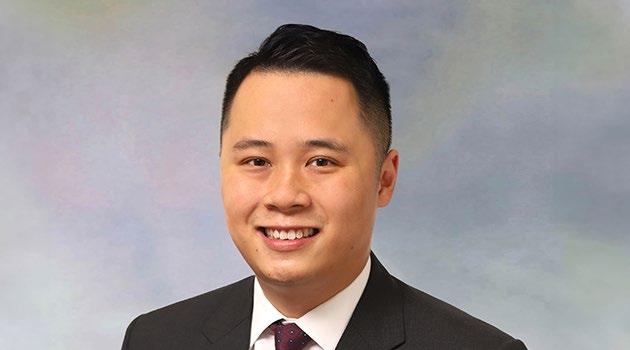

36 REAL ESTATE ASIA
1 Philip Lam 28, Savills Hong Kong
2 Fionne To 29, JLL Hong Kong
3 Karis Wong 29, JLL Hong Kong
4 Zac Wong 30, CBRE
5 Bevis Lo 30, CBRE
REAL ESTATE LUMINARIES: HONG KONG
Ryan Cho, the youngest associate director at Cushman & Wakefield (C&W), specialises in strategic advice for MNCs and PRC occupiers. Since joining as a Graduate Trainee in 2016, he has achieved US$1.9m in sales revenue with an annual growth rate of over 35%. Notable deals include office expansions for a leading consultancy firm at The Millennity (40,000 sq ft) and 12 Taikoo Wan Road (25,000 sq ft). He also represented a regulatory body acquiring 35,000 sq ft at Two Taikoo Place. Ryan’s mentoring of graduate trainees and junior brokers reflects his leadership qualities. His commitment, forward-thinking attitude, and passion for real estate set him apart as a true leader.

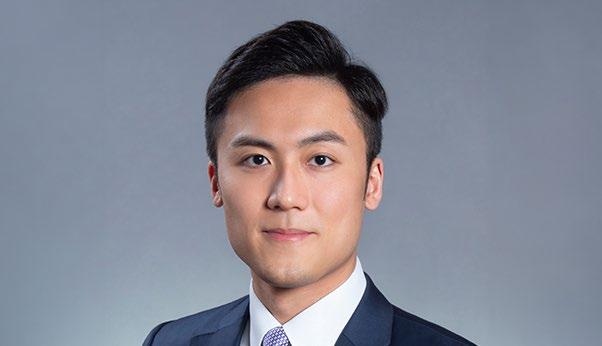
Conrad Fong, Savills’ senior manager, is a leading figure in commercial property lettings. With a focus on clients’ interests, cost-effectiveness, and sustainability, he has achieved 130,000 sq ft of Class A commercial lettings in recent years. Despite pandemic challenges, Conrad’s resourcefulness settled impressive lettings. He excels in coordinating innovative office solutions, like Peak Re’s move to West Kowloon Cultural District’s creative hub and a 7,000-sq ft unit with stunning views in CCB Tower. Conrad’s adaptability extends to successful retail leasing for F&B groups, like NOC Coffee’s 6,000-sq ft space tailored to nomadic work culture. His dedication has earned the trust and respect of his clients.
Zeith Lo achieved director status within six years, showcasing his exceptional capabilities. He has established his reputation as one of the few in the industry with extensive expertise in both the Hong Kong Island market and Kowloon market. He has advised multiple Fortune 500 companies including local, PRC, and multinational occupiers, and negotiated with leading commercial landlords across both markets. His ability to learn and apply the knowledge across markets and sectors sets him apart. Trusted by tenants and landlords alike, Zeith and the JLL Team secured a sole leasing agency project for Viva Place. His skills and connections drive him to reach new heights in the industry.
Eugene Yip is a rising star at Colliers, specialising in Landlord Representation. Since joining in 2018, he has excelled in managing key projects, including the Hong Kong Club building, where he maintained low vacancy rates and renewed whole floors during a challenging market. Eugene has won and led nine sole agency projects, including Standard Chartered Bank Building and Dah Sing Finance Centre. His integrated project planning and collaboration with the marketing team have differentiated buildings in the market. His success earned him the promotion to associate director for Office Services. Eugene’s expertise and achievements make him a valuable asset at Colliers.


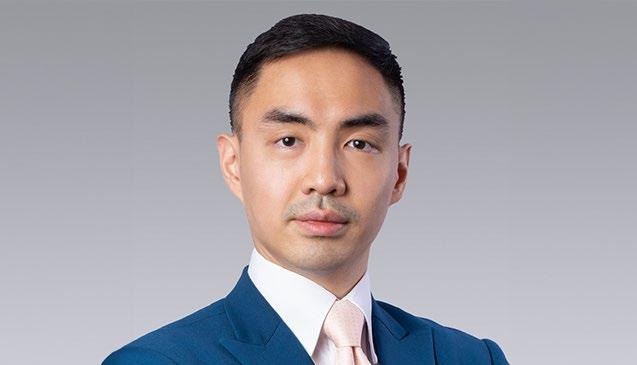
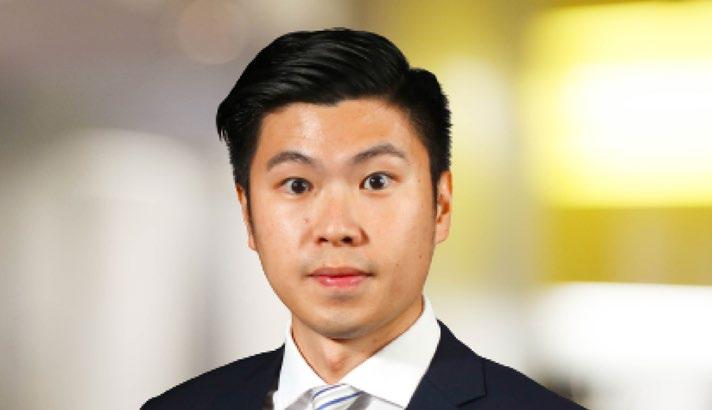
Norman Wong brings close to a decade of experience in luxury real estate. He has earned a reputation amongst UNHW individuals, finance professionals, and investors as a trusted advisor and highly effective negotiator. With these attitudes upfront, he is considered as a valuable agent not only to his clients, but for the company as well. In 2022 alone, Norman closed over US$25.5m in residential sales and was awarded as OKAY.com’s distinguished 2022 Agent of the Year. His track record and his continuous efforts paved the way for this recognition. As a luminary this year, Norman perseveres to give his best effort accompanied by his passion to give remarkable service to his customers and the company.
Frederick Lai, senior director in CBRE Capital Markets, Hong Kong, joined as a Graduate Trainee in 2012. He became one of the youngest senior directors in 2022. Over eight years, he sold worth US$1.5b of real estate across office, retail, industrial, and hotel assets. Frederick has a proven track record for diverse clients, including private equity funds, family offices, investors, and developers. Notable transactions include the record-setting US$742m-sale of flagship automobile 4S centres in 2021. He also won prestigious awards, including the Circle of Excellence for Capital Markets 2020-2021, R.I.S.E Award in 2021, and Young Achiever Award in 2019.
REAL ESTATE ASIA 37
6 Ryan Cho (CHO Chun Kit) 30, Cushman & Wakefield
7 Conrad Fong 30, Savills Hong Kong
8 Zeith Lo 31, JLL Hong Kong
9 Eugene Yip 32, Colliers
10 Norman Wong 33, OKAY.com
11 Frederick Lai 34, CBRE
REAL ESTATE LUMINARIES: HONG KONG
Alex Siu, a senior associate director at Colliers, has consistently improved, completing 25 transactions this year, surpassing his numbers in the past years. His career highlights include FedEx’s 40,000-sq ft relocation and AEON Credit’s 38,000-sq ft renewal, and his recent appointment by one of the largest financial-services companies in Japan for office projects totalling 150,000 sq ft. He also excels at landlord representation with clients like NEO, Manulife Financial Centre, and Goldin Financial Global Centre. Alex’s background in project development supports his strategic solutions for real estate portfolios, culminating in 112 deals worth US$140.2m and involving 1 million sq ft.

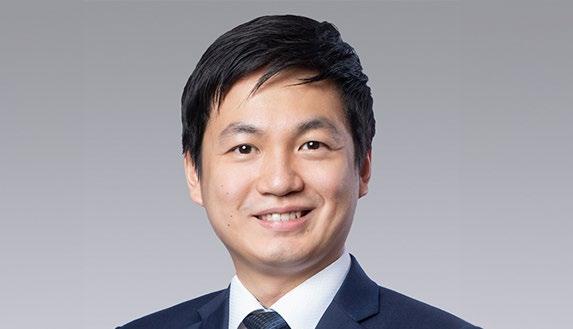
Nathan Chan was recently promoted to Associate Director at Colliers. He guided SMEs and MNCs during the pandemic in cost-saving exercises like relocations and downsizing. In his eight years at Colliers, Nathan transacted approximately 1.5 million-sq ft. Notably, in 2022, he handled a construction company’s 70,000-sq ft lease renewal, a beauty company’s 20,000-sq ft renewal, and 10,000-sq ft (for a total of 30,000 sq ft) expansion, and assisted a multinational technology company’s upgrade from an industrial building to Grade A offices. He specialises in Kowloon and South Island markets, assisting MNCs and public institutions to formulate office plans to achieve their targets.

Yan Yan’s impressive career at Savills is a testament to her passion for real estate and unwavering commitment to exceptional service. With over 4 years of experience, she specialises in overseas residential markets, particularly prime London properties. She advises high-net-worth individuals in Hong Kong and Mainland China on purchasing properties overseas. Yan’s track record includes 136-unit deals totaling US$229.5m in sales volume. Her strong work ethic, attention to detail, and client relationships contribute to her reputation as a prominent figure in the industry. Yan’s success is driven by her dedication to providing top-notch service and client satisfaction.
Thomas See is a valued member of Savills for eight years, specialising in super luxury residential single lot and en-bloc/site sales in prestigious areas. He has concluded over US$1.5b-worth of transactions, including the sale of No. 39 Shouson Hill Road for US$756m, which was the most expensive residential single lot transaction in Hong Kong’s private market. In 2017, he represented Wu’s family of Wing Lung Bank to generate over US$509.96m in sales revenue for Altamira in just one year. Thomas’s expertise and track record in the luxury residential market have earned him a reputation as a respected professional. His dedication to clients and ability to deliver results make him a valuable asset to Savills.
Ella Lai, one of Colliers’ top brokers, is a Senior Director in the Office Services department, specialising in the Kowloon market. She provides tenant advisory services to multinational corporations and publicly listed companies, formulating and implementing their real estate strategies, reviewing rent, restructuring, and negotiating leases. Her client portfolio covers a broad spectrum of sectors, like banking and finance, insurance, retail, garment & sourcing, and engineering. Ella has been at Colliers for 13 years, during which she has transacted more than 5 million sq ft in more than 300 transactions with projects valued at more than US$191m.
Maggie Ji, head of PRC Desk, Advisory
Hong Kong, has 15 years of experience specialising in office leasing and investment for PRC clients in Hong Kong and overseas. With deep knowledge of both local and mainland China markets and an extensive PRC client network, she provides comprehensive office advisory and transaction services. Maggie’s exceptional communication, negotiation, and legal expertise ensure smooth transactions, bridging cultural differences. She delivers high-quality results, gaining clients’ trust and loyalty. Prior to CBRE, she excelled as a top broker at another world’s leading office agency in Hong Kong, handling signature transactions in the Chinese PRC sector.



38 REAL ESTATE ASIA
& Transaction Services at CBRE
12 Alex Siu 34, Colliers
13 Nathan Chan 35, Colliers
14 Yan Yan 35, Savills Hong Kong
15 Thomas See 35, Savills Hong Kong
16 Ella Lai 36, Colliers
17 Maggie Ji 39, CBRE
REAL ESTATE LUMINARIES: HONG KONG
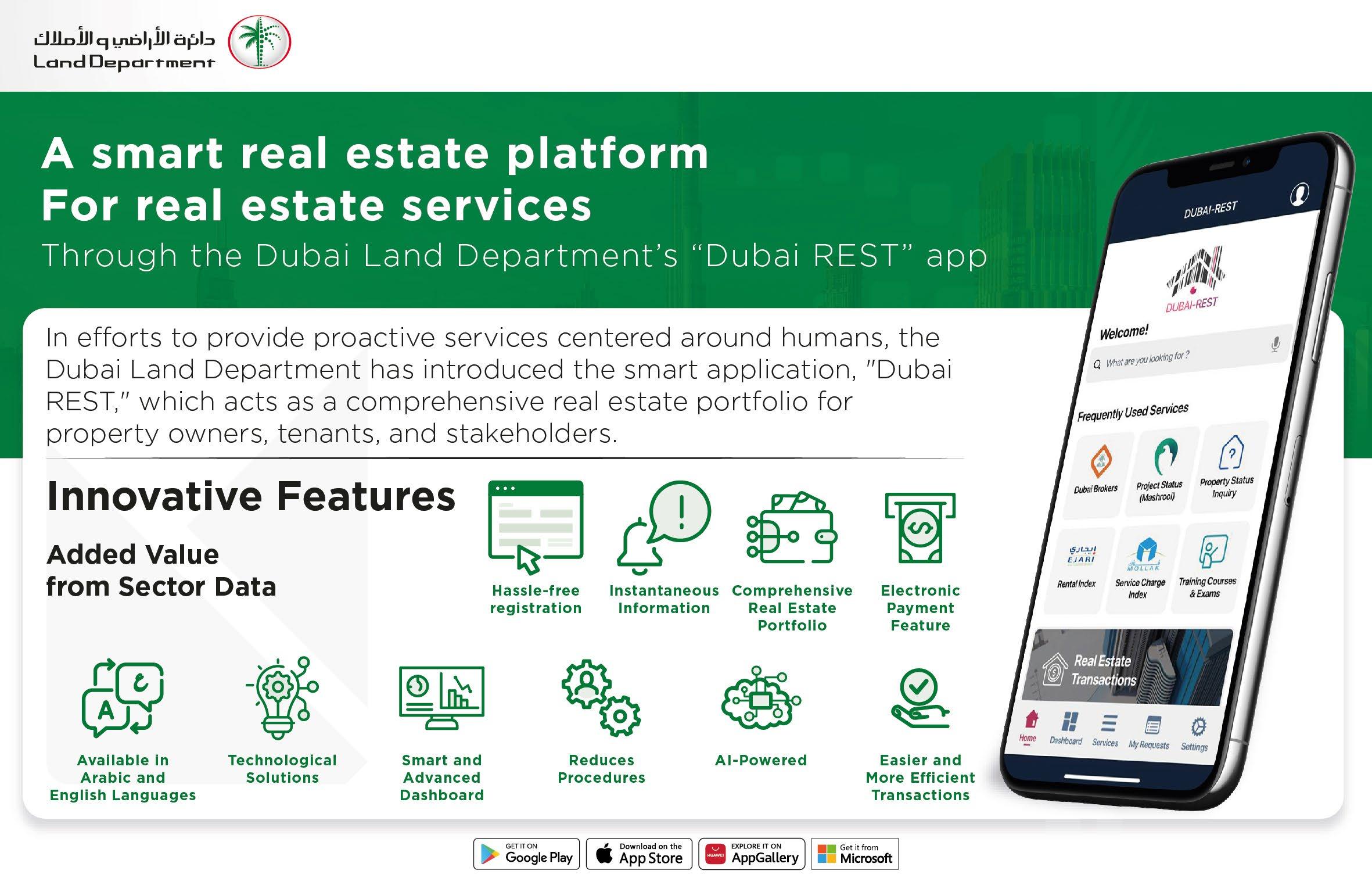

Ivan Wong, a leading Tenant Representation expert at Colliers Hong Kong, has over 15 years of experience in brokerage, project leasing, and financial analysis. Specialising in the Kowloon market, particularly Tsim Sha Tsui and Kowloon East, he has completed landmark deals, leasing about 5 million sq ft of commercial office space across 450 projects valued at over US$254.98m. His success earned him the role of Head of Kowloon, Office Services. Ivan’s leadership has led to the promotion of three rising stars to associate director grade. He also excels in transactions on Hong Kong Island, recently securing a major luxury fashion brand’s lease of a 30,000-sq ft space on a high floor.

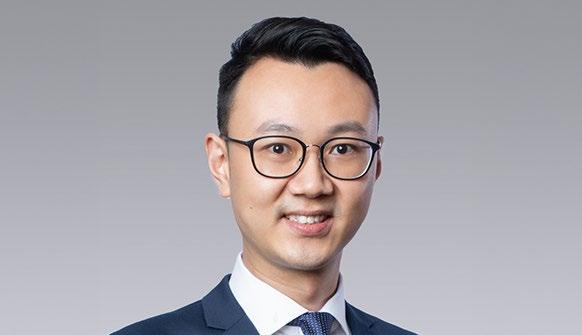
Mark Elliott is the accomplished head of International Residential at Savills Hong Kong. He joined in 2017 and quickly became a board member, a testament to his leadership and sales skills. With 17 years of solid experience across various global markets, Mark is an award-winning sales professional delivering exceptional results. He has expertise in international markets like the UK, New York City, Los Angeles, and more. Mark enjoys working with diverse clients and investors worldwide, providing straightforward advice based on his strong sales experience. Notably, in 2022, he sold 10% of a London development and the Queen’s Penthouse at another prime London development in 2023.
Gavin She is an integral part of Savills Hong Kong, with 12 years of experience and a strong track record as a director in the international residential team. He specialises in super prime UK real estate for high-net-worth individuals, offering clients a wealth of knowledge and expertise. Gavin is highly knowledgeable about global property markets like the UK, US, Canada, Australia, and Singapore. His best year saw him brokering 122 deals with a total value exceeding US$127.49m, a record in the overseas property sector. Gavin’s professionalism, integrity, and commitment to customer service have earned him respect and admiration in the industry.
18
39,
19
39, Savills Hong Kong 20
39, Savills Hong Kong
Ivan Wong
Colliers
Mark Elliott
Gavin She
Top industry players recognised at 2023 Real Estate Asia Awards
Project developments and sales operations in the real estate industry were greatly impacted by unforeseen circumstances brought about by the pandemic. Despite this, many developers managed to remain resilient whilst thriving amidst the challenging times.
In recognition of the most innovative players and developments in the industry, the Real Estate Asia Awards proudly introduced the winners to its 2023 edition through an awards dinner held on 15 June 2023 at Marina Bay Sands Expo & Convention Centre in Singapore. The awards programme aims to recognise the most innovative real estate developments and laud industry players in Asia Pacific that stand out in the market.
“In every crisis, winners typically will use this opportunity to pivot their business or take larger bets as opportunities and risk typically
emerge around this time. Winners of such cycles typically make outsize gains and grow their portfolio especially when the market is volatile. As such, we look at the players that have been able to ride through the cycles – in the end, it would be those that use their balance sheet to acquire opportunistically,” said Seng-Leong Teh, Global Real Estate Hospitality & Construction M&A Leader at Ernst & Young, one of the judges of this year’s programme.
Joining him as part of the esteemed panel of judges is Tay Hong Beng, Partner and Head of Real Estate at KPMG in Singapore; Michael Velten, Southeast Asia Investment Management and Real Estate Sector Leader at Deloitte; Benjamin Tay, Deputy Head, Corporate Real Estate at Rajah & Tann Singapore LLP; and Paul Walters, Asia-Pacific Real Estate Assurance Leader at PwC.
Real EstateAsia congratulates the following winners:
Al Mouj Muscat
Luxury Residential Development of the Year - Oman
Al-Tahaluf Real Estate
Affordable Housing Developer of the Year - Saudi Arabia
Alawaly Real Estate Co.
Developer of the Year - Saudi Arabia

Residential Development of the Year - Saudi Arabia
Ally Logistic Property (Malaysia)
Technology Hub Development of the Year - Malaysia
Asterra
Affordable Condominium Developer of the Year - Philippines
Sustainable Mid Rise Condominium Development of the Year - Philippines
Ayala Land - Amaia
Affordable Housing Developer of the Year - Philippines
Residential Development of the Year - Philippines
Chinachem
Cultural Heritage Conservation Initiative of the Year
Dar Global Design Initiative of the Year - United Arab Emirates
Dubai Land Department
Customer Service Innovation of the Year - United Arab Emirates
Flamingo Holdings
Residential Development of the Year - Vietnam
Henderson Land Development Company Limited
Developer of the Year - Hong Kong
Residential Development of the Year - Hong Kong
Mixed-Use Development of the Year - Hong Kong
Landco Pacific Corporation
Resort Estate Project of the Year - Philippines
LOGOS Metrolink Logistics Hub
Industrial Development of the Year - Indonesia
Msheireb Properties
Mixed-Use Development of the Year - Qatar
Nan Fung Group
Sustainable Development of the Year - Hong Kong
Nexus Real Estate Corporation
Sustainable Development of the Year - Philippines
Nichada Group of Companies
Luxury Residential Development of the Year - Thailand
Developer of the Year - Thailand
PHirst Park Homes Inc.
Mid-sized Developer of the Year - Philippines
PT Perintis Triniti Properti
Developer of the Year - Indonesia
Pueblo de Oro Development Corporation
Mixed-Use Development of the Year - Philippines
Pueblo de Panay, Inc.
Masterplan Development of the Year - Philippines
Sino Group
ESG Initiative of the Year - Hong Kong
Sobha Realty
Luxury Residential Development of the Year - United Arab Emirates
Developer of the Year - United Arab Emirates
Staytion Spaces
Flexible Workspace Initiative of the Year - Singapore
Union Developers Pvt. Ltd
Residential Development of the Year - Pakistan
Vista Land & Lifescapes, Inc.
Marketing & Brand Initiative of the Year - Philippines
Integrated Property Developer of the Year - Philippines
Nichada Changrew, Nichada Group of Companies
CEO of the Year
40 REAL ESTATE ASIA EVENT: REAL ESTATE ASIA AWARDS 2023

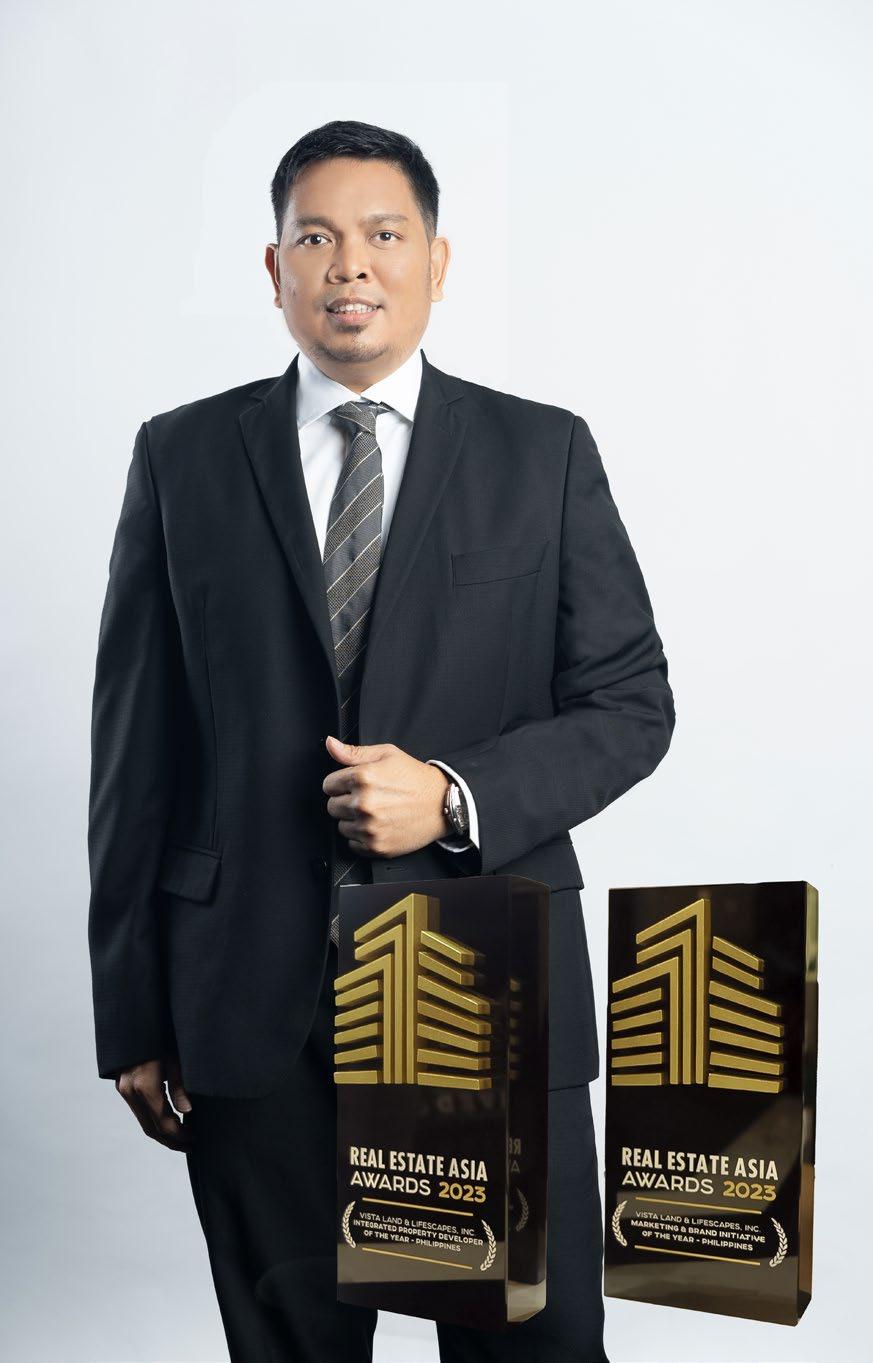




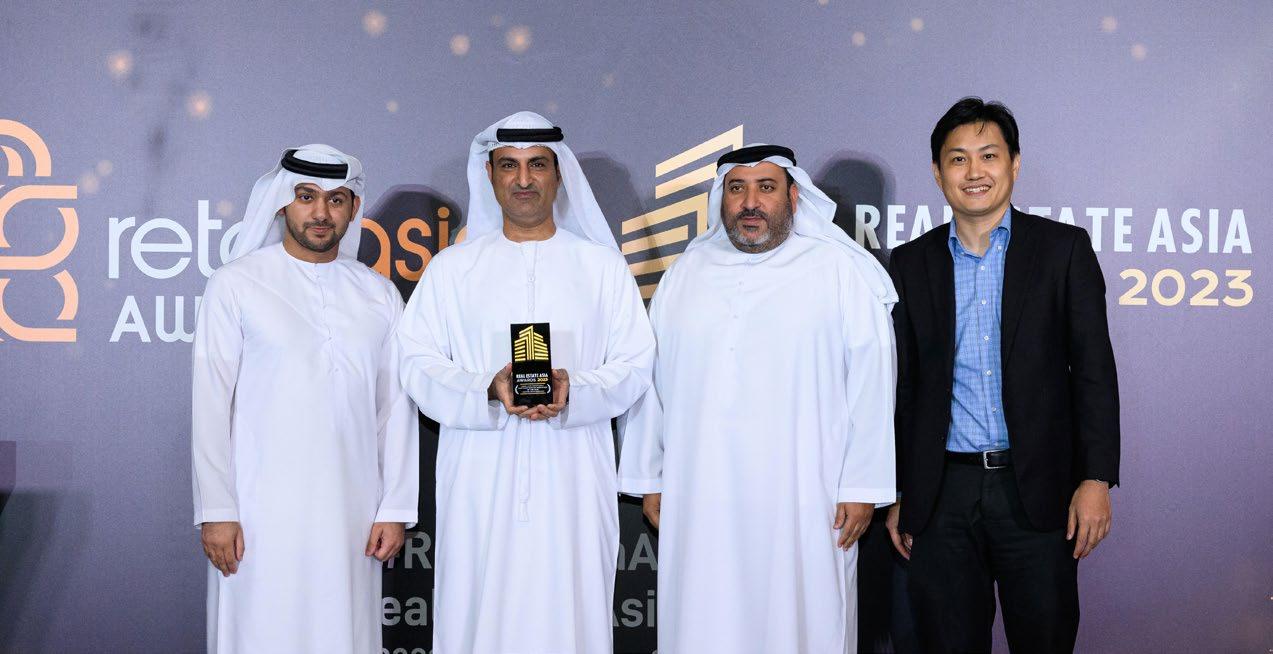
REAL ESTATE ASIA 41 REAL ES TATE ASIA AWARDS 2023
Vista Land & Lifescapes, Inc.
Al Mouj Muscat
Dubai Land Department
Chinachem
Flamingo Holdings
Henderson Land Development Company Limited
EVENT: REAL ESTATE ASIA AWARDS 2023
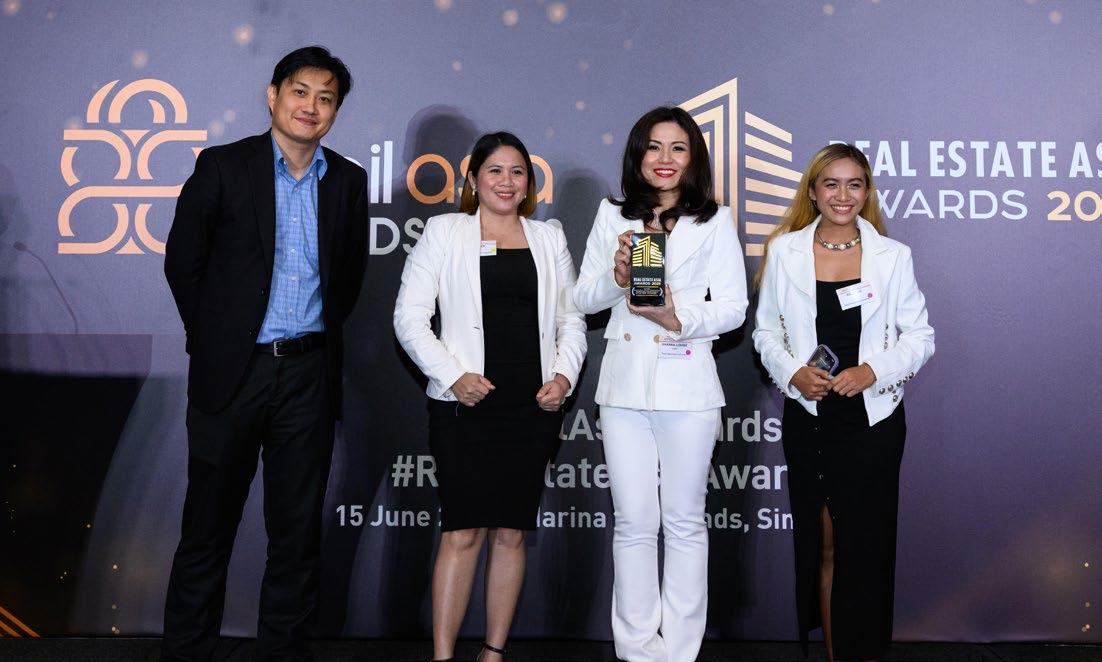

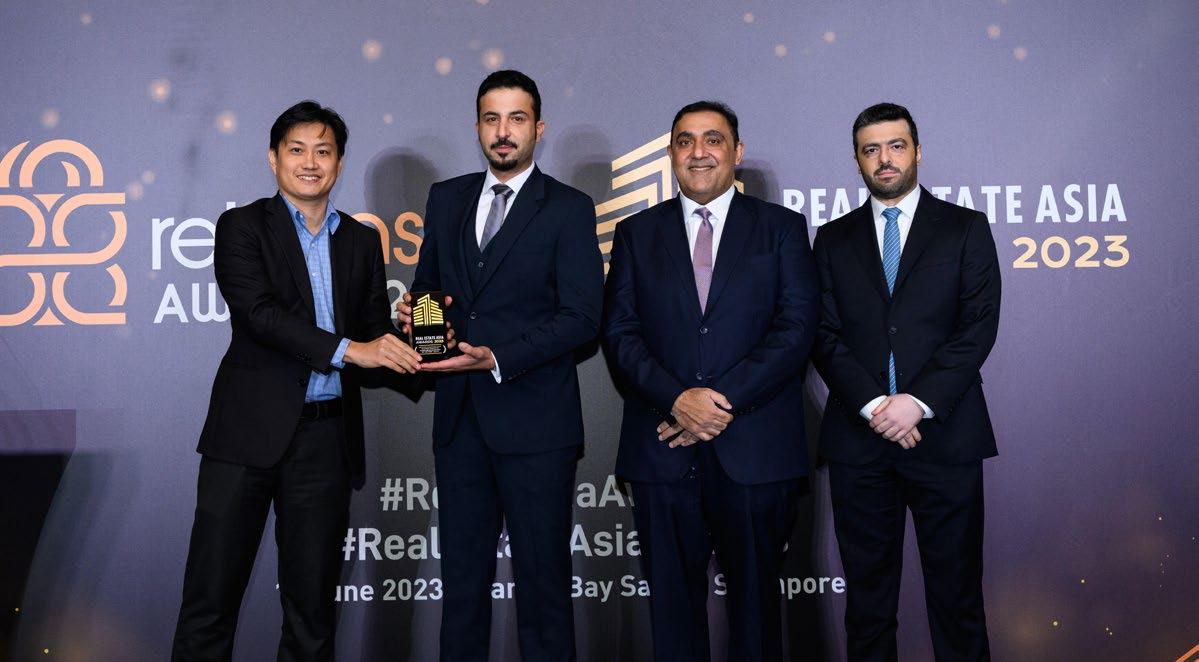


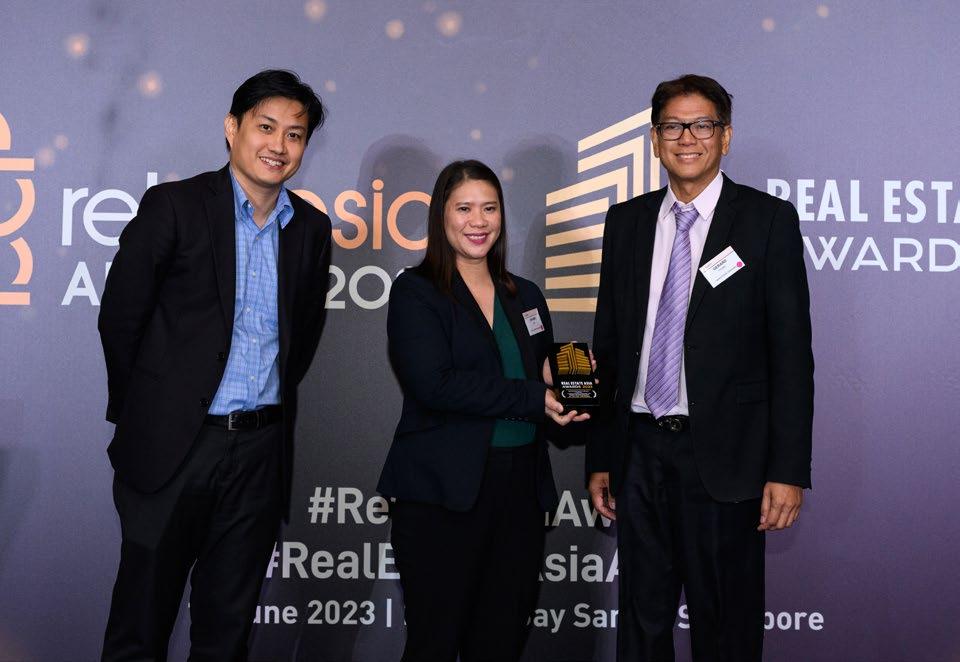

42 REAL ESTATE ASIA
Landco Pacific Corporation
Msheireb Properties
LOGOS Metrolink Logistics Hub
Nexus Real Estate Corporation
PHirst Park Homes Inc.
Nichada Group of Companies

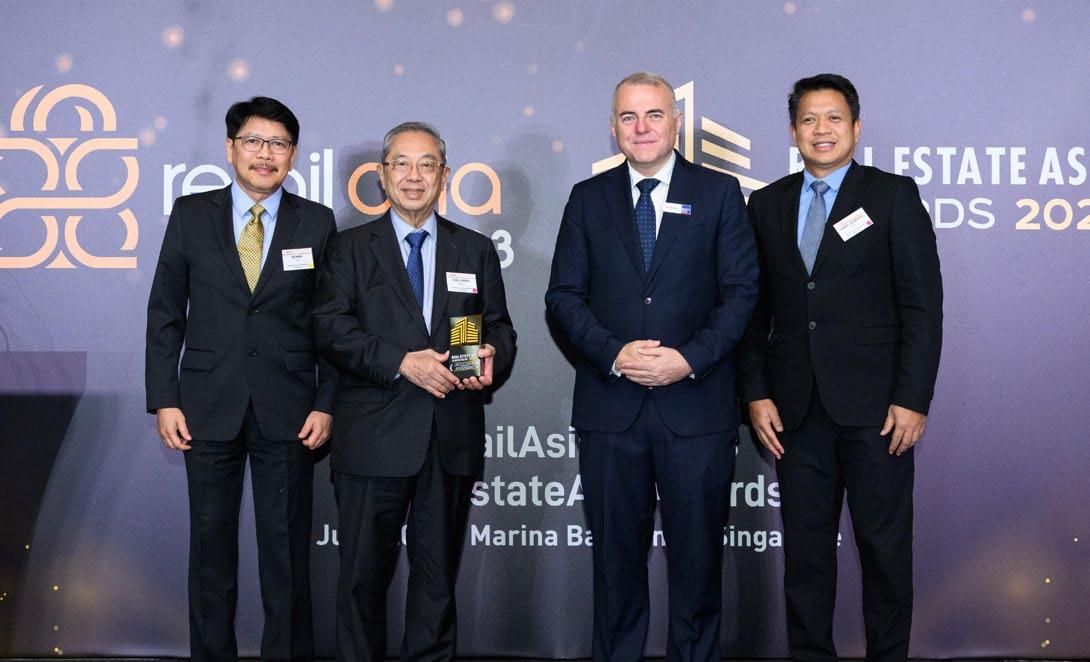


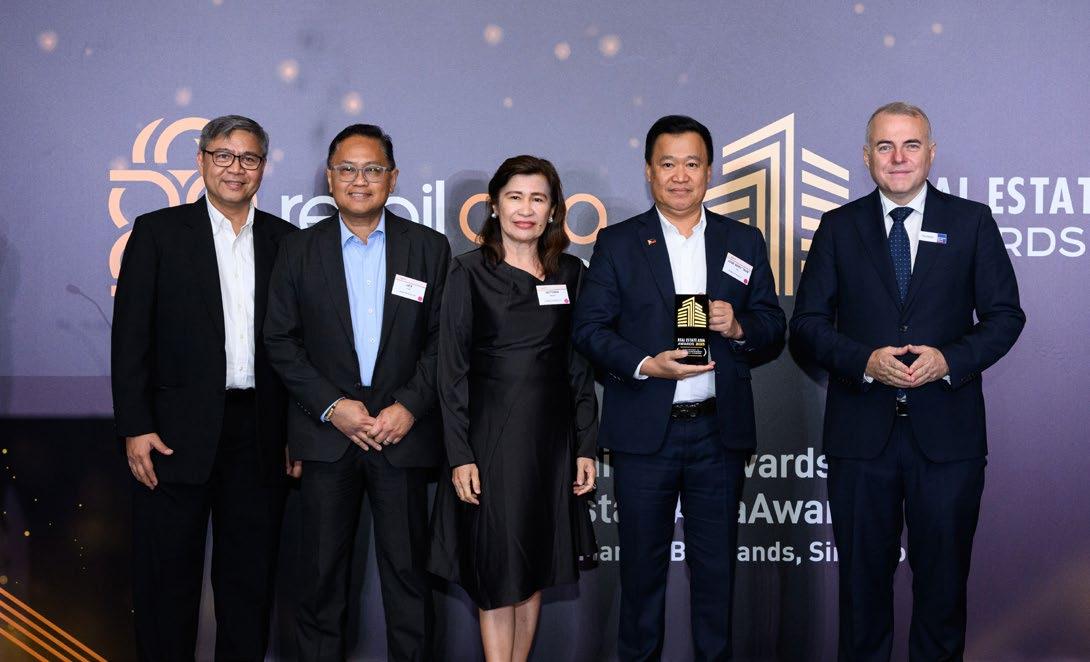

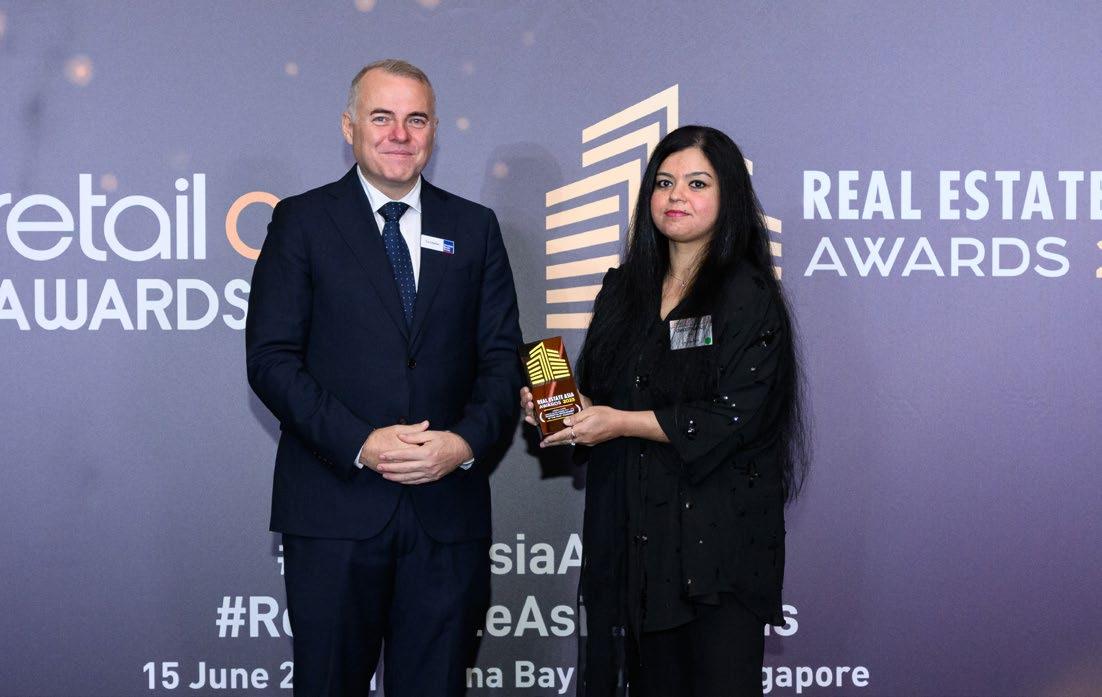
REAL ESTATE ASIA 43 REAL ES TATE ASIA AWARDS 2023
Pueblo de Oro Development Corporation
Pueblo de Panay, Inc.
Sobha Realty
Sino Group
Union Developers Pvt. Ltd
Staytion Spaces
Nan Fung Group takes home win at Real Estate Asia Awards


Its mixed-use commercial development aims to create a sustainable space.
Nan Fung Group brought home the Sustainable Development of the Year - Hong Kong category win at the recently held Real Estate Asia Awards for the success of its flagship mixed-use commercial development AIRSIDE.
Located at the centre of Hong Kong’s new central business district at Kai Tak, AIRSIDE consists of 32-storeys of Grade A office space, which occupies around 400,000 sqft. The multi-use complex also comes with a
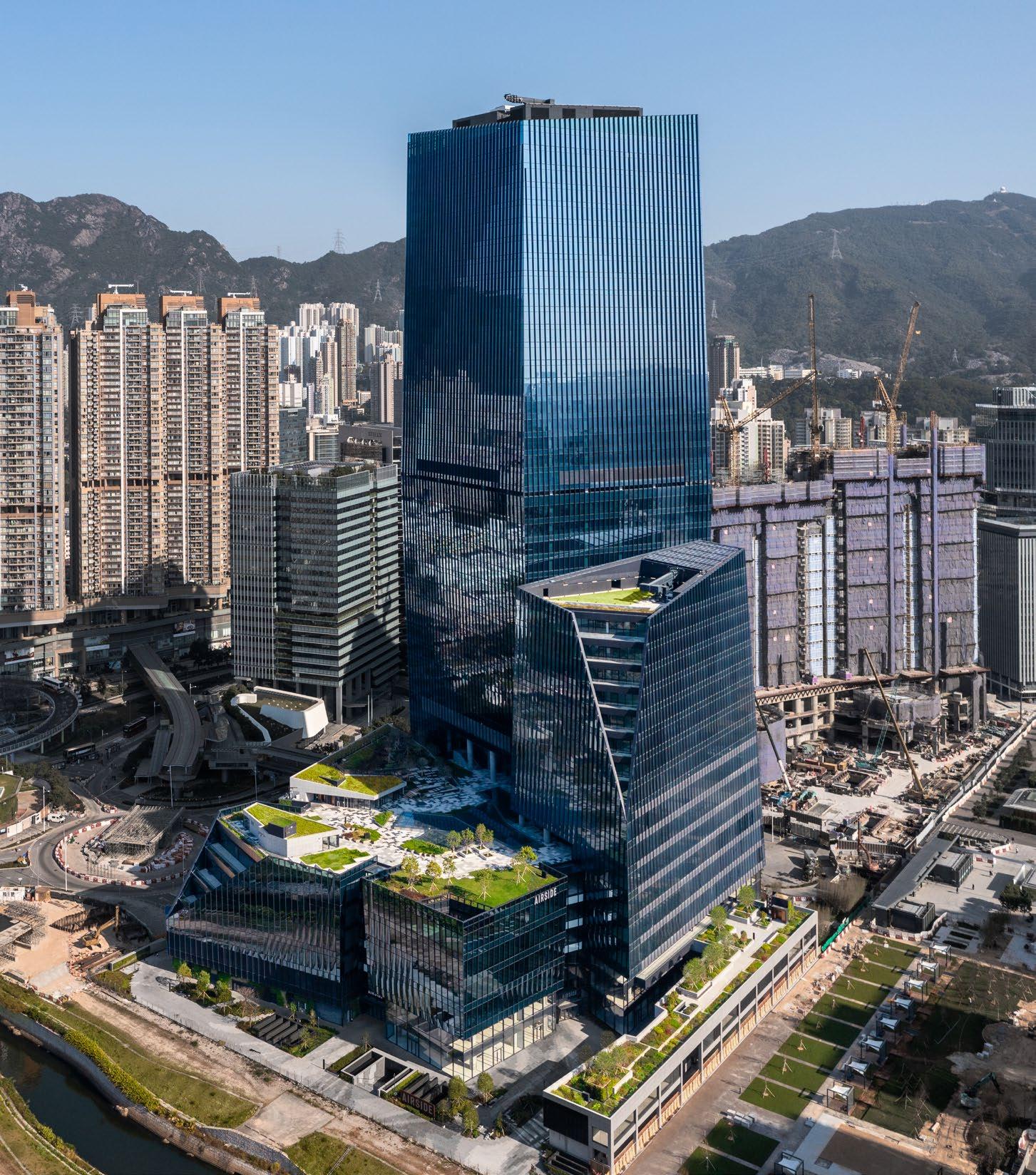
700,000 sqft. mall to offer visitors a brandnew one-stop shopping experience.
AIRSIDE has adopted the United Nations Sustainable Development Goals (UNSDGs) as the design blueprint to facilitate a green, lowcarbon lifestyle. It is the first building in Hong Kong to receive seven of the most recognised green building certifications.
A number of innovative facilities which meet international standards are introduced,including Hong Kong’s first-ever
Automatic Refuse Collection System, which offers real-time data to aid waste reduction in day-to-day operations, a valuable feature to proactively facilitate tenants in the upcoming implementation of the waste charging scheme.
Leading the Way in Energy Efficiency and Carbon Reduction

AIRSIDE is the first commercial development to adopt the Hong Kong Electrical & Mechanical Services Department’s Kai Tak District Cooling System (DCS) in the territory, which saves around 839,300 kilowatts of electricity and offsets 587 tonnes of carbon emissions annually.
This creates ample space on the roof to allow for the installation of Hong Kong’s largest office building monocrystalline PV farm and walkable PV, generating 270,000 kWh/year, comparable to the electricity consumption of around 700 residential flats in Hong Kong per month. These implementations together offset a total of 776 tonnes of carbon emissions, which is tantamount to the planting of 12,800 trees.
Revolutionising Urban Mobility and Sustainable Living
To encourage green mobility, AIRSIDE is introducing Hong Kong’s first-ever smart bicycle parking system, equipped with 48 parking spaces. All of AIRSIDE’s 850 car parking spaces are equipped with electric vehicle (EV) charging facilities.
Building on Nan Fung’s ongoing efforts and commitment to sustainability, AIRSIDE introduces the unique and innovative urban lifestyle concept of “wholeness” that connects people and nature to build a sustainable, low-carbon society.
As part of the wholeness lifestyle concept, AIRSIDE houses a 4,000 sqft. urban farm that is home to over 50 varieties of produce, which is supplied to F&B outlets at the mall to offer a true farm-to-table experience for visitors; the remaining produce will be shared with the community. With the urban farm, we hope to promote a low-carbon footprint lifestyle and nature-based solutions to the public.
Real Estate Asia Awards honours the most innovative real estate developments and laud industry players in Asia Pacific that stand out in the market.





44 REAL ESTATE ASIA
AIRSIDE introduces the unique and innovative urban lifestyle concept of “wholeness” that connects people and nature to build a sustainable, low-carbon society
SUSTAINABLE DEVELOPMENT OF THE YEAR - HONG KONG
AIRSIDE’s multi-use complex in Hong Kong



C M Y CM MY CY CMY K
JOHN HOWALD OPINION
Navigating the reset of Asia Pacific’s real estate industry: A return to stability
JOHN HOWALD Executive Director Head of International Capital Colliers
Real estate is by no means immune to the volatility impacting capital markets. The current macro environment offers no shortage of reasons for investors to hesitate in pursuing opportunities. Many are confining capital to the sidelines, awaiting more clarity and for relative stability to return.
The good news is that a recalibration is underway. Our 2023 Global Investor Outlook Report found the global real estate market will start to stabilise by mid-2023 as more certainty emerges around the interest rate outlook. Investors must view recent trends not so much as a downturn, but as a return to relative rationality.

This is especially good news for Asia Pacific investors as they are more highly attuned to some advantages across asset classes, compared other major markets around the world. So in a time where extreme caution is being exercised, guidance is gold. There are five main themes – specific to Asia Pacific – that investors must take note of.
Asia Pacific’s relative dynamism and diversity
From a global perspective, the Asia Pacific region’s relative optimism on growth stands out. The region is incredibly diverse in terms of the scale of its markets, pace of development, and even the direction of monetary policy.
There are several key forces accelerating across Asia Pacific. The most eminent is the flight to quality in the office sector. Companies are driving this trend by providing high-quality office environments to attract and retain employees, which also aligns with a growing emphasis on sustainability ratings.
Retail is also benefiting from this trend. Regional investors are showing a clear uptick in their intention to invest in CBD retail, in comparison to those in EMEA and the U.S.
Investors set to increase exposure across the region
Asia Pacific is expected to outperform all other markets in 2023 as a haven for property investments. There are significant headwinds in Europe and the U.S. with real risks of recession. As the debt markets stabilise and volatility fades, private equity is also expected to ramp up M&A activities this year.
Most of the western world pension funds or insurance capital and other sovereign wealth funds, are generally underweight in their exposure to the Asian markets. They’re now becoming more aware of that, as they may be over-allocated to their local markets which are going to be potentially the most impacted by interest rate trends. A lot of European or North American funds will try hard to gain exposure to the Asian markets and allocate large amounts of capital here.
A spotlight on Japan, Australia, Singapore, and Korea
These markets are where transaction volumes remain healthy and investor appetite is strong.
In Japan, the demand for office space in cities including Tokyo is recovering even as some occupiers downsize with increased remote working. Rising e-commerce and supply chain reformation, and enduser demand for modern warehouses remains high, likely to continue beyond 2023. The hospitality sector is also active, in anticipation of occupancy levels soon reverting to pre-pandemic levels.
Australia is set to experience a shift in the flight to quality from being a trend to being a key driver for evolution in the retail and office sector, while the industrial sector will seek to leverage rents to safeguard capital values.
In Singapore, the search for high-quality and inflation-proof assets will intensify as the market braces for additional challenges, such as higher operating costs stemming from rising interest rates.
In Korea, data centres are becoming an independent asset class, in turn creating a burgeoning investment sector. Investors can expect stable operating income supported by increasing demand. Data centre dynamics also support long-term stable income as average lease terms are 10-20 years and lessees are highly likely to renew contracts due to the huge initial set-up costs and costs associated with relocation.
Diversity of opportunities across sectors
Office and industrial and logistics (I&L) sectors are the frontrunners when it comes to investor choice, followed by multifamily, which now notably outpaces retail and hotels.
In alternatives, investors are keen not just in data centres, but also life sciences and senior housing. This could be evidence of rising awareness and/or desire for assets with a strong connection to fundamental trends in a generally tough environment.
Alternative asset classes supported by strong population growth and demographic fundamentals currently offer a unique investment proposition that provides exposure to growth industries. They also support portfolio diversification and lower risk asset assets offering a long-term cash flow with reduced levels of rental downtime.
Action on environmental performance to increase
Investors are placing a big emphasis on environmental, social and governance (ESG) criteria and ratings in response to occupier demands and to balance out asset operational costs longer-term. It’s also known that ESG-compliant assets will command a premium in the future.
More Asia Pacific investors are expected to complete full asset assessments in terms of their energy efficiency and performance this year or integrate new ESG performance benchmarks. Non-compliant assets will increasingly be confined to discounted territory and targeted for redevelopment or disposal.
Heading into 2023, Asia Pacific will be a relative winner in the rebalancing of real estate values and overall return to relative rationality, as there still are investment opportunities within the context of today’s economic environment.
46 REAL ESTATE ASIA
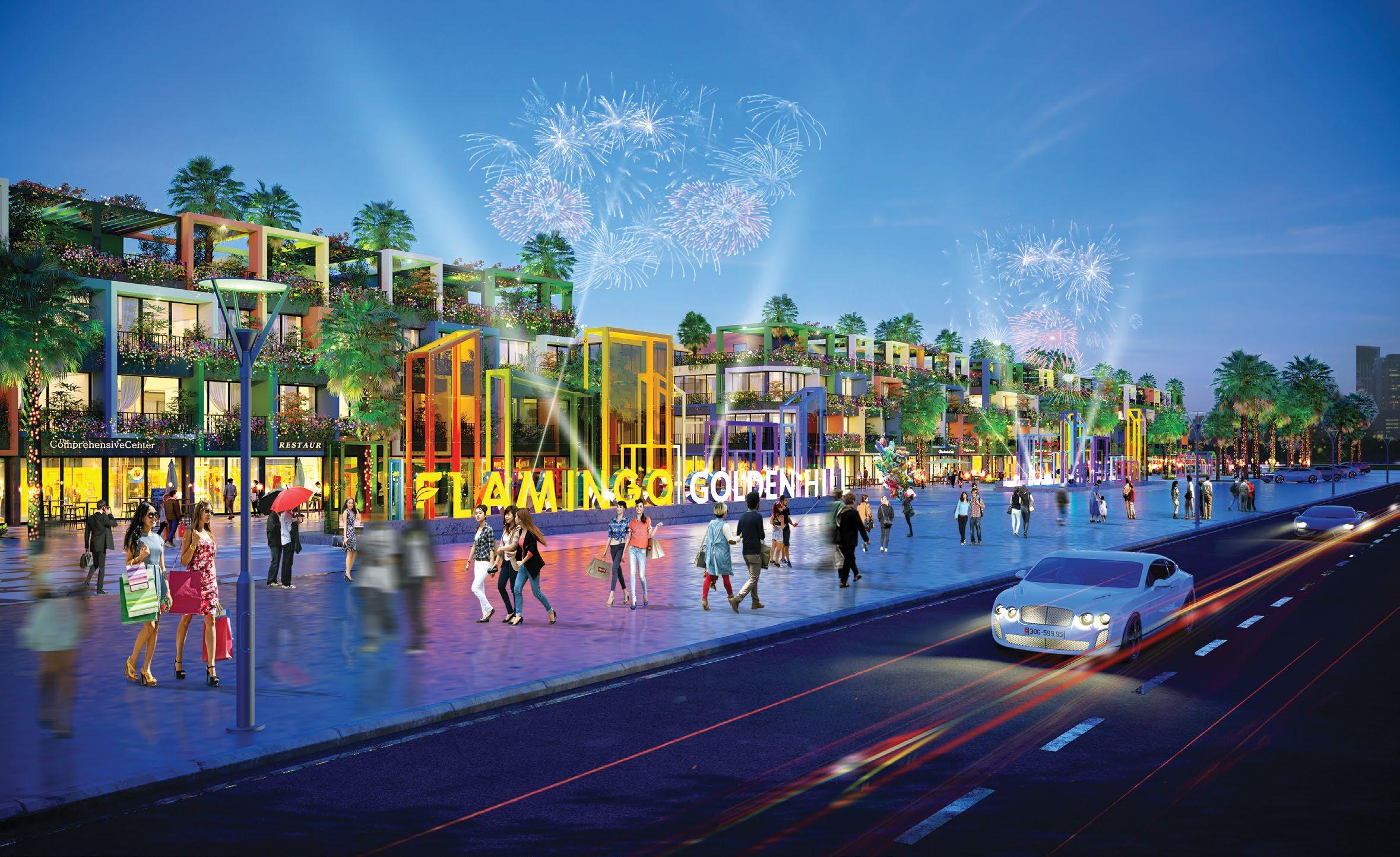



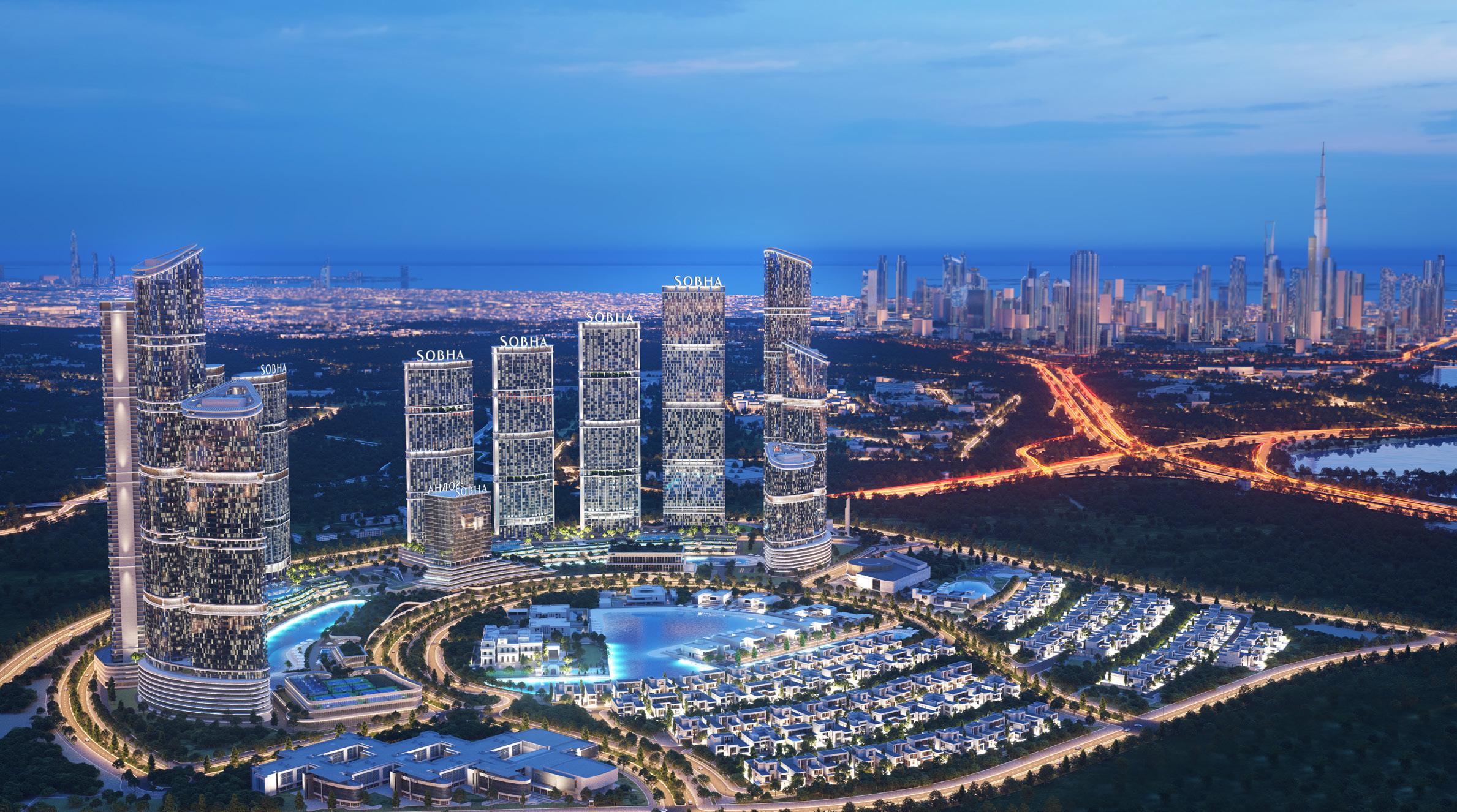
REAL ESTATE ASIA 47
800SOBHA
Epitome of luxury waterfront living
ANLEY, VASAN OPINION
Property developers must implement anti-money laundering measures now
Singapore’s real estate sector will soon see a tightening of its customer and transaction due diligence requirements. From 28 June 2023, property developers will need to implement enhanced measures to prevent money laundering and terrorism financing. This will include the requirement to conduct customer due diligence (CDD) checks on new and existing property purchasers.
These requirements will be regulated under the Housing Developers (Control & Licensing) Act and Sale of Commercial Properties Act. These new rules have been put in place by the Urban Redevelopment Authority (URA) to tackle the risk of money laundering and terrorism financing in the real estate sector.
It will be mandatory for developers to conduct due diligence checks on purchasers, notify purchasers (in the prescribed form) of the documents and information that developers must obtain, and keep proper records of these checks. If they suspect any money laundering or terrorism financing activity, developers will need to submit a report to the Suspicious Transaction Reporting Office of the Commercial Affairs Department.
URA has stated that developers must consider various factors, such as whether the purchaser is from a country that is subject to increased monitoring, and screen them against lists in the Terrorism (Suppression of Financing) Act and the United Nations Act. In addition, developers can also screen purchasers against other sources of information, such as public websites or third-party screening databases.
The several possible red flags that can indicate a suspicious transaction, can be categorised into two.
First category is checking the purchaser’s profile and behaviour. Under this category are the following: the use of a nominee to purchase the building, a lack of economic purpose behind the purchase, misalignment between the type of property being purchased and the economic activity of the buyer, use of front companies, shell companies or complex structures to mask the true beneficial owner, source of funds, and source of income and source of wealth are not in line with the background and profile of the purchaser.
Second category is analysing the transactional patterns. Under this category include the following: purchase was made with a significant amount of cash or with the use of complex financial instruments, payments were made from high-risk jurisdictions without any clear links to the purchaser, and the transaction price is much higher or much lower than the property market value.
Challenges faced by developers
The new requirements may pose challenges to developers as they formulate strategies and frameworks to ensure that the checks they conduct are sound. For instance, developers may not have
MARC ANLEY Forensic Leader Southeast Asia Deloitte
KALYANI VASAN Financial Crime Compliance Leader Southeast Asia Deloitte

implemented screening systems yet. They may also face a shortage of trained personnel with sufficient knowledge to conduct screening or CDD, or to review screening hits. In addition, purchasing property to disguise the funds from illegal or criminal activities generally happens in the third (and final) stage of money laundering.
Therefore, there will be some distance created between the original illegal proceeds and the eventual purchase, which will make it difficult for developers to draw links to money laundering. Developers may also be subject to conflicts of interest, as property agents may focus on the rewards of a successful transaction instead of the risks posed by potential buyers and disregard the screening hits.
A multi-pronged approach to overcome these challenges
There are several actions that property developers should consider taking. Firstly, comprehensive and up to date policies and procedures to address financial crime should be implemented. A risk management framework should also be developed to enable developers to identify risks and introduce the required controls to manage them. The appointment of a screening vendor to aid in the detection of illicit activities should also be considered.
In addition, training sessions should be conducted to ensure that staff understand the new requirements and how to implement them. Finally, developers should examine the need to commission an independent audit of their existing financial crime framework, with recommendations provided on how to strengthen them.
A proactive approach is key
With the date of implementation of the new requirements fast approaching, property developers ought to be proactive in establishing a robust framework rather than take a reactive approach, given the strong impact enforcement can have on the business both financially and reputationally. A developer’s license to operate can be revoked in serious cases of non-compliance.
The global anti-money laundering watchdog, the Financial Action Task Force (FATF), had previously cited deficiencies in Singapore’s due diligence requirements applicable to real estate, and the fact that recordkeeping obligations for real estate were not provided by law. Hence, it was made a priority to improve its requirements, with numerous regulations and circulars being introduced since 2018.
With another FATF evaluation due for Singapore, the real estate sector should expect additional scrutiny and potential enforcement in these aspects. It is therefore of utmost importance that businesses operating in this sector understand their anti-money laundering obligations and update their internal control frameworks to reflect them. In addition, it would serve them well to implement these changes sooner rather than later.
48 REAL ESTATE ASIA





























 No ‘one size fits all’ in hybrid workspaces
Tradition meets modernity in futureproofing hybrid offices
Sinar Mas Land focuses the spotlight on BSD City
What is LVC scheme and why is it key to IND urban development problems
Closing gaps between C-suites and workers with flexible workspaces
COMMERCIAL OFFICE
COMMERCIAL RETAIL
PROPERTY WATCH
PROPERTY WATCH
RESIDENTIAL
No ‘one size fits all’ in hybrid workspaces
Tradition meets modernity in futureproofing hybrid offices
Sinar Mas Land focuses the spotlight on BSD City
What is LVC scheme and why is it key to IND urban development problems
Closing gaps between C-suites and workers with flexible workspaces
COMMERCIAL OFFICE
COMMERCIAL RETAIL
PROPERTY WATCH
PROPERTY WATCH
RESIDENTIAL




















 There is also muted-coloured rented bed and closets for married couples
The stylish furnishings evolve the study experience in the dedicated study room
Here is another design of bedroom space at STAS
Some units have pools and a terrace to add a leisure environment for families
There is also muted-coloured rented bed and closets for married couples
The stylish furnishings evolve the study experience in the dedicated study room
Here is another design of bedroom space at STAS
Some units have pools and a terrace to add a leisure environment for families






 AnyMind’s new headquarters in Kwun Tong have no walls between departments
AnyMind conducts team-building activities in the office such as “happy hour” and “TGIFridays” to increase the job satisfaction of their employees
Its "collaboration area" has a greenfield look and bean bag chairs for relaxation and informal work
AnyMind’s new headquarters in Kwun Tong have no walls between departments
AnyMind conducts team-building activities in the office such as “happy hour” and “TGIFridays” to increase the job satisfaction of their employees
Its "collaboration area" has a greenfield look and bean bag chairs for relaxation and informal work






























































 18 Henry Chia 39, Colliers
19 Ben Xia 39, Huttons Asia
20 Donald Lin 39, Orange Tee
18 Henry Chia 39, Colliers
19 Ben Xia 39, Huttons Asia
20 Donald Lin 39, Orange Tee




























































